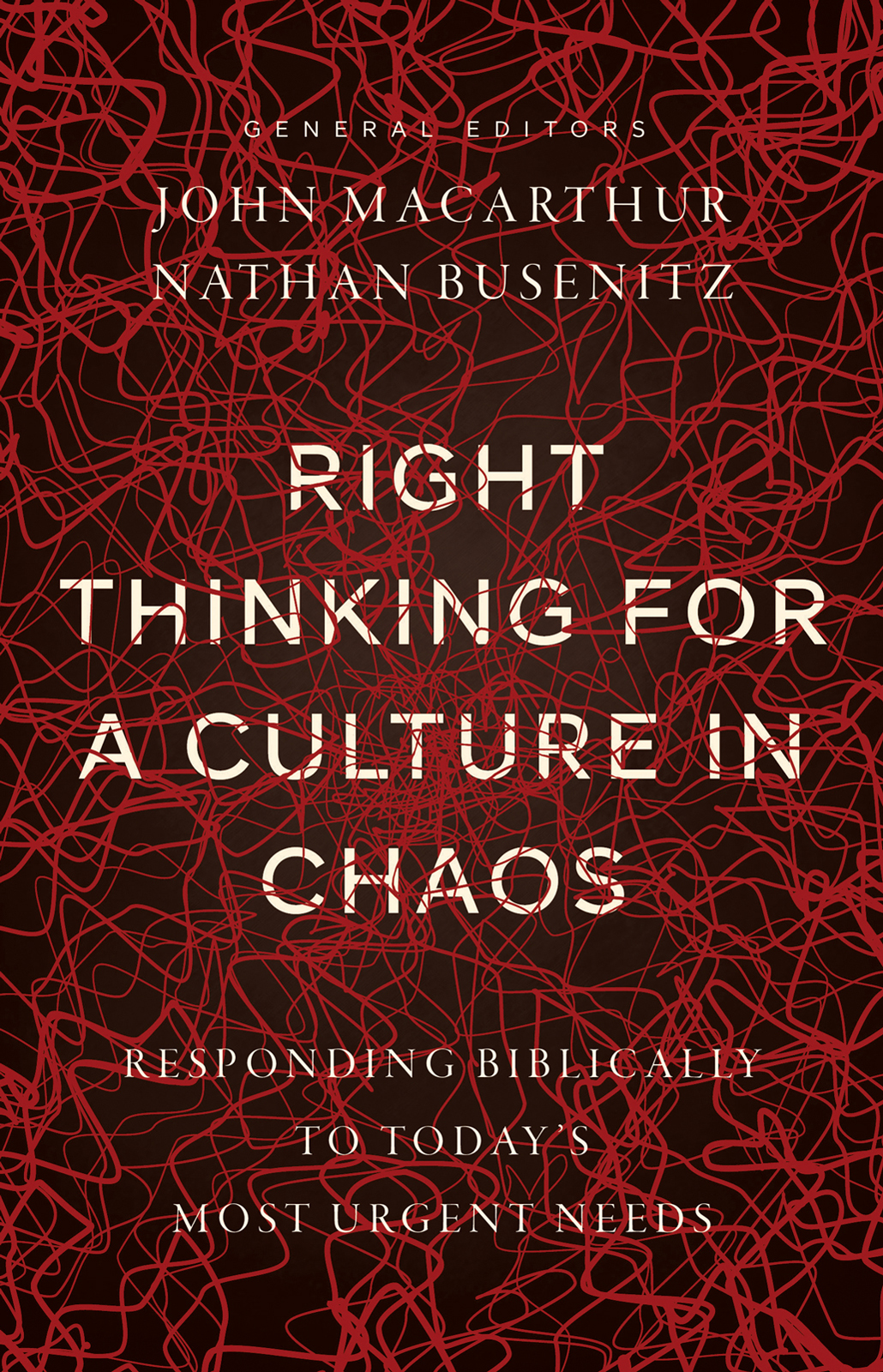
Sign Up for Updates
Connect
TOPICS
- Latest Blog
- Fiction
- Inspirational/Devotional
- Men's Christian Living
- Prophecy
- Women's Christian Living
- View All
ARCHIVES
The 12 Priorities Every Man Should Live, Teach, and Expect
Posted on Apr 18, 2024 Topic : Inspirational/Devotional, Men's Christian Living
Posted by : Mark Henry

The Man Code
Be on the alert, stand firm in the faith, act like men, be strong. —1 Corinthians 16:13 (NASB1995)
I was desperate. I had never walked this path. She looked at me with those brown eyes and long brown hair; I knew I had one shot at getting this right. Leaning across the table from my daughter, I said, “Missy, it’s time we talk about your future husband and the kind of wife you are going to need to be to honor God and love your husband. We need to talk about how you will raise your children.”
The Failure of Codeless Living
At this moment, I realized I had been too vague with my daughter and my sons about the traits of a good man. I was failing them by not having a clear and repeatable axiom or code of what God expected of a man, what the church should expect of a man, and what society should expect of a man. I needed two things: a leadership example and clarity.
The Example of Leadership and a Clear Code
It was May 12, 1962, and the Cadet Mess Hall at West Point’s United States Military Academy was filled with hundreds of cadets in dress uniforms watching General MacArthur take the podium.
“Duty. Honor. Country. Those three hallowed words reverently dictate what you ought to be, what you can be and what you will be. They are your rallying points. To build courage. When courage seems to fail. To regain faith. When there seems to be little cause for faith. To create hope. When hope becomes forlorn...”
While this speech is a masterpiece of American rhetoric, it was more than that. It became the motto of West Point and by practice the U.S. Army. This axiom, Duty, Honor, Country, has guided the Officer Corps for more than 60 years and is the code by which America judges officers. MacArthur led, and he led with clarity.
The Man Code Was Born
Paul says this in 1 Corinthians 16:13 (NASB1995), “Be on the alert, stand firm in the faith, act like men, be strong.” It’s a powerful axiom—“act like men.” Since that time, one question haunts me, how do real men act? The code needs to be Biblical, transformational and transferable.
The Man Code: Live It, Teach It, Expect It
Men don’t live one-dimensionally. The Man Code is holistic—it involves the whole man. After spending years reflecting,12 priorities standout. Real Men:
- Pursue biblical success
- Possess focused ambition
- Assume responsibility
- Exhibit godly character
- Demonstrate consideration
- Protect others
- Work with diligence
- Respect authority
- Honor their wives
- Train their children
- Do not abandon their families
- Love the gospel and the Church
Every man needs a code to live by, but equally important, every woman, man and society needs a code by which to measure men. The Man Code—Live It, Teach It, Expect It.

Read more in The Man Code by Mark Henry
0 Comments Leave a Comment »
Embracing the Holy Spirit’s Names for Deeper Connection
Posted on Apr 16, 2024 Topic : Inspirational/Devotional, Men's Christian Living, Women's Christian Living
Posted by : Tony Evans

The power of the Holy Spirit is available to each of us, and yet He’s often the most overlooked and underutilized Person of the Trinity. The Holy Spirit was sent to minister to us, convict us, teach us, give us insight into God’s depth, enable us to live a life of love and joy, and much more. We can come to know all the ways He’s available to us as we pray to God concerning the various roles He intends for the Holy Spirit to manifest in us and through us.
To get to know His names more deeply is to better understand how the Holy Spirit has been sent to work in your life. Praying through the different names of the Holy Spirit introduces you to aspects of the His role and allows you to gain greater wisdom into His attributes and purposes. He works within believers’ lives in a number of unique ways, but sometimes we forget them.Praying through His names reminds you to call on the Holy Spirit and look to Him to help you in times of need. When you draw closer to the Holy Spirit, you come to know Him in a broader way.
Each name or attribute sheds light on who the Holy Spirit is, how He can relate to you, and how He can bless you. As you pray prayers that reflect these qualities of the Holy Spirit, you become more familiar with how He can bring you peace, hope, restraint, and so many of the Christian kingdom virtues.
To help you know how to pray along the lines of the Holy Spirit’s many names and roles, you’ll find four prayers—of Adoration, Confession, Thanksgiving, and Supplication—related to each name or role included in Praying Through the Names of the Holy Spirit (see example prayer below). This prayer acronym (ACTS) isn’t a magic formula. Rather, it’s a structure wherein our prayers can cover four important aspects of communication with the Lord.
Prayer is heavenly permission for earthly interference. Prayer is communication with God. God longs to be involved with you on a very personal level, and prayer opens the door for this to happen. And I encourage you to pray these prayers so you can come to know the Holy Spirit in a fresh and engaging way.
The Holy Spirit is a gift from God sent to enable you to live out the kingdom life. In Him, you can find comfort, help, wisdom, contentment, insight, and so much more. Knowing and praying through the Holy Spirit’s names may also bring stability in many areas of your life, including emotional health, spiritual maturity, kingdom virtues, and personal strength.
May the Lord use these prayers to draw you closer to Him so that you come to know Him as your Abba—your Father—through the abiding work and ministry of the Holy Spirit.
Prayer Excerpt from Praying Through the Names of the Holy Spirit
The Helper
I will ask the Father, and He will give you another Helper, that He may be with you forever.
—JOHN 14:16
ADORATION
Father, thank You for the gift of the Holy Spirit. I adore You, and I honor Your name as I seek Your will in my life. I ask that You show me how to pray through the names of the Holy Spirit in a way that brings You honor and glory.
Throughout my days, remind me to lean on the Holy Spirit. Remind me of the greatness of Your love in providing a Helper to come along- side me when I need Him the most. Help me always remember to put You first in all things as a reflection of my heart’s adoration of You. I marvel at how You’ve made plans from the beginning. I marvel at how You’ve provided for each of us in our own unique ways. I’m not a random being to You—You know my name and what I need even before I ask You for it.
CONFESSION
God, I confess that far too often I try to solve my problems on my own. Perhaps I forget the Holy Spirit is there because I don’t see Him in tangible form. Or I want to rely on myself so I can feel self-sufficient. There are many reasons why I might rely on myself rather than on You.
Help me understand those reasons so I can address them. I confess that I don’t look to You for help as much as I can or should through the power and presence of the Holy Spirit, so I ask that You have mercy on me. Gently nudge me in the right direction for Your glory and the advancement of Your kingdom on this earth.
THANKSGIVING
Thank You, Father, for the help You give me through the presence and gift of the Holy Spirit. Thank You that I don’t need to face the trials of life alone. When I’m afraid, I can look to You to guide and direct me. Your guidance comes through the Holy Spirit, who is my Helper.
I give You thanks from all of my heart, knowing how awful it would be to go through life on my own. I need Your Spirit’s help in so many ways. Just knowing that You’ve offered Him to me as my Helper fills my soul with gratitude and thanksgiving.
SUPPLICATION
Lord God, I need Your help. But more than that, I need to know how to best access Your help through the power and presence of the Holy Spirit. Please teach me how to look to the Spirit on a more regular and natural basis. Show me what it means to rely on the Spirit’s help and be refreshed and renewed by it. Give me spiritual insight into the working of the Spirit in my soul so that I won’t go through life ignoring or underutilizing the Spirit’s strength and help, especially when I need it most. Help me understand why You’ve given me the Spirit in the first place and how I can benefit from His presence in me.

Read more in Praying Through the Names of the Holy Spirit by Tony Evans
0 Comments Leave a Comment »
Letting God Lead: The Reward Found in Faithful Fatherhood
Posted on Apr 11, 2024 Topic : Inspirational/Devotional, Men's Christian Living, Women's Christian Living
Posted by : Jerrad Lopes

When it comes to being the spiritual leader of my home, I like to think of myself less like an expert and more like a guide.
I love to be outside and to explore the outdoors. Because of my highly spontaneous personality, I often say to my kids, “Let’s go on an adventure!” We stuff a backpack full of snacks and head out to explore a trail we’ve never been to.
As we hike, I feel like it’s my job to point out all the amazing things happening around us. My kids like to move fast, and sometimes because of that, they miss the coolest parts of nature right beneath their feet. I’ll often stop them to observe a giant banana slug trying to cross the trail. Or point out a waterfall peeking through the trees. Or tell them to look up at the birds nesting in the forest.
I’m no expert in banana slugs, waterfalls, or birds. I’m simply pointing out what’s happening around them. In fact, I never feel the need to create amazing things when we’re out exploring. I just point my kids’ eyes toward the amazing things that are already there.
This is what spiritual leadership should look like in our homes. We are guides toward the things of God, not necessarily experts.
Let me give you some good news, bro: You don’t have to create amazing things for your kids. Instead, point their eyes toward the amazing things God is already doing around them.
Are you willing to be a spiritual guide for your family? If so, slow down enough to see what he is doing around you. If you move too fast while hiking, you miss the banana slugs at your feet. And if you move too fast in life, you miss the little things God is doing in the lives of your wife and children. It’s easy for us to get into survival mode and simply power through our days. We spend long hours at work, feed the kids, make sure they are doing the right thing in school, keep the house clean, and then try to get them to bed. But if we rush through the day, we often miss what God is doing around us. A good guide slows down enough to see the little things that others might be missing. Sometimes this means you need to make sure your family slows down enough to have a meal together while you talk about the ways you see God working around you.
At dinner, I’ll often ask my family, “What did you see God do today?”
Sometimes that leads to simple things, like admiring the sunset or watching the birds in our backyard. But other times, it leads to conversations about having to learn forgiveness with neighborhood friends or trusting God to provide for our needs when Daddy wasn’t able to land a certain job at work.
At this moment, God is actively working in the lives of your wife and children. He is pursuing their hearts and turning them back to the way things were meant to be. He is working on their selfishness, their sin, their unbelief, their doubt, their fears, and their anxieties. He is taking all their brokenness and making it new. As a guide, you can point out the amazing work he is doing in them and make sure they don’t miss it.
Are you willing to be a lead learner when it comes to following Jesus? If so, grab your Bible and start reading it with your kids. You won’t understand everything, and they certainly won’t understand everything, but you can explore it together. There are tons of resources that can help you make sense of things. As you read, ask yourself, 'What did I learn about God today, and how does that change the way I live?' Once you answer that, simply spend the rest of the day, week, and month practicing together what it looks like to live out what you’ve learned.
My kids often ask me questions about God that I don’t know the answer to. It’s okay to say, “That’s a great question. I don’t really know the answer. Let’s open the Bible and see if we can find an answer together.”
You don’t have to be the expert. You are a guide and the lead learner.
***
This excerpt was taken from Dad Tired by Jerrad Lopes, an honest reflection on embracing messy, imperfect fatherhood for the joy of raising children who love Jesus. Jerrad's latest book, My Daddy's Hero, introduces little ones to Jesus, the true hero of every family.

Read more in My Daddy's Hero by Jerrad Lopes
0 Comments Leave a Comment »
Friendship is Essential: Don’t Let Elections Kill Them
Posted on Apr 09, 2024 Topic : Men's Christian Living, Prophecy, Women's Christian Living
Posted by : Lindsey Medenwaldt

Election season is the best time to make friends. Okay, maybe not. Some even called the 2016 election the “defriending election.” Building bridges that last when it seems like nobody is getting along is tough. The reality is that it would be counter-cultural of you to seek out friendships with people who have different viewpoints than you do. It’s just not that simple, and most of us meet our friends in our shared spaces, like work, school, and church.
Friendships inside and outside our social circles benefit our overall health, and according to a recent Pew Research poll, 61% of adult Americans say having friendships is necessary for a fulfilling life. In other words, life without friendship would be pretty empty.
But what happens when friends disagree with each other on important issues like religion or politics? We’ve seen strong friendships crumble in the wake of recent presidential elections, and the future doesn’t seem any brighter, at least if the media is to be believed. Building bridges with people who have wildly different viewpoints than we do is becoming increasingly difficult.
The good news is that bridge-building isn’t impossible, even during election cycles, and as Christians, we should strive to be counter-cultural and maintain relationships despite differences. We have examples from Scripture and modernity to follow, from Paul to Corrie ten Boom—people who boldly proclaimed their faith and loved their neighbors well, despite being faced with ridicule and death threats. The best bridge-builder of them all, Jesus, laid the foundation that we should build upon, one built on compassion, love, and truth.
As we approach another election season in the U.S., take heart! You will likely disagree with your neighbors (one or two or all) about issues or candidates. You will likely see divisive ads. The disunity will likely dishearten you. And yet, you can be a light in the darkness.
Be gracious in conversation, quick to forgive, and slow to defensiveness. Understand that your perspective is based on your experiences, while others may have different perspectives based on their own experiences. Be willing to listen and learn. This doesn’t mean compromising the truth. Instead, it means following Jesus’ example by asking questions, speaking with gentleness, and being compassionate toward others. See people as Jesus saw them in Scripture: as image bearers of our Creator and people who need to be reconciled with the Father.
So, instead of dreading the upcoming election, consider it an opportunity to practice the skills we’ve learned from Jesus. Be a bridge-builder in a time when it seems like it’s easier to burn them down instead of building them up. Don’t forget the hope within you—the gospel message. Use that hope to build bridges with others one brick at a time with love, truth, and genuine friendship.

Read more in Bridge-Building Apologetics by Lindsey Medenwaldt
0 Comments Leave a Comment »
The Truth about the “Fountain of Youth”
Posted on Apr 04, 2024 Topic : Inspirational/Devotional, Women's Christian Living
Posted by : Courtney Doctor

In March 2014, my mom and I took my two daughters to Florida for their spring break—first to Disney World, and then to the beach. We decided to take a day trip and drive to Saint Augustine, a small and beautiful town on the northeast coast of Florida. Saint Augustine is famed for being one of the oldest Spanish settlements in the United States. It is also known for being the home to the highly sought after (and supposed) fountain of youth. My mom and I were, of course, very interested in finding this fountain! We did, and yet it has proven to be less than magical. My hair has continued to gray, new wrinkles seem to show up every morning, my mother’s arthritis has continued to plague her, and there seems to be no end to our aches and pains.
One of the realities of this world is that we age, and our bodies slowly wind down. And yet, so many of us fight aging; we know deep within our souls that the effects of aging are not what God intended. So we look in all kinds of places for weapons with which to fight this enemy—everything from the fountain of youth to the fountain of new medical breakthroughs. We exercise, take vitamins, buy the latest face serum, and dye our hair. Some go so far as to surgically remove or alter the signs, hoping that, before it’s too late, someone will discover “the cure” for this horrible disease called aging.
The reason we long for a fountain of youth is because we were created for it! Do you remember what was in the center of the garden of Eden? The tree of life—and it was given so Adam and Eve (and any who had access to it) would have immortality. The tree of life was the true Fountain of Youth—take of it, and you will never die. This is why our hearts long for immortality, but, like the song says about looking for love, we search for it in all the wrong places.
After Adam and Eve sinned, God’s mercy compelled him to banish Adam and Eve from the garden and prohibit their access to the Tree of Life. If he hadn’t, they would have lived in their new state of sin and misery forever. And God loves us too much to leave us in that state. In fact, the entire story of redemption is the story of the great lengths to which God goes to ensure that we don’t live in that state forever, but to bring us again into a state of holiness and allow us to live forever in his presence.
One of the glorious things about the story of redemption is how God restores what we lost. And the tree of life will be waiting for us in the new heavens and new earth! The things we long and strive for—health, wholeness, longevity—will be ours because we will once again have access to the tree of life. We will experience the complete healing of our minds, hearts, and bodies—no more depression, disease, anxiety, arthritis, cavities, congestive heart failure, sinus infections, strokes, migraines, or any of the myriad things that plague us.
But how will we have access to the tree of life again? The answer is so beautiful I can barely take it in. Acts 5:30 says, “The God of our fathers raised Jesus, whom you killed by hanging him on a tree.” God brings us back to the tree we long for by way of another tree. It was mercy that kept us from having access to the first tree of life, and mercy that takes us back to the tree again—all through the work of the tree of death. The cross was an instrument of death, but it brings us again to the tree of life. That is the paradox of the gospel—life (ours) through death (Christ’s).
You and I don’t need to seek the elusive fountain of youth. We can set our hope on heaven and know for certain that the Lord is returning us to that which we were created for: life, health, holiness, and wholeness. He will wash away every sin; he will deliver us completely from the penalty, power, and presence of sin. And then—and only then—will he give us access to the tree of life. And we will live forever.
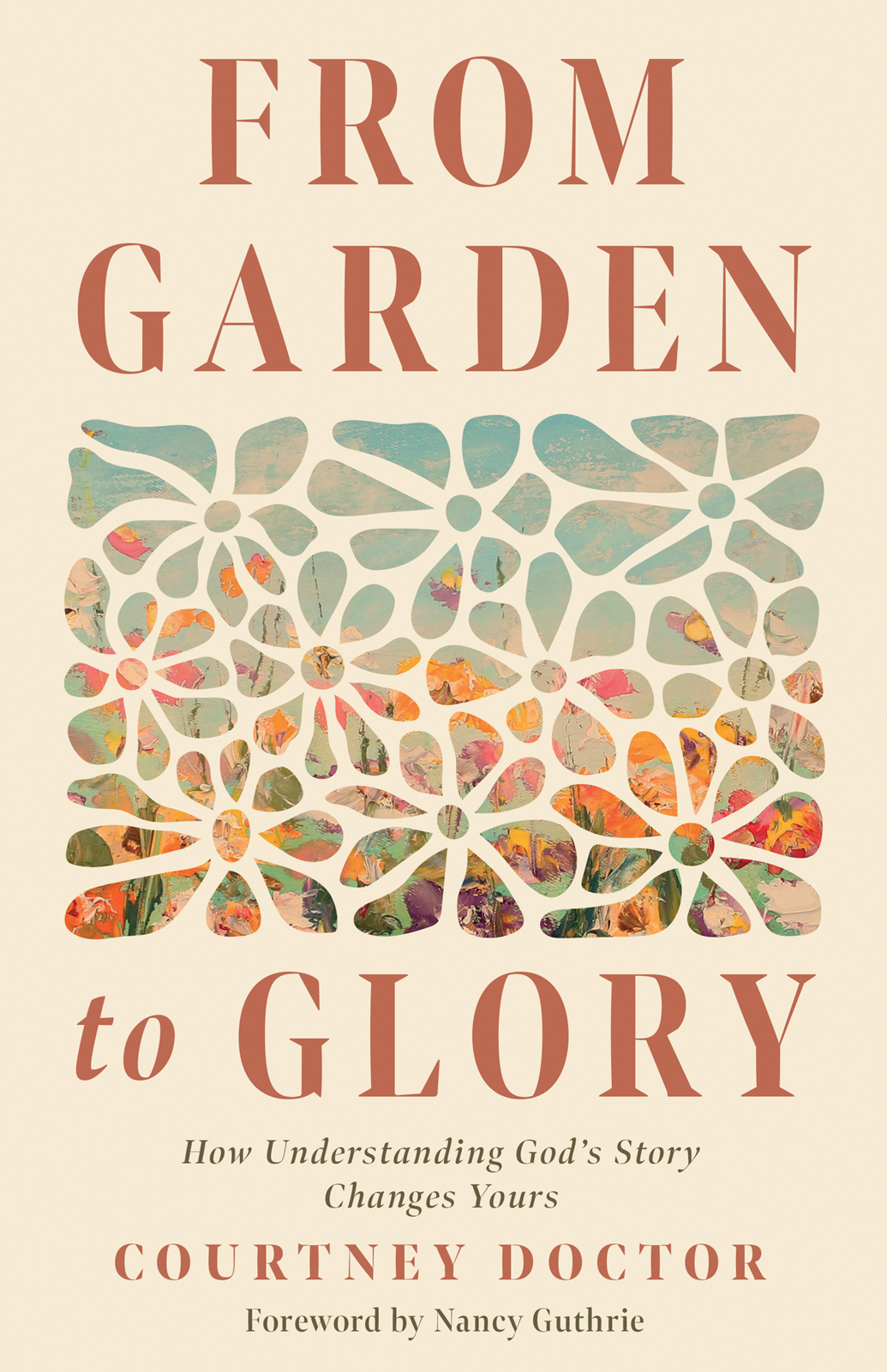
Read more in From Garden to Glory by Courtney Doctor
0 Comments Leave a Comment »
How Daniel Shows Us a Better Path Even When Life Is Difficult
Posted on Apr 02, 2024 Topic : Men's Christian Living, Prophecy, Women's Christian Living
Posted by : Amir Tsarfati

The Babylonians swept through Jerusalem like a tornado. Death, destruction, and loss trailed behind them. By the time Daniel and his friends began their long trek to the capital city, they had nothing left of their former lives. And when I say nothing, I don’t just mean they lost their possessions and their comfortable royal lives. After a tornado hits, at least there is the hope that between insurance money and some help from the government, people can rebuild their homes and their businesses. Maybe life can one day get back to normal again.
But for Daniel’s gang, normal was a state of being that no longer existed. They had been in the line of nobility to become somebody in the nation of Judah. They were being groomed for high positions, name recognition, and a life of power in their line of service. Those dreams were now shattered, and all that faced them was an uncertain future that might include slavery, servitude, or possibly a quick death.
One has to believe that the question of “Why?” crossed Daniel’s mind. Why would God have allowed a heathen nation like Babylon to invade and enslave God’s chosen people? But because of Daniel’s upbringing, the answer to this seemingly huge conundrum was quite easy. Daniel was brought up with a knowledge of the Word of God. He would be familiar with the warnings of the prophets like Isaiah and Jeremiah. Being within the royal circle, he had seen how the kings since the days of Josiah had rebelled against the God of their fathers and were following pagan deities. What had been promised since the days of Moses was coming to pass. If the nation rebelled, God would bring punishment. And, as so often happens, the children were about to pay the price for the sins of their fathers.
Daniel and his friends could have been angry at God and bitter against the generations that came before them. That is how so many people react when they are innocent victims of other people’s sins. And, for those who have been victimized, it is totally understandable that they may descend into long-lasting anger and depression. But what Daniel shows us is that there is a better path. There is a way that lifts one up, rather than letting past circumstances grind one into the ground. It is the way of hope, the way of faith, the way of God.
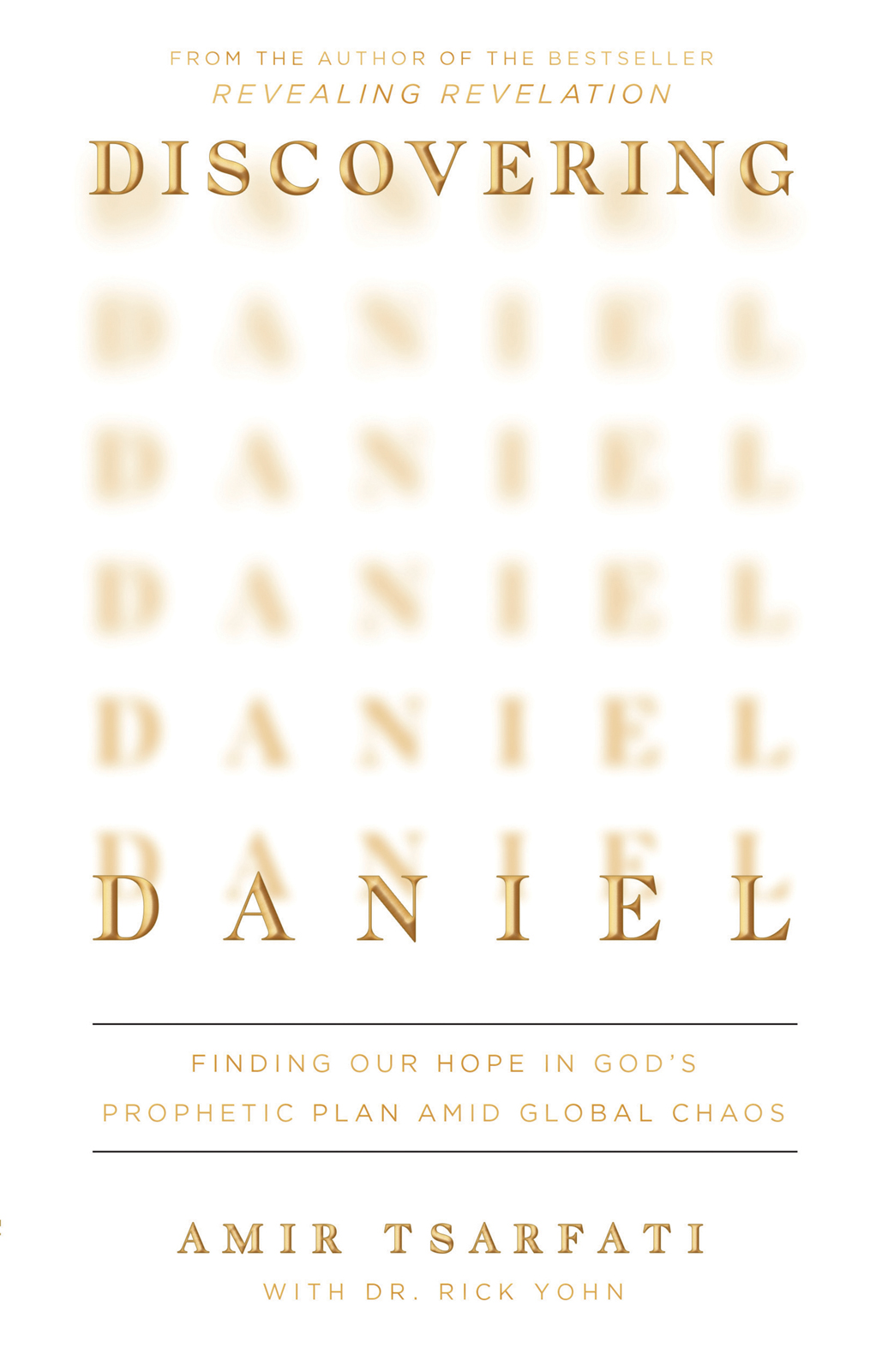
Read more in Discovering Daniel by Amir Tsarfati
0 Comments Leave a Comment »
The Four Common Hinderances to Effective Prayer—and How to Overcome Them
Posted on Mar 26, 2024 Topic : Inspirational/Devotional, Women's Christian Living
Posted by : Hillary Morgan Ferrer and Julie Loos

“Can Anything Hinder My Prayers?”
That’s a loaded question. And I (Julie) guess we should start by asking “What do you mean by that?” If you mean: “Is there a certain format I must use?” then I would answer, “No.” If you mean: “Is there a wrong motive, attitude, or purpose with which I can pray?” then I would say, “Yes.” The only time hindered prayers are specifically mentioned is in 1 Peter 3:7, where husbands are commanded to live with their wives in understanding so that their prayers will not be hindered. You heard that right, ladies! A husband mistreating his wife hinders his prayers. But before we get all high and mighty, we should ask if that’s the only situation. Let’s discuss a few hindrances that I have discovered after learning about and teaching on prayer for the last 22 years.
- Praying with an unrepentant heart. It goes without saying that when we pray, we want God to hear us. Unconfessed sin can hinder that communication (Psalm 66:18;Isaiah 59:2). So it’s important that we spend some time examining ourselves before we present our requests.
- Not praying in Jesus’s name. This is probably one of the most misunderstood parts of prayer. Many people treat this phrase like a magic incantation that we can tack onto the end of a prayer in order to bind God to His promise (John 14:13-14). But that is not what this phrase means. What I have learned from wise prayer leaders throughout the years is that praying in Jesus’s name means praying as Jesus’s representative here on earth—with His authority, according to His nature, for His glory, to build up His kingdom, and with His purposes in mind. We can do our best to pray accordingly, but we can never fully know God’s ultimate purposes. This is why James 4:15 recommends we say, “If it is the Lord’s will.” Know His character and align yourself with it to the best of your ability. Then let God be God.
- Praying in the flesh and not in the Spirit. This dovetails with praying in the name of Jesus. Are our prayers self-focused or kingdom-focused? Are we praying for our comfort and ease or our character formation? Are we seeking the wisdom and instruction of the Holy Spirit when we pray? It’s not about us but about God’s will and His glory. The Holy Spirit will help us if we ask (Romans 8:26).
- Praying without intention of obedience. This really got my attention. In reading Praying God’s Heart by Alvin Vander Griend (one of my favorite authors on prayer), Alvin shows that prayer primes us for action. If we have no intention of acting on what God shows us or calls us to through prayer, why would He answer? We have a dangerous tendency to use prayer as an excuse not to do anything about it. Vander Griend encourages us to be ready to “report for duty” when we pray.
I’m always trying to grow as a prayer warrior, wondering if there is something I can do to make my prayers more effective (James 5:16). That’s when I remember that God gives grace to the humble. So, as I humble myself in prayer, He will give me the grace I need. If He knows I am at my core devoted to Him, His Word, His way, and His glory, then I believe He will honor that even when we don’t “check all the boxes” in our prayers. But that does not give us an excuse to not grow in our praying life. That is ultimately the right way to pray.

Read more in Honest Prayers for Mama Bears by Hillary Morgan Ferrer

Read more in Honest Prayers for Mama Bears by Julie Loos
0 Comments Leave a Comment »
Ten Good Reasons to Read God’s Word
Posted on Mar 20, 2024 Topic : Inspirational/Devotional, Women's Christian Living
Posted by : Stormie Omartian

Today, more and more believing women are given an open door to become all they were created to be. They are moving out in different areas of influence and ministry and making a difference. They are learning to rely on the power of God to prepare them and open the doors. They are realizing they are not just an afterthought in the order of God’s creation. They were created for a special purpose.
So often we don’t move into all God has for us because we don’t understand what it is He has for us. If we don’t know exactly what His promises are, we can’t get a clear perspective of our situation. God’s “divine power has given to us all things that pertain to life and godliness, through the knowledge of Him who called us by glory and virtue, by which have been given to us exceedingly great and precious promises, that through these you may be partakers of the divine nature” (2 Peter 1:3-4).
We need to know God’s promises well enough to keep them perpetually in our minds and on our hearts. We need to know how to pray so we can partner with God and see His will done in our lives.
One of the primary ways we grow to understand what God has for us is by reading His Word. Here are ten good reasons to begin doing so.
Ten Good Reasons to Read God’s Word
- To know where you are going. You can’t foresee the future or exactly where you are heading, but God’s Word will guide you (Psalm 119:133).
- To have wisdom. Knowledge of God’s Word is where wisdom begins to grow in you (Psalm 19:7).
- To find success. When you live according to the teachings of the Bible, life works (Joshua 1:8).
- To live in purity. You must live a life of holiness and purity in order to enjoy more of the Lord’s presence, but you can’t be made pure without being cleansed through God’s Word (Psalm 119:9).
- To obey God. If you don’t understand what God’s laws are, how can you obey them? (Psalm 119:33-35).
- To have joy. You cannot be free of anxiety and unrest without the Word of God in your heart (Psalm 19:8).
- To grow in faith. You can’t grow in faith without reading and hearing the Word of God (Romans 10:17).
- To find deliverance. You won’t know what you need to be free of unless you study God’s Word to find out (John 8:31-32).
- To have peace. God will give you a peace that the world can’t give, but you must find it first in His Word (Psalm 119:165).
- To distinguish good from evil. Everything has become so relative today, how can you know for sure what is right and wrong without God’s Word? (Psalm 119:11).
When you live according to God’s Word and by the power of His Holy Spirit, you can trust that you are in the right place at the right time and that the Lord is doing great things in you and through you. You can trust that God is moving you into the wholeness, purpose, and blessing He has for you.
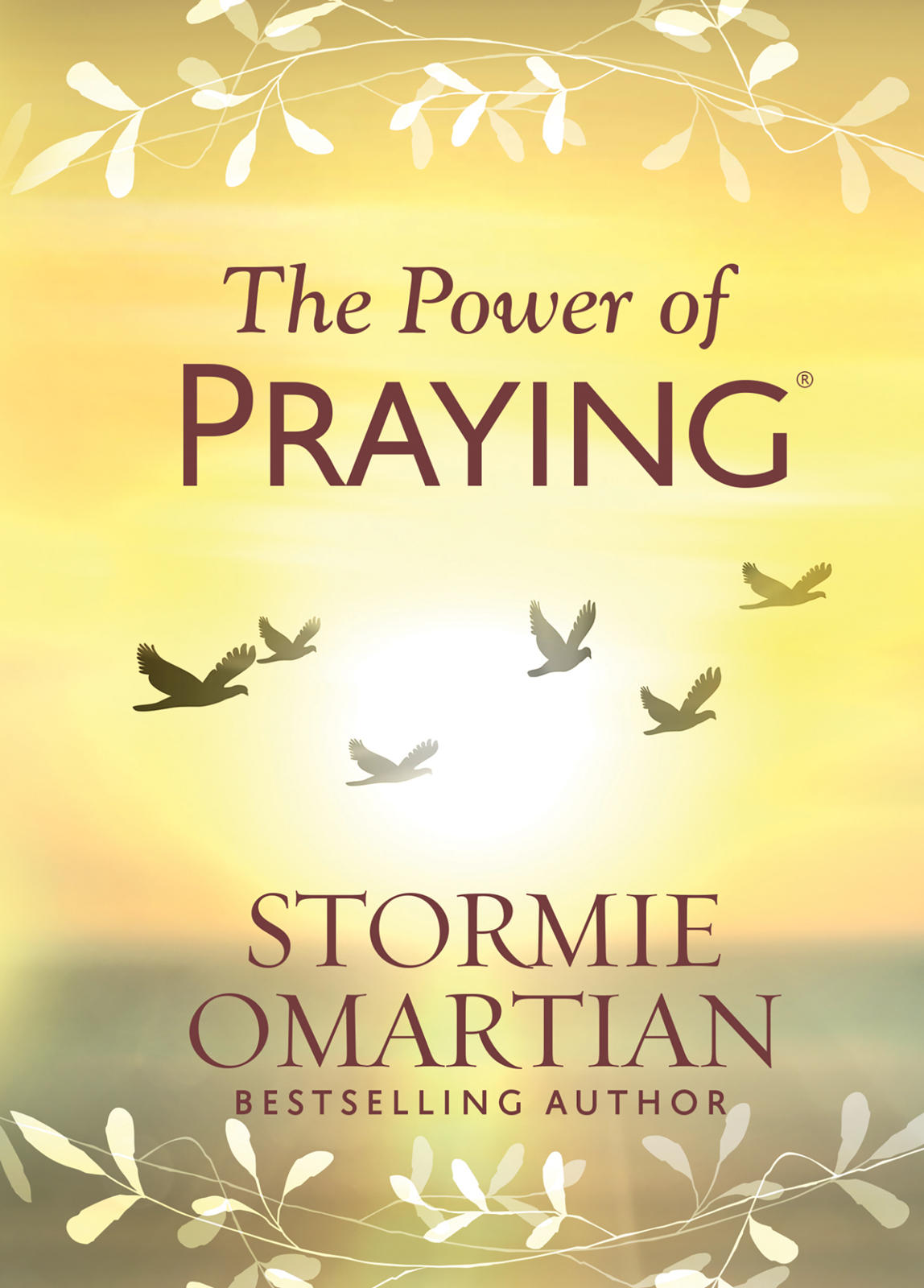
Read more in The Power of Praying by Stormie Omartian
0 Comments Leave a Comment »
Praying and Listening: A Direct Journey to the True Heart of Prayer
Posted on Mar 07, 2024 Topic : Inspirational/Devotional, Men's Christian Living, Women's Christian Living
Posted by : Terry Glaspey

One of the common mistakes we can make about prayer is to think of it primarily as monologue. We tend to mostly think about only our side of the conversation. We spend our time talking to God, letting Him know our needs and desires. Then we close with our amen and go on our way, thinking that once we let Him know what we need that our prayers are done.
That would be fine if praying were like putting a message in a bottle and tossing it into the sea of eternity, where we hope it will reach its destination, though we never know for sure. Instead, we should think of prayer as more like a phone call or a highly engaged email exchange. Two parties are involved. And no real conversation takes place when only one party is doing the speaking. It takes two people to have a conversation, so if our prayer is a conversation, we ought to learn to listen as well as speak. We should not be content with filling the air with our words. We should also attune our ears to listen—for God wants to communicate with us.
All too often I have spent my time in prayer pouring out my heart to God, letting Him know of my needs and desires, of my hurts and doubts, of my confusion and pain. I have confessed my sins and thanked Him for His grace and forgiveness. Then, I have risen from my knees and gone about my business.
But how do you think your spouse or a good friend would feel if you walked up to them, gave them a complete report on the status of your life, told them what you needed from them, and then shook their hand and promptly walked away?
Isn’t that sometimes the way we approach God?
But because God longs to have a relationship with us, prayer is not just a formal exercise, but an experience of real communication. He is not only the God who listens and hears—He is the God who speaks. If we take the time to listen closely, we will sense direction, encouragement, rebuke, guidance, or whatever it may be that He yearns to say to us.
Of course, we are not listening for an audible voice. Instead, we listen for a voice that arises from the quiet depths of the heart. There is nothing weird or scary or strange about learning to listen to God. It is not a matter of “hearing voices” but about becoming attuned to His quiet inner nudgings. It is about the conviction that comes when we quiet all our restless thoughts and worries, tune out the many distractions, and just listen to what God communicates in the deep interior of our souls.
We should take the time to listen, for God has something personal to say to you and to me.
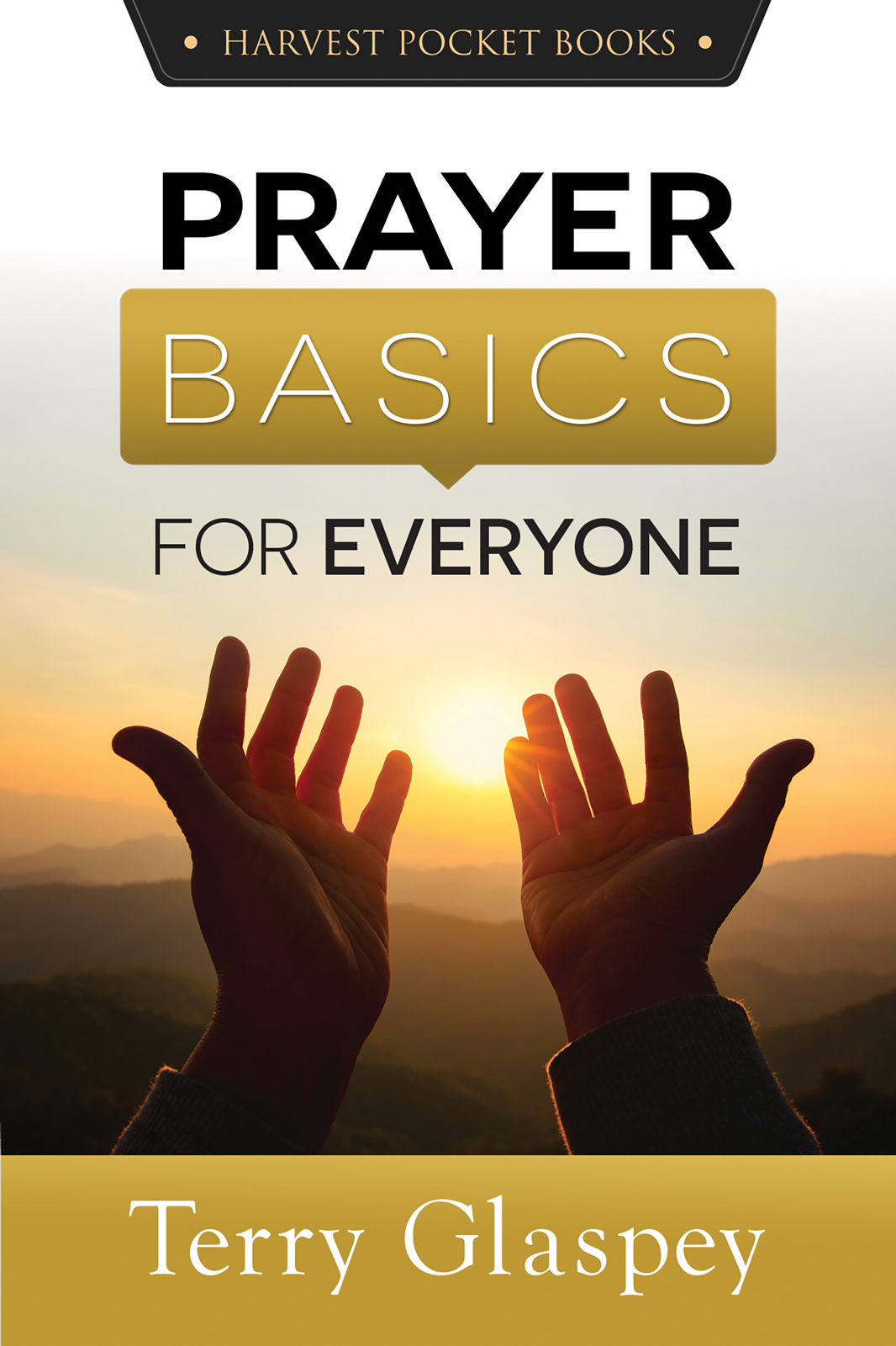
Read more in Prayer Basics for Everyone by Terry Glaspey
0 Comments Leave a Comment »
3 Prayers to Comfort a Heart Suffering Loss
Posted on Mar 06, 2024 Topic : Inspirational/Devotional, Women's Christian Living
Posted by : Gayle Roper

Life after the death of a loved one is full of grief, uncertainty, and loneliness.
In the following prayers excerpted from Prayers for a Widow’s Journey, author Gayle Roper talks to the Lord about what it feels like to be caught in the unsought solitude of widowhood. Each prayer is accompanied by a verse from Scripture that grounds the prayer not in self-pity, but in an awareness of the boundless care of the God of all comfort. Rather than explaining grief away, Gayle acknowledges the pain and invites you to trust God even in these darkest of days.
While written primarily for those who have lost their husbands, these prayers will stir the heart of anyone who knows the bitter taste of loss and longs for the balm of God’s comforting presence.
Prayer 1: ...I will not leave you comfortless...
There’s a gigantic hole, Lord. A cavern. An abyss, empty and black. Ugly.
That may sound like overkill, like overstatement, but is it? The large part of me that my husband filled with his love and his presence has been ripped away. I look the same. I sound the same. I am not the same. The married part of me has disappeared. Poof! Gone. All that’s left is silence and pain.
What will fill that gaping chasm that used to teem with life and love and purpose? Only You, Lord. Only You who will never leave me comfortless.
I will not leave you comfortless: I will come to you.
John 14:18 KJV
Prayer 2: ...nothing in all creation...
Lord, I’m at one end of a long tunnel, viewing everything and everyone from a distance. I’m disconnected, like there’s a sheet of glass between me and the world. I see what’s going on around me, but I can’t touch it or it me. For someone who’s used to engaging with people, here-but-not-here is strange and unnerving.
Lord, what a comfort to know that no matter how vague and lost I am, You are ever present. No matter how disconnected I feel, You hold me close. Thank You that nothing—not loss, not vagueness, not grief—can separate me from You.
I am convinced that...nothing in all creation will ever be able to separate us from the love of God that is revealed in Christ Jesus our Lord.
Romans 8:38-39 NLT
Prayer 3: ...forgetting what lies behind...
Lord, I feel guilty when I start to feel better. It’s like grief says, “You need me, kiddo. I’m the only one who keeps him alive for you. As long as you ache, you won’t forget him. You start to hope, and he’ll disappear.”
I know that’s a grievous lie. He won’t ever leave me. But it’s true that opening myself to hope will force him to stand aside so I can learn to live with less of him. This is both a harsh truth and the key to living fully again.
Jesus, give me the grace to press on.
One thing I do: forgetting what lies behind and straining forward to what lies ahead, I press on toward the goal for the prize of the upward call of God in Christ Jesus.
Philippians 3:13-14
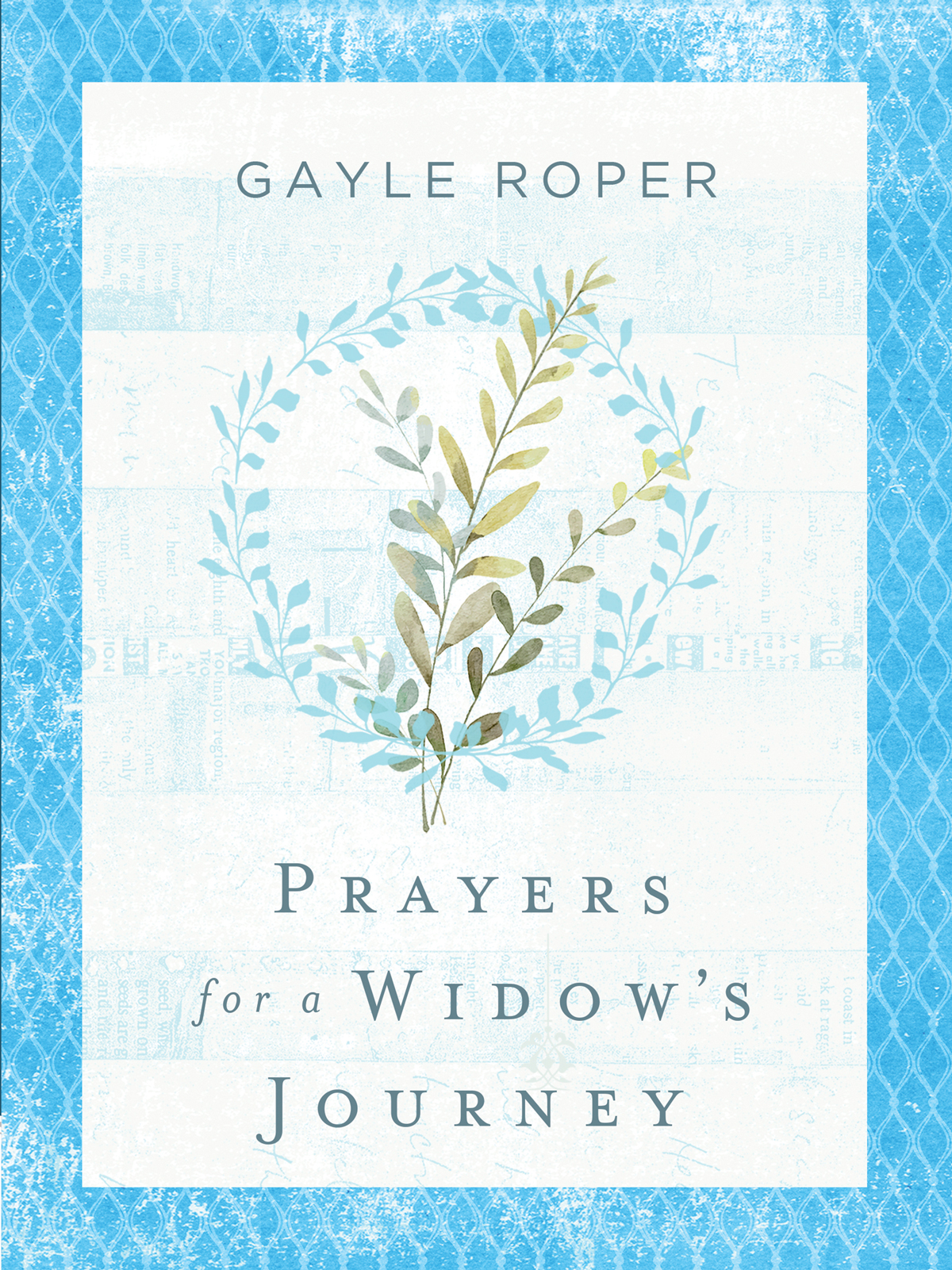
Read more in Prayers for a Widow's Journey by Gayle Roper
0 Comments Leave a Comment »
How God’s Word Offers Hope in Every Season of Parenting
Posted on Mar 05, 2024 Topic : Inspirational/Devotional, Men's Christian Living, Women's Christian Living
Posted by : Melissa Kruger

I’ll never forget the first time I put my daughter Emma in her car seat. My husband and I were living in Edinburgh, Scotland, and Emma was born a week early. As we prepared to leave the hospital, we bundled her up and strapped her in the seat to the best of our abilities. She looked so incredibly tiny in her big baby carrier.
We then called for a taxi. Living overseas on a student budget meant that we didn’t have a car, so I’d never had an opportunity to practice adjusting a car seat. As we carried all our things to the waiting driver, we did our best to safely secure her, feeling completely unprepared and unqualified for the task before us.
Buckling her in was just the beginning of my feelings of inadequacy. I didn’t know how to bathe her, feed her, care for her, or parent her. I’d been handed this amazing gift and I found myself wondering, Don’t they come with instruction manuals or something?
I’d read the books; I’d tried to prepare. But head knowledge can take you only so far. There are some parts of parenting that are learned only as you put theory into practice.
I felt inadequate on my first day of parenting. I continue to feel that way 23 years later. While I’ve now been a mother for many years, I’m still the first-time mother of an adult daughter. I’m still learning. I’m still growing. I’m still making mistakes. I’m still finding my way.
While I haven’t found that longed-for parenting manual that gives me explicit instructions for each season of parenting, I can tell you, without a doubt, that I’ve found something even better. God’s Word has been my firm anchor, my shining light, my faithful guide, my trusted resource, and my sure hope in every season of parenting.
It hasn’t told me the particulars of how to get my child to sleep through the night or eat her vegetables. However, it has imbued me with patience and kindness while enduring another sleepless night or finding a veggie mysteriously hidden under a napkin (again). God’s Word hasn’t kept me (or my children) from the realities of suffering, but it has been a comfort while walking through painful losses and unmet expectations. God’s Word doesn’t promise me that my children will live long lives, get married, have grandchildren, or become Christians, but it does promise me that God will be with me always, never leaving nor forsaking me.
As we enter the preteen and teenage years with our children, we know God’s Word is important. We want them to read it. We encourage them to study it. We hope that they’ll love it. And we pray with all sorts of fervor that they’ll obey it.
But before we get to our children’s relationship with God’s Word, I want us to think as parents about our relationship with God and his Word. What we believe and how we live matters greatly for whether our children know, love, and obey God’s Word. We can’t make our children believe in Jesus (see Ephesians 2:8-10), but we can put them in an environment that allows them to witness the fruit of God’s work in our lives. We can hope they hear God’s Word in our home and see its effects on our lives.
You may be tempted to skip over this part of parenting and move on to the “important” stuff—like telling you whether or not it’s okay for your teens to watch certain YouTube videos or wear certain kinds of clothing.
There’s a reason we’re starting here. Parenting isn’t just about figuring out how to manage your teen. In every season of parenting, God is teaching us about himself. He’s parenting us as we parent our children. He’s teaching us as we teach them. He walks with us and wants us to rely on him for the wisdom we so desperately long for as parents.
I can’t promise you a ready resource guide to all of life’s answers for parenting teens. But I can lead you to the One who has the answers, the wisdom, and the guidance you need for your particular child. Thankfully, he promises to be with you and guide you. And, we find him in his Word.
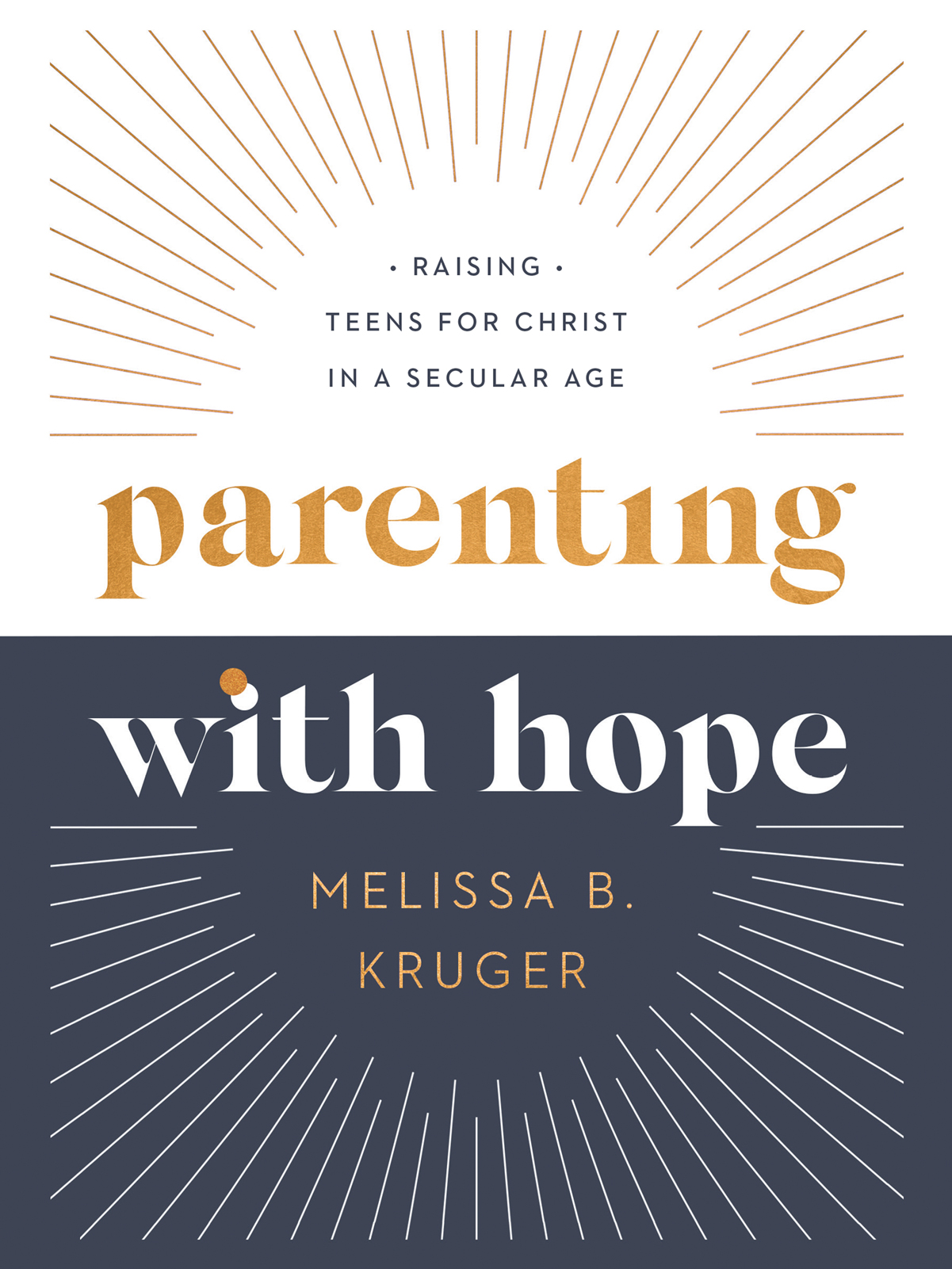
Read more in Parenting with Hope by Melissa Kruger
0 Comments Leave a Comment »
Made By God: Helping Your Child Celebrate Who They Are
Posted on Feb 29, 2024 Topic : Inspirational/Devotional, Men's Christian Living, Women's Christian Living
Posted by : Emily Lex

On January 1, 2019, I started a yearlong painting challenge. My first piece was of a paperwhite bulb in a favorite geometric-patterned planter sitting on the kitchen counter. I added a shadow to mimic other artists and captioned it “A Paperwhite Waiting to Bloom.”
All year, every single day, I painted. I set up a desk in my office to keep all my supplies out, and each afternoon, as I quieted my mind, I chose a subject to sketch and paint. Some paintings told stories about the day—a toothbrush and toothpaste on the day we all had dentist appointments, a bag of cough drops when I wasn’t feeling so great, a box of Lucky Charms on St. Patrick’s Day, a maple leaf turning colors in early fall. Sometimes I painted things that stirred up a cherished story I wanted to share, like my grandma’s antique ring she passed down to me, a bouquet of balloons to illustrate a Scripture I read that morning, a Hawaiian shirt in honor of our dads on Father’s Day. I tried my hand at loose landscapes and animals and seasonal flora and fauna and surprised myself nearly every single day with how well the paintings turned out.
Over my year of creating daily paintings, I learned to be an artist. I practiced every day, withholding harsh judgment, and trusted I was using my gifts to the best of my ability. The practice certainly helped improve my art—the paintings toward the end of the year are decidedly more detailed and refined than those at the beginning. I am more confident with sketching, mixing colors, and shading than I was before. But the daily discipline became more than just painting cute things. It turned into a daily spiritual practice—a way for me to stand in agreement with what God says of me and be fully myself. I learned to slow down, pay attention, notice, and capture the beauty of regular, ordinary life in lovely watercolors.
The year of paintings did more than just make me a better artist. It continued the work of healing my heart, mind, and soul. Each of us has gifts and talents and passions inside. We do not pursue these to prove our value or give our lives meaning. Instead, out of a deep, abiding trust in God, we use them to become the people he always intended for us to be—quietly confident, contented, and full of unrelenting trust even when life is not as smooth as we wish. And we use these gifts he’s given us as an offering back to him.
Jesus replaces our once anxious, burdened hearts with hope, joy, and peace, and out of that overflow, we use all variety of gifts for his glory.
***
I turned on the radio, and the Christmas carol “Little Drummer Boy” was playing. I’m particularly fond of Justin Bieber’s snappy rendition, but this one by For King and Country captured my attention as I drove home on the still-dark roads after dropping Ethan off at school. I listened to the story of the poor boy who hadn’t a valuable gift to bring to the new baby King and saw a glimmer of myself in the story. Maybe you identify with him too.
Jesus is so worthy of being honored and deserves only the most luxurious of all gifts. Yet there we stand with our wounds, our baggage, our bad habits, and our wavering faith, and still, he asks us to come. He just wants us to show up as ourselves—fully forgiven, completely accepted—and give our lives, our hands, and our hearts back to him as an offering.
So we play the drum. We paint. We fight for the weak. We build and sew and teach. We design lovely spaces and cook magnificent (or not so magnificent) meals. We start businesses, take photographs, write words, tell stories, calculate figures. We do this all because this is what makes us us. We don’t have to try to do or be what we think is expected of us; we get to be fully ourselves. We use our one-of-a-kind mix of talent, voice, community, career, culture, and time in history to share the good news of who Jesus is and what he has done for us as only we can do. We do this not for recognition or to prove our value but because it is all we have to offer, and we can’t help but bring some-thing to the One who gives us life.
My favorite piece of the classic Christmas carol (besides the catchy pa-rum-pum-pum-pum part) comes at the end. “Then, he smiled at me,” retells the Drummer Boy. “Me and my drum.” Isn’t that amazing? A little cheesy, sure, but also true. Jesus is surrounded by precious, valuable gifts, yet he is so pleased with the humble offering of a drum solo.
Whatever our gifts—whether big or small, seemingly important or barely noticed, on display or done in secret—may we offer them generously to a loving Father who receives our offering with a smile. He takes great delight in us being exactly who he made us to be.
***
This excerpt was taken from Freely and Lightly by Emily Lex, a gentle guide to laying down your burdens and picking up God's invitation to rest in His perfect plan. For every special gift, talent, or passion you have, God designed you with a purpose in mind. Psalm 139:13-14 (NIV) says, "For you created my innermost being; you knit me together in my mother's womb. I praise you because I am fearfully in wonderfully made; your works are wonderful, I know that full well." We are called to glorify him by uniquely embracing our abilities, because they make us who we are—a delight of the Lord.
0 Comments Leave a Comment »
3 Prayer Lessons that Will Change How You Talk to God
Posted on Feb 27, 2024 Topic : Inspirational/Devotional, Men's Christian Living, Women's Christian Living
Posted by : James Merritt

Here’s a story you may have encountered before, but can you relate to it? A young reporter in Israel was searching for a human-interest story when she learned about an old man who’d been praying at the Wailing Wall in the Old City of Jerusalem twice a day, every day, for many years. Sure enough, she found him there, standing as he rocked back and forth with eyes closed, beating his breast, raising his hands to God, passionately praying.
When he stopped, the reporter approached him and asked, “Sir, how many years have you been praying here?”
“Fifty,” he told her.
“What do you pray for?”
“I pray for peace between the Jews and Arabs, for our children to grow up in safety and friendship. I especially pray for the peace of Jerusalem.”
“Do you believe your prayers are effective?”
With apparent sadness, the old man replied, “Not really. I feel like I am talking to a wall.”
I believe I owe it to you to be upfront, candid, and transparent. Praying has always been hard work for me. Not only do I not think of myself as a great prayer warrior, but I’m still learning how to pray both effectively and with certainty that I’m truly connecting with God.
The truth is I’m not sure any Christian graduates from the school of prayer, so I’m guessing that you, too, would benefit from learning more about how to pray.
Here’s the first lesson we all need to learn, coming through what may be the three greatest words about prayer we’ll ever hear:
God hears prayer.
These simple, short, single-syllable words lined up in a sentence tell us why every follower of Jesus can pray not only consistently, constantly, and continuously, but also confidently. They can transform how we think about prayer, believing that our prayers can make an eternal difference in both our lives and the lives of others. But when I say God hears prayer, don’t just take my word for it. Over and over in his Word, God himself tells us he hears when we call:
- The righteous cry out, and the Lord hears (Psalm34:17).
- Before they call, I will answer; while they are still speaking, I will hear (Isaiah 65:24).
- Call to me and I will answer you (Jeremiah 33:3).
When you pray, you also have the Lord’s full attention. He hangs on every word you say. He doesn’t put you on hold, ask you to wait in line, or require you to make an appointment.
The second lesson we must learn was succinctly stated by English preacher Charles Spurgeon:
God will not hear you unless you believe he will hear you.*
This makes sense, doesn’t it? If you don’t believe another person is listening during a conversation between the two of you, what will happen to your attempt to communicate? But again, his Word makes it clear that God is listening. First Peter 3:12 says, “The eyes of the Lord are on the righteous and his ears are attentive to their prayer.”
Now, knowing and believing that God hears our prayers is foundational to our prayer lives, but the third lesson we must learn is that we also need to know how to pray—to the glory of God but also because we want to make the connection with him we so crave. We want to replace the feeling we’re not getting through to God with the knowledge that our prayers are truly soaring to his very throne room.
As you read about the apostle Paul’s telling the churches in Ephesus, Philippi, and Colossae what and how he prayed for them, I believe you’ll see that he had a direct “drop line” to God. After all, he knew he wasn’t praying to just any god; he was praying to the God who hears, who listens. These prayers also serve as a divine model for how we can pray not just when we’re in crisis but when we’re not. In fact, the best way to learn how to pray when in a crisis is to pray when not in one.
Imprisoned when he wrote these letters we now call epistles, Paul shared prayers we can pray for others just as he did. But we can also personalize them and pray for ourselves. We can pray for anyone and anywhere, anytime, and under any circumstances.
Max Lucado said, “Our prayers may be awkward. Our attempts may be feeble. But since the power of prayer is in the One who hears it and not the one who says it, our prayers do make a difference.” ** I can assure you that as you learn from these prayers that are as much for us as they were for the churches to whom Paul wrote, your own prayers won’t be awkward, your attempts won’t be feeble, your petitions will make a difference, and you can rest assured they will be heard.
Let’s begin this journey of learning how to pray to the God who hears.
_______
* “54 Life-Changing Prayer Quotes—the Best of the Best!” the Blazing Center, https: The blazingcenter.com/pray-quotes.
**“54 Life-Changing Prayer Quotes—the Best of the Best!” the Blazing Center.

Read more in The God Who Hears by James Merritt
0 Comments Leave a Comment »
Lessons From the Garden: A Holistic Look at Nurturing Natural Beauty
Posted on Feb 22, 2024 Topic : Inspirational/Devotional, Men's Christian Living, Women's Christian Living
Posted by : Christie Purifoy

When I first began gardening, I grew vegetables. Is lettuce a vegetable? Well, let’s just say I was trying to grow food, although not very successfully. I was a half-hearted gardener who wilted in the summer heat faster than my lettuces in their Beatrix Potter rows. And yet even in those days, the few cherry tomatoes and the handful of fresh basil I harvested for a big pasta salad seemed made of sheer joy and wonder. Even a modest harvest can fill us up with a delicious pride. I found more success in the vegetable garden after our move to an old Pennsylvania farmhouse. It turns out that weeds growing practically right outside your back door will tend to get pulled more regularly than weeds in a community garden plot ten blocks from your apartment. But something strange happened to my farmhouse vegetable garden after a few years: it transformed itself into a flower garden. Oh, you could still find a few tomatoes and cucumbers somewhere in that glorious, overgrown mess, but more and more of my raised beds were given over to marigolds, zinnias, cosmos, nasturtium, sunflowers, and even a few roses tumbling in and around the garden gate. Vegetables? Or flowers? Or both? I have teeter-tottered between those two poles ever since.

Some years I seem to grow no food at all, in other years, I am ruthless and practical, and I plant tomatoes instead of dahlias. But here is the incredible truth all these growing seasons have brought home to me: gardens aren’t really for growing plants. Gardens are for growing LIFE. We may focus on the tomatoes and cucumbers or the cosmos and zinnias, but all along our gardens are growing earthworms and butterflies, birds and rabbits, neighborhood children at play and family dinners and all kinds of connections we might never have imagined possible. Of course, it isn’t all triumph and joy. Those rabbits are cute, but they are heartbreakers in the lettuce patch. Yet somehow even the disappointments become woven into a vital, abundant whole.

Your pots of herbs on the windowsill may seem isolated and small, but they are a link with your neighbor’s tomato bed, which is a link with the community garden, and a link to the forest preserve, the botanical garden, the organic farm–all of them joining up to wind the earth round in green ribbons of life. From seedtime to harvest and back again, the reconciling work of a garden is never finished, always ongoing, and, in every season, eager for us to join in.
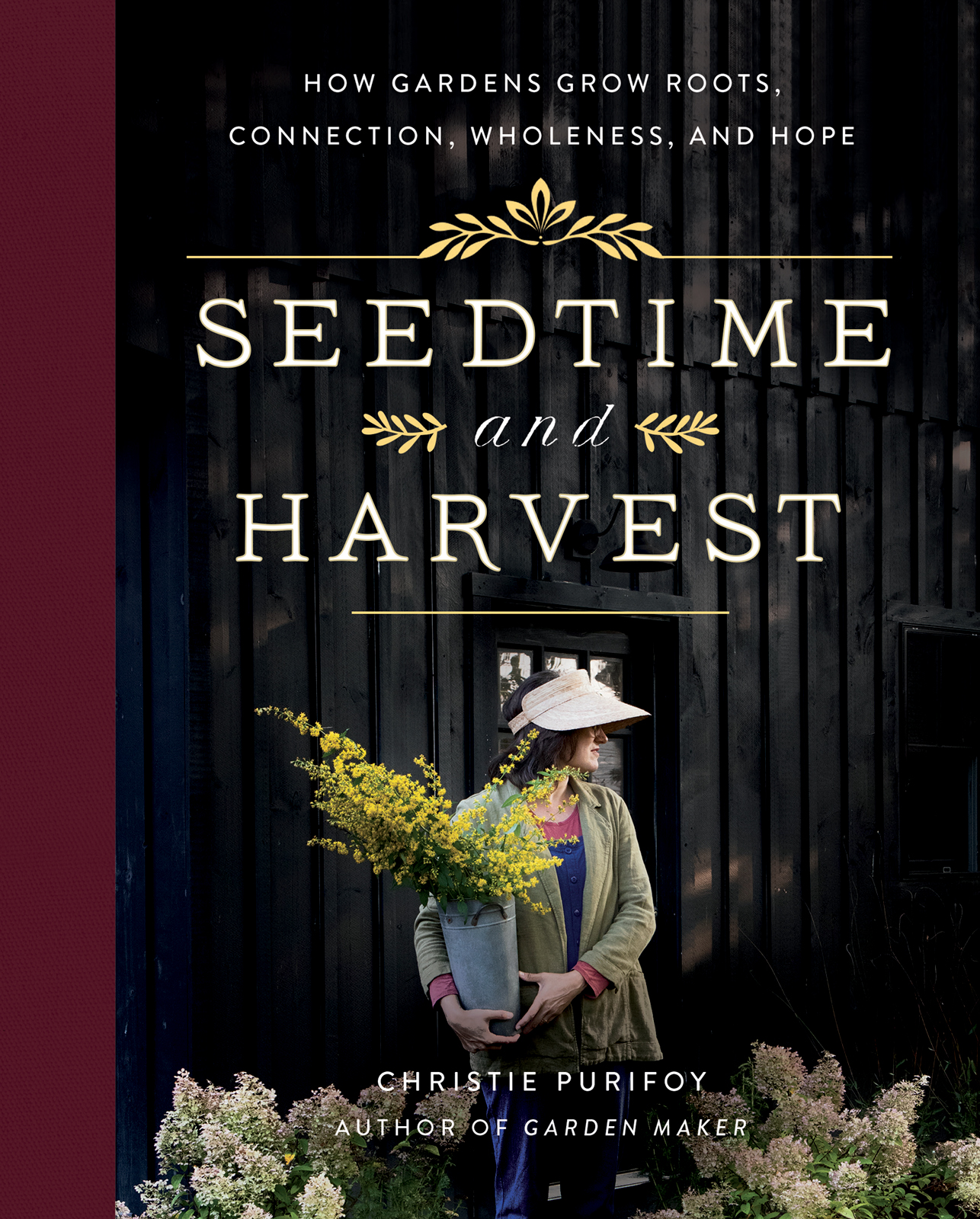
Read more in Seedtime and Harvest by Christie Purifoy
0 Comments Leave a Comment »
How Stories Shape Your Child and Reveal a Perfect Storyteller
Posted on Feb 15, 2024 Topic : Inspirational/Devotional, Men's Christian Living, Women's Christian Living
Posted by : Laura Wifler

We were driving down the highway when my son shut his book, looked up at me in the rearview mirror and asked, “Mom, why do all stories end the same? Why do they always have a good ending?”
“Do you remember the parts of the gospel, bud? Creation, Fall, Redemption, Consummation and how that’s the story God is writing for all of us? Well, authors, regardless of if they love God or not, usually can’t help but follow that same pattern, because it’s inherent in all humans. It’s written on our hearts.” I replied.
Both my older children stared at me for a beat, and then I watched the recognition dawn as huge smiles lit up their faces. From there we launched into a long discussion of all the parallels we see from God’s story to the books they were reading.
Now, I’ll admit, I rarely I have a parenting moment as golden as that one, so I’m taking it to the bank. But what my children learned that day was something I didn’t learn until I was much older. All humans, regardless of faith, are story-shaped people. Stories are part of us, whether we want them to be or not. And by God’s design, we learn about life and obedience to his will and ways through stories.
I think that’s why I’ve found books and stories to be integral in my own spiritual formation, as well as a key tool I use for my children. Being bound by time and space, we can’t live in all circumstances or unique situations. But stories allow us to enter into other lives, enlarging our view of the human experience. By reading stories, we allow our assumptions and thinking to be challenged, and we grow our compassion and empathy for other ways of living. Suffice it to say, stories are a powerful tool.
As parents, we can use stories of all kinds to give our children a bigger view of God’s ways and help them not only know what God loves, but to love what he loves. Stories help children move beyond just knowing what they “should” do, to helping them want to do the right thing.
For example, a child may know they should be good and kind, in a dutiful sort of way. But good books teach a child to love courage, bravery, gentleness, generosity, and compassion, and to hate cruelty, envy, greed, or cowardness.
The best books show a child the potential of the world—what it could be, and what it shouldn’t become.
As a mom, I’ve found the books my children and I read together often create incredible springboards for conversations, tucking away nuggets of what we as Christians value, which is what God values. And even when a book doesn’t lead to robust discussion, as I’ve seen in my own life, I’m certain that someday, the books they’re reading today will softly shape their decisions, actions, and values.
So bring good books into your home. They don’t all have to be explicitly Christian or word-for-word scripture (Though those are awesome!). Let your children learn from putting themselves in the character’s shoes and letting their imagination run along with the turning of pages. We’re story-shaped people. So let the stories, shape.

Read more in A World Wonder by Laura Wifler
0 Comments Leave a Comment »
Do You Want to Start a Garden But Don’t Have a Green Thumb? Read This.
Posted on Feb 08, 2024 Topic : Men's Christian Living, Women's Christian Living
Posted by : Stacy Ling

While I’m an avid gardener now, I didn’t grow up with a love for gardening. Is that weird? You’d think that for someone who’s as into flowers and plants as I am, I would have been growing things my whole life, perhaps inspired by a talented gardener in my family, but that wasn’t the case.
My gardening journey began with a few houseplants in that tiny condominium. And I can honestly tell you that I did not achieve success with them. I repotted them, watered them, and tried to give them enough light, but they didn’t survive. I wondered, Was it me? Maybe being a plant mom just wasn’t my thing.
Now, I am not one to back down from a challenge, so I pulled myself up by my bootstraps and decided to try some outdoor gardening instead. I shopped the local nursery and found some pretty light purple impatiens. After bringing them home, I planted them, watered them, fertilized them, and you know what?
They grew!
And so did my confidence as a gardener.
From that point on, I was smitten with gardening. And it wasn’t too long after I achieved these small gardening successes that I begged my husband to move to a house with a little bit more land so I could grow a bigger garden.
As soon as we arrived at our new home, I planted every square inch of the foundation beds with annuals and quickly started working with perennials. I was eager and determined to grow flower gardens all over this half-acre property.
And wouldn’t you know? Those gardens did really well. So, I started a new garden from scratch so I could grow more flowers.
As the years went on, I experimented with more plants, discovered new types of flowers, expanded my gardening spaces, created cozy outdoor gardening rooms, and even found some success growing indoor houseplants too.
So, what happened? How did I go from plant killer to plant parenting boss? I discovered I had been working with the wrong plants.
They were the wrong plants for my home, my light conditions, and my lifestyle. Not all plants are created equal. Some are easy-care and some are just downright fussy. And if you are just starting out like I was? You will want to learn how to garden with an easy-to-grow, easy-to-care-for, low-maintenance approach.
Start small, achieve success, and grow your knowledge from there. Because knowledge doesn’t just come from books, the internet, or a YouTube channel. It comes from just doing. Learning the things that work. And learning the things that don’t. What works for me may not work for you in your garden. But the only way to really know is by doing.
So, find your inspiration, do a little research, and just try things!
The key to becoming a successful gardener is not in knowing every Latin name and horticultural term for plants, but rather in finding joy digging in the dirt, nourishing your soul, and learning about the needs of various plants in your specific microclimate.
And don’t take it to heart when a plant succumbs, because trust me, even the best gardeners lose plants every now and again. It’s part of the process, and sometimes it just wasn’t meant to be.
So, while you may or may not have killed plants before, trust me, you can start, learn, and be successful at growing beautiful blooms.
0 Comments Leave a Comment »
Beyond the Forecast: Discovering God’s Surprising Answers to Prayer
Posted on Feb 06, 2024 Topic : Inspirational/Devotional, Men's Christian Living, Women's Christian Living
Posted by : Kariss Farris

Have you ever prayed for something so long that you lost hope of the answer being yes? Yep, me too.
At the beginning of the year our church fasted in prayer. In an attempt to help our young children learn the spiritual discipline of fasting in prayer, we implemented a family fast. The only beverage allowed was water for the week. We ate dinner together as a family each evening and my husband hosted family prayer each night. Collectively, they chose to pray for a snow day.
We live in Texas, so immediately when I heard their request my heart sank. As a mother I wanted them to see their prayers answered as testament to God's ability to say yes and answer prayer! But, I doubted... there was 0% chance of snow in the forecast. Every night they prayed for a snow day I would check the forecast. The 0% chance of snow never budged. The night before it was supposed to reach freezing temperatures in Texas, I was filled with frustration at God after checking the forecast. I was deflated not only for the prayer of a snow day I believed would go unanswered, but for my own unanswered prayers seemingly waiting in a long line for a yes or flat out rejected. I went to bed accepting they would learn the same hard lesson I'd been learning... sometimes God just says no.
The next morning as my eyes slowly fluttered open, I saw a white layer covering absolutely everything in our backyard. Surely, my eyes were adjusting to the morning. But just then, my oldest daughter walked into the room, saw what I thought I couldn't be seeing, and yelled SNOW DAYYYYYYYYYY with all the excitement of the early 2000s Disney movie "Snow Day." With 0% chance of snow in the forecast, while we were sleeping, God answered their prayer. Just when I thought my children were going to be learning a hard lesson, God was teaching me a better one.
Don't allow the world’s forecast determine your outlook on what God can do.
At the Red Sea, with a massive body of water ahead of them and an army behind, God parted the water for the Israelites. In a den filled with Lions intended to ravage Daniel and his friends, God closed mouths and they reclined on beasts meant to rip them to shreds. The night before Peter was to be tried and possibly executed God sent an angel and while Peter was between two soldiers, chains felt off his wrists and he followed an angel out of the prison and out of the city gates.
At any time, in any place, at any moment God can say yes. He is not bound by forecasts whether they be weather related, or dictated by the people you know or the time you think you're up against. He reigns outside of it all. As you pray, do so in confidence and not in fear of denial!
My children didn't check the weather forecast for their prayer to be answered. They came to the feet of the Father every evening and petitioned to him in faith. As you pray this week, go to the Father in confidence knowing that he lives outside of forecasts and expectations and can make a mountain move with the sound of his voice. THAT is the God you pray to!
Questions for Reflection
- Reflect on a time when you prayed for something persistently, but circumstances seemed impossible, and you began to lose hope. How did you navigate through that period of waiting and uncertainty?
- In the blog, the author emphasizes not allowing the world's forecast to determine our outlook on what God can do. How can you apply this principle to your current circumstances or unanswered prayers? What steps can you take to trust God's sovereignty despite the challenges or seemingly impossible situations you may be facing?
- The blog encourages praying with confidence, knowing that God is not bound by forecasts or expectations. How can you cultivate a spirit of confidence in your prayers, trusting in God's ability to answer beyond human limitations? Are there specific areas in your life where you need to shift from fear of denial to confidence in God's power?
Scripture References:
- Matthew 17:20 (NIV): "He replied, 'Because you have so little faith. Truly I tell you, if you have faith as small as a mustard seed, you can say to this mountain, 'Move from here to there,' and it will move. Nothing will be impossible for you.'"
- Jeremiah 32:17 (NIV): "'Ah, Sovereign Lord, you have made the heavens and the earth by your great power and outstretched arm. Nothing is too hard for you.'"
- Mark 9:23 (NIV): " 'If you can'?" said Jesus. "Everything is possible for one who believes."
- Ephesians 3:20 (NIV): "Now to him who is able to do immeasurably more than all we ask or imagine, according to his power that is at work within us."

Read more in Jesus Everywhere by Kariss Farris
0 Comments Leave a Comment »
How to Listen When God Is Speaking
Posted on Feb 01, 2024 Topic : Inspirational/Devotional, Women's Christian Living
Posted by : Danielle Hitchen

No one would describe me as Pentecostal.
Especially as a college student, I pursued a faith that was very logical, very reasoned, very explainable. Everything fit in a tidy faith-box.
So you can imagine my surprise when, in a moment of deep skepticism and eye-rolling-judgement, I first heard the voice of God.
***
I was in a very early-aughts musical worship chapel (I had, you see, put off attending chapel nearly all semester and was making up chapel credits wherever I could get them!) – fog machine, breathy lead, lots of feels, full-rock-band set up.
Attempting invisibility in the back of the auditorium, I heard the aforementioned breathy lead say, “We’re going to take up an offering.”
Oh no, I thought, just when I figured this couldn’t get worse…
“But we don’t want your money,” he whispered with his eyes closed as he strummed his guitar. Index cards proceeded to be passed through the auditorium and we were told to ask the Lord what he wanted us to offer, to write it down, and place it in the basket as it came by.
I blinked dumbly at my blank card.
Fine, I decided, You want me to ask God what to offer? Sure. Whatever. I can do that.
In the next moment I silently prayed, Lord, what do you want from me?
The answer came as clearly as if the person next to me had spoken it aloud:
I want your voice.
EXCUSE ME, WHAT?
I literally looked around to see if anyone else had heard that. It didn’t appear so. Freaked out but willing to give God my voice if that’s what he really wanted, I hastily scribbled on my card, folded it up, and put it in the plate when it came by.
I pondered this moment in my heart in the months to come, uncertain of what God was asking of me.
***
It wasn’t until several months after publishing my first Baby Believer book that God called the offering of my voice to mind.
In reflecting upon the many things about my post-college life which just looked different than I ever anticipated, I could see how the Lord had been at work in me: preparing me with practical skills and experiences as well as shaping and softening my heart so that I could do the work he had for me.
On occasion, my kids have asked me how to hear God, how to know that God is speaking to them. I still don’t have a great answer to that question.
I’d like to say that hearing God as clearly as I did in that auditorium is a normative experience, but it’s not. That night, however, started me on a journey of learning to listen for God and to God, however he was speaking.
First and foremost, we start by going to and always returning to the scriptures – God’s word – and to Jesus – the very word of God made flesh. Although the Bible is replete with stories of God speaking audibly and clearly to his people, it’s full of many more stories in which he does not. The scriptures remind us to listen for God in the sounds of his creation, to hear what God is saying through his law and his prophets, to internalize the words and actions of Christ, and to remember and learn from the conversations between God and his people that have been preserved for us.
Secondly, we pray. Prayer is not a message in a bottle sent out in hopes that maybe, one day, our words will wash up on the shores of heaven. It’s a two-way conversation that requires speaking and listening, sharing of our needs and attending to where the Lord is already at work in our hearts and lives. Even as we place ourselves before the Lord with our genuine questions, tender cries, and heartfelt requests, let us also remember to spend some moments in silent companionship, delighting in the presence of our Father and listening for his response.
Finally, we listen by looking for what God is doing in our lives. What doors has he closed? Which ones has he opened? Are there opportunities we’ve been overlooking? What has God given you capacity for in this season? Where do your God-given passions and talents lie?
***
The clarity of an audible voice is wonderful, but God subtlety and gentleness with us is also a gift. I’ll close with another example of God’s word coming clearly (though far less distinctly) in my own life:
When I was pregnant with my third child, I kept telling my husband that I wanted to hire monthly housecleaners. He insisted that was not necessary.
Then one August day he said: “I’ve been praying for ways to support you and take things off your plate. You keep telling me we need housekeeping help. It hit me today: this is the answer to my prayer – this is how I can help you. Let’s make space in our budget for regular housecleaning.”
And isn’t that so often how God speaks? Through our life circumstance and those around us. May the Lord give us ears to hear!

Read more in God Speaks by Danielle Hitchen and Jessica Blanchard
0 Comments Leave a Comment »
Love Resurrected: Finding Jesus Again in the Midst of Spiritual Departure
Posted on Jan 25, 2024 Topic : Inspirational/Devotional, Men's Christian Living, Women's Christian Living
Posted by : Bruce Bickel and Stan Jantz

It used to be that people went to church to strengthen their faith, especially during times of excess stress and anxiety. Not anymore. Despite the turmoil in our own backyard brought about by urban strife and political unrest, not to mention the dozens of conflicts going on the in the world right now, church attendance is in decline. According to Jim Davis and Michael Graham, co-authors of The Great Dechurching, 40 million U.S. adults have left the church in the last 20 years. That’s a startling trend, but it’s not the end of the world. In fact, it may be an opportunity—not to woo people back to church, but to bring them back to Jesus.
Don’t get us wrong. We love the church and believe that it’s where Christians use their spiritual gifts, hear the preaching of the Word, observe the Sacraments (baptism and communion), and love one another (okay, that last one is tougher than the others). But unless we love Jesus first and keep him in the center of all things, the church can become little more than a social club.
This tendency to lose our love for Jesus isn’t new. In his assessment of the seven churches in the book of Revelation, Jesus complimented the church in Ephesus before delivering a withering complaint: “You have patiently suffered for me without quitting. But I have this complaint against you. You don’t love me or each other as you did at first!” (Rev. 2:3,4, NLT).
Is it possible that 40 million people have left the church because they have lost their love for Jesus and each other? If it could happen to members of the Ephesian church, the same ones the apostle Paul called “holy people” and “faithful followers of Christ Jesus,” don’t you think it could happen to us? And for those of us who have stuck around in church, let’s not get on our high horse and proclaim, “At least we haven’t left the church like those other losers.” We need to admit that we may be just as guilty of loving Jesus less than we should.
So, what do we do? How do we return to our first love? May we suggest that the way to love Jesus first is to realize just how much Jesus loves us. For those of us who literally grew up in the church, the first song we learned as kids was the simple ditty, “Jesus loves me, this I know, for the Bible tells me so.” Yes, it’s simple, but so very profound. Over and over again the Bible tells us how much we are loved by God. Here's one of our favorite Bible verses expressing God’s extravagant love for us.
God showed how much he loved us by sending his one and only Son into the world so that we might have eternal life through him. This is real love—not that we loved God, but that he loved us and sent his Son as a sacrifice to take away our sins. (1 John 4:9-10)
This is sacrificial, unconditional love of the deepest kind. Understanding the extent of God’s love helps us to love Jesus and others just like we did at first because Jesus is the one we received as Savior and Lord, and it’s Jesus who showed us how to love one another. That’s why loving Jesus is not something we do once. It’s an everyday kind of love, coming from the very center of our beings as we reflect each day on just how deeply Jesus loves us.
Now, a final word about the church. If you are one of the 40 million “leavers” who have pretty much given up on the church, may we humbly suggest that you give church another chance. Maybe not the church you left, but a local church that faithfully teaches the Bible, provides opportunities to grow as a disciple of Jesus, and provides opportunities for you to serve others in your church and in your community.
Most of all, find a church that shows you how to love Jesus first. Not only will you find peace and hope in the midst of a troubled world, but you will experience a kind of joy you never thought possible.
_____________________
Bruce and Stan have been co-written more than 75 books, with 35 of those titles published by Harvest House. Their latest book from Harvest House is Ten Essentials for New Christians.
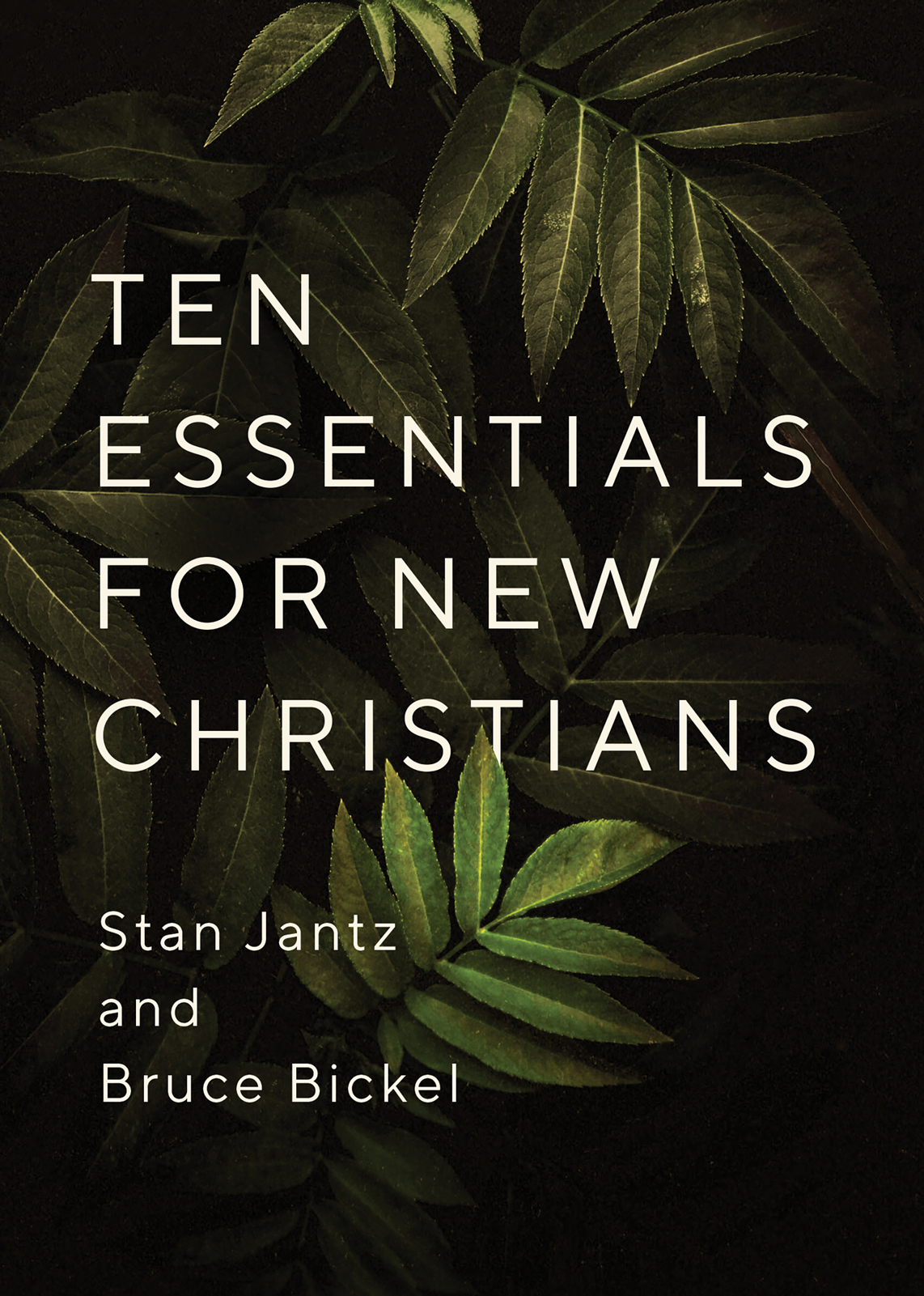
Read more in Ten Essentials for New Christians by Bruce Bickel and Stan Jantz

Read more in Ten Essentials for New Christians by Bruce Bickel and Stan Jantz
0 Comments Leave a Comment »
How to Prune Good Fruit: Trusting God’s Plan When It Feels Painful
Posted on Jan 23, 2024 Topic : Inspirational/Devotional, Men's Christian Living, Women's Christian Living
Posted by : Angela Correll

“What happened here?” Jess slows the car on a dusty gravel road. We are passing a vineyard in the heart of Italy and there are thousands of ripe grape clusters lying on the ground below the vines, row after row. He stops the car so we can take a closer look.
“Maybe they’re coming through later to gather them,” I say, and bend down to pick up a cluster. The grapes are perfect, plump, and full of juice. We garden and live on a farm and the idea of these grapes withering in the sun is hard to take. I can’t imagine letting any of my good produce go to waste.
We wave down two workers across the road, and between our broken Italian and their fragmented English, along with a good dose of sign language, they tell us that for every three clusters, a fourth is cut off, which results in the best quality of wine. We must know more, so we pull into the vineyard office and learn they cut the fruit one month before harvest, so the remaining clusters have more color and taste. This process yields an award-winning wine.
Jesus talked about pruning, but I never envisioned that meant the ripe fruit. The dead wood and even the green vines that trail off in unwanted directions, sure. But the actual fruit? I hope not, because something about that scene unsettles me.
Back at our apartment I look up the scripture and sure enough, the winery is onto something. Jesus said in John 15:2 “Every branch in me that does not bear fruit he takes away, and every branch that does bear fruit he prunes, that it may bear more fruit.” The fruit bearing vines do get pruned, and that may even mean after they’ve born fruit.
I think about my own life, and even the reason we are in Tuscany. It was partly so I could research and work on a book for a couple of weeks, but it was also because I was bone-tired, body, mind, and spirit. Weary with grief, overworked, pulled between an aging mother and other family members, and a looming fiftieth birthday.
Something in my life needs to change, but what and how? To cut the equivalent of good, beautiful, and tasty fruit must demand a great deal of courage.
If I approach my life like the garden, then it appears there are three steps to the pruning process.
--The first step is to clear out the deadwood. What are the things that are simply in the way of your growth and serve no good purpose at all?
--The second step is to snip those live vines and branches that are trailing off in directions that are not allowing the vine (you) to focus all your energy on producing fruit.
--The final step, and likely the most painful, is to cut some of the fruit so that what remains can be the best. In my experience, this seems overwhelming when viewed with all the deadwood and trailing vines still in place, but after step one and two, and with God’s help in discernment, the fruit that needs to be cut becomes clear.
Even then, it takes courage, but the sweet and best wine is worth it.
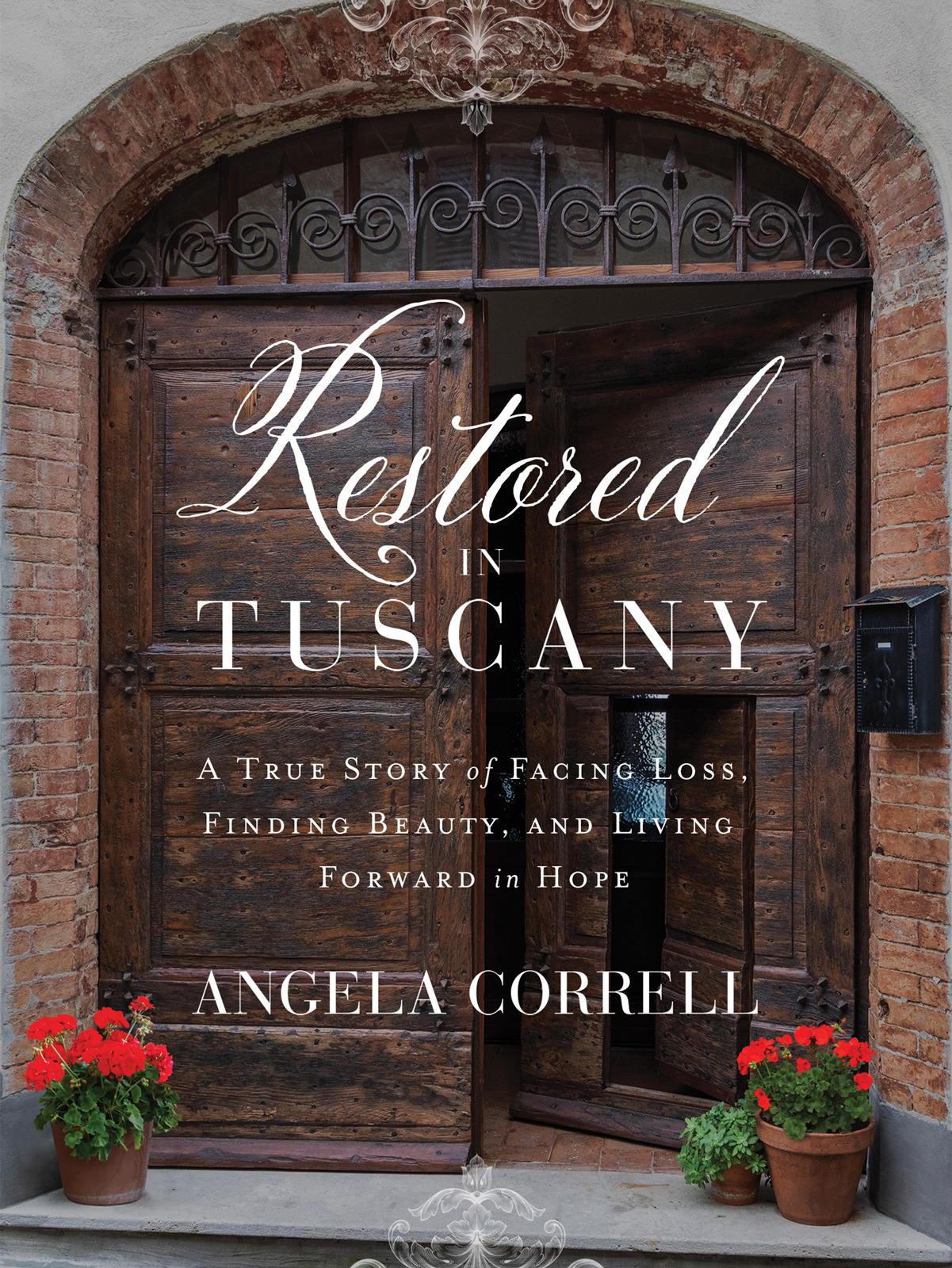
Read more in Restored in Tuscany by Angela Correll
0 Comments Leave a Comment »
What History Really Shows: Early Christian Perspectives on the Rapture
Posted on Jan 18, 2024 Topic : Men's Christian Living, Prophecy, Women's Christian Living
Posted by : Ron Rhodes

Increasing numbers of Christians today claim that the pretribulational view of the rapture—the view that the rapture will occur before the tribulation period—is a recent doctrinal development first formulated by John Nelson Darby in 1830. They claim that there is not even a hint of this view in Christian literature before that time. For them, a pretribulational rapture is a false expectation.
John Darby was indeed a popularizer of the pretribulational rapture. However, this view of the rapture long preceded his time. Here are some highlights from church history:
- Irenaeus was a disciple of Polycarp, who was himself a disciple of the Apostle John, the author of the Book of Revelation. Irenaeus was born around 130 AD and died around 202 AD. He wrote: “When in the end the Church shall be suddenly caught up from this, it is said, ‘There shall be tribulation such as has not been since the beginning, neither shall be.’” For Irenaeus, the tribulation period follows the catching up of the Church.
- The Apocalypse of Elijah is a third-century treatise on the end times which affirms that the purpose of the rapture is “specifically removal from the wrath of the antichrist and escape from the tribulation sent on the world by God in the last days.” [ii]
- Ephraem of Nisibis was born in 306 AD and died in 373 AD. He was a theologian in the early Eastern (Byzantine) Church. He wrote: “Count us worthy, Lord, of the rapture of the righteous, when they meet you the Master in the clouds, that we might not be tried by the bitter and inexorable judgment.” He declared: “All the saints and elect of God are gathered together before the tribulation, which is to come, and are taken to the Lord, in order that they may not see at any time the confusion which overwhelms the world because of our sins.” [iii] Ephraem predates the time of Darby by more than a thousand years.
- Other early examples include Caesarius of Arles and Aspringius of Beja, both of whom lived in the sixth century.
Let’s fast-forward to the seventeenth century and beyond:
- Ephraim Huit, the founder of the first church in Connecticut in 1639, believed that the “coming of the Son of Man in thee Cloudes” would save believers in Christ from “trials”… He affirmed that “the summoning of the Elect” will be “by the sound of a trumpet” and “heard only by the Elect.” [iv]
- Increase Mather (1639–1723) was a prominent Puritan minister in colonial New England. He became president of Harvard College in 1685. In 1701, he published a book that spoke of a pretribulational rapture: “When Christ comes, believers shall see the King…in all his glory and go with him to…Heaven…Christ assured believers it shall be thus, John 14:2…they will sit together with him in heavenly places…[later] they shall come down from Heaven…They shall be with him when he comes to Judge the World.” [v]
- Author Robert Maton, writing in 1642, referred to the rapture as the time when the “elect meete the Lord in the aire.” The wicked remain on earth to experience God’s wrath. [vi]
- John Gill was a famous Bible expositor who lived in the 1700s. In his commentary on 1 Thessalonians 4:15-17, Gill says Paul delivers a doctrine that is “something new and extraordinary.” He refers to the translation of the saints as “the rapture” and urges watchfulness because “it will be sudden, and unknown beforehand, and when least thought of and expected.” In Gill’s theology, believers will remain with the Lord in heaven until God’s judgment on the world is complete, and then they will return with Christ and reign with Him for 1,000 years during the millennial kingdom. [vii]
All of these Christian leaders far predated 1830, the year in which Darby is said to have formulated pretribulationism. Other pretribulational Christian leaders and writers who predated Darby include Peter Jurieu (1687), Philip Doddridge (1738), James Macknight (1763), and Thomas Scott (1792).
In light of the emerging and ever-expanding body of historical evidence, the so-called “recent emergence” of the pretribulational rapture should no longer be used as an argument against it. Christians who lived long before Darby’s time believed in and cherished this doctrine.
Of course, the more important question is: What does Scripture teach? It is here that our excitement builds, for many verses in the New Testament point to the pretribulational view. No matter what difficult circumstances I face in my life, the following verses never fail to bring comfort and solace to my soul:
- The church not appointed to wrath—1 Thessalonians 1:10; 5:9
- The church will be delivered from the coming time of trouble—Revelation 3:10
- The church will be caught up to the Lord, after which we will “always be with the Lord”—1 Thessalonians 4:13-17
- We will all be changed in the twinkling of an eye—1 Corinthians 15:50-52
- The rapture is our “blessed hope”—Titus 2:13
- Christ will take us to the place He has prepared in heaven—John 14:1-3
I can hardly wait!
Come soon Lord.
-----
Irenaeus, cited in William Watson, “The Rapture, Antichrist, and Rebirth of Israel in Medieval Manuscripts,” article posted at the Pretrib Research Center, https://www.pre-trib.org/dr-robert-thomas/message/the-rapture-antichrist-and-rebirth-of-israel-in-medieval-manuscripts/read.
[ii] Francis X. Gumerlock, “The Rapture in the Apocalypse of Elijah,” Bibliotheca Sacra (October-December, 2013), p. 422.
[iii] Ephraem of Nisibis, cited in The Harvest Handbook of Bible Prophecy, eds. Ed Hindson, Mark Hitchcock, and Tim LaHaye (Eugene, OR: Harvest House, 2020), Kindle edition.
[iv] William Watson, Dispensationalism Before Darby (Lampion House, 2015), pp. 141-142.
[v] Increase Mather, cited in Mark Hitchcock and Ed Hindson, Can We Still Believe in the Rapture? (Eugene, OR: Harvest House, 2018), Kindle edition.
[vi] Watson, Dispensationalism Before Darby, pp. 138-40.
[vii] John Gill, cited in Thomas Ice and Timothy Demy, When the Trumpet Sounds (Eugene, OR: Harvest House, 1995), p. 119.
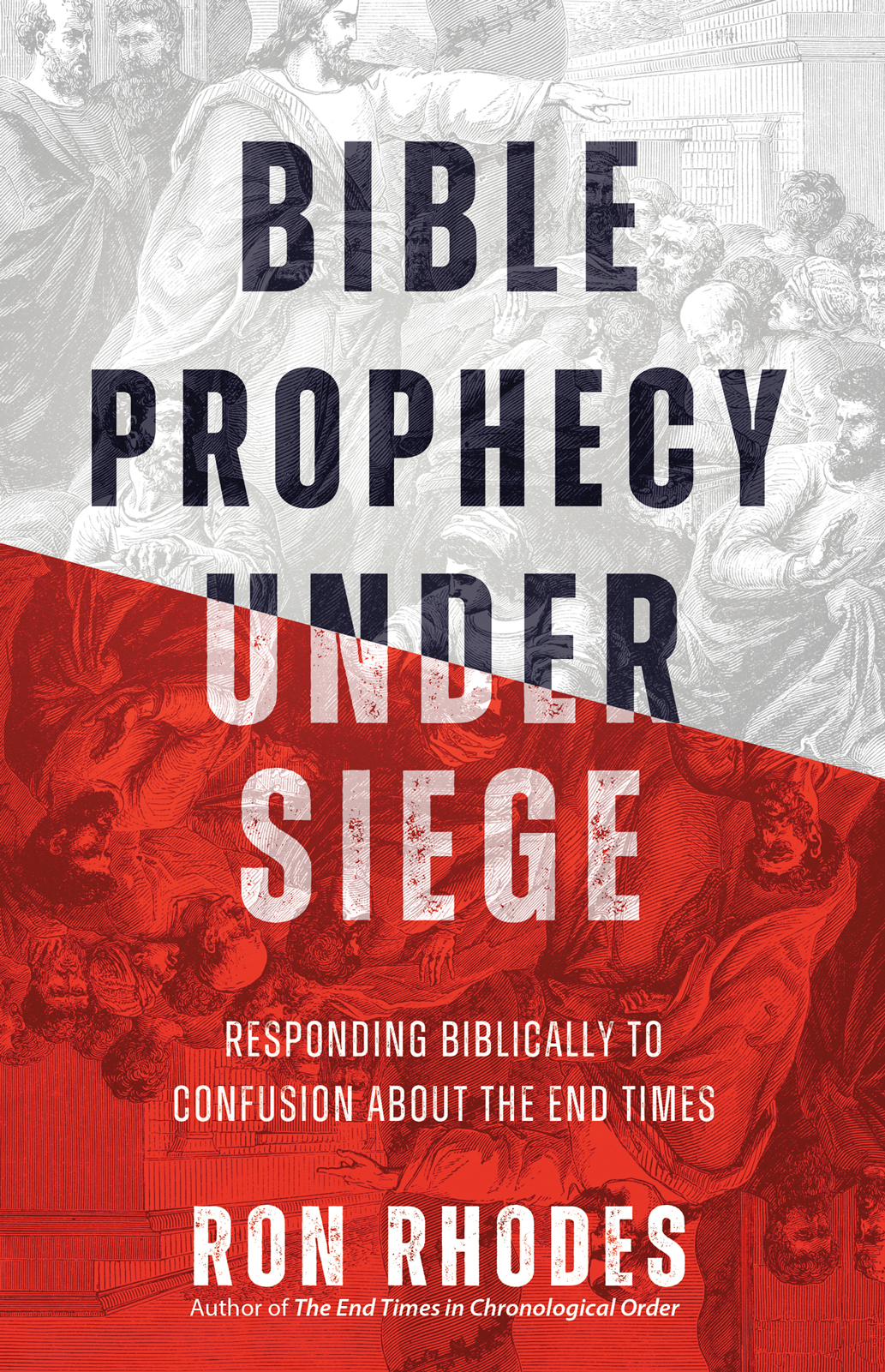
Read more in Bible Prophecy Under Siege by Ron Rhodes
0 Comments Leave a Comment »
Hope in Crisis: The Powerful Relevance of Bible Prophecy Today
Posted on Jan 11, 2024 Topic : Men's Christian Living, Prophecy, Women's Christian Living
Posted by : Jack Hibbs

What Are the Last Days?
Over the years, I have been asked by many news outlets and genuinely concerned seekers alike, “What are the last days?” I think it is awesome that whenever there is a significant world crisis, the church’s phones ring nonstop because people want to know what is happening. The callers on the other end ask, “Could it be that the beginning of the end is near?” or, “Is Armageddon right around the corner?” The world wants answers when things begin to shake both literally and figuratively.
Let me share a scripture that applies to every Christ-follower in the last days: “Sanctify the Lord God in your hearts, and always be ready to give a defense to everyone who asks you a reason for the hope that is in you, with meekness and fear” (1 Peter 3:15).
Here, and in other verses, it is clearly stated that God’s people need to be ready and able to give the answers that nonbelievers are seeking. That means it is incumbent that Christians know and understand what they believe and how that knowledge plays out in everyday life.
When we talk about the last days, you need to know that throughout the Bible, the concept of last days appears in a variety of ways: the end of times, the end of days, the last day, the latter times, the end of the age, or as 1 John 2:18 puts it, the last hour. Not all those terms speak about the exact same thing, but all of them refer to the conclusion of things, which includes the return of Jesus Christ and the establishment of His kingdom here on Earth.
The events we collectively call the last days are all part of what is called Bible prophecy or biblical eschatology. Bible prophecy is God writing the future in advance so that we can know what lies ahead. Many churches shy away from teaching prophecy out of biblical ignorance or because of the denomination they affiliate with, or because they think it’s going to generate fear. Whatever the reason, the refusal to teach prophecy is a shame. The Bible reveals details about the last days to alleviate the stress of wondering what is coming and to prepare us so that we will be ready.
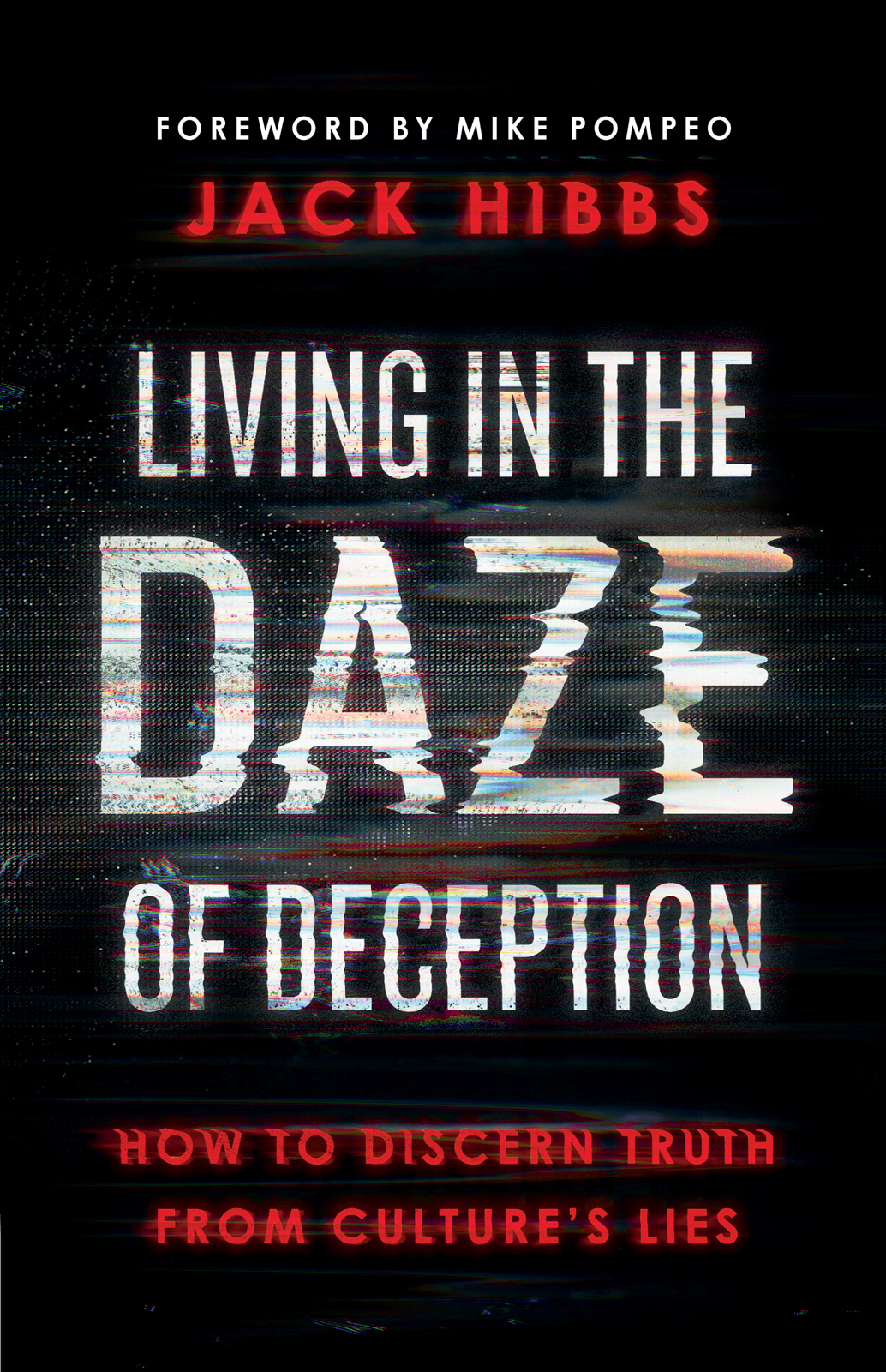
Read more in Living in the Daze of Deception by Jack Hibbs
0 Comments Leave a Comment »
How to Help Your Child Win the Battle for Self-Control
Posted on Jan 04, 2024 Topic : Men's Christian Living, Women's Christian Living
Posted by : Costi and Christyne Hinn

Just like our kids, we parents face temptations every day in our battle for self-control. And no matter how hard we try, we will never be able to eradicate our unhelpful behavior until Jesus changes our hearts. Sheer willpower will take us only so far. We might think, "Look! I did it! I have finally overcome my issues with self-control" . . . only to find ourselves falling down the slippery slope all over again.
As you seek to help your child grow in self-control, remind them that they are not alone. When we are honest about this issue, it’s clear that we all need help every single day. Thankfully, the same King of kings who helped Ira can help us too. Here are three steps you can take as you lead your kids on the journey toward more self-control.
1. Aim for heart transformation, not just behavior modification.
Every parent has tried telling their children, “Just stop it!” But if we want to see lasting change in our kids’ behavior, we must point them to Jesus. When He changes our kids’ hearts, their behavior will follow. When the root of their life is transformed, they will bear good fruit that will last. Don’t settle for behavior modification—introduce them to the gospel and ask the Lord for heart transformation!
Pray Ezekiel 36:26 over your kids: “I will give you a new heart, and a new spirit I will put within you. And I will remove the heart of stone from your flesh and give you a heart of flesh.”
2. Talk with your kids about their sin—and yours.
Here are two key truths to remember when talking with your kids about sin. First, remember that everyone needs help when it comes to sin. Your kids don’t always know why they do what they do. Teach them the bad news about their struggle with sin (Romans 3:23; 6:23; Ephesians 2:1) so they can appreciate the good news of the gospel and the help it provides (Luke 19:10; Romans 3:24-26; Ephesians 2:4-9). Second, remember that your kids are brilliant and can spot a phony from a mile away. One of the best ways to help your kids understand sin is to get honest about your own status as a sinner. Your life is the most important example your kids will ever see and the most important “sermon” they’ll ever hear. We are not just to teach the gospel to our kids and enforce rigid rules. Instead, we are to model the gospel and live out God’s ways. This means being parents who repent of sin, ask for forgiveness, and walk in the obedience we talk about with our kids (Ephesians 6:1).
Practice 1 John 1:9 with your kids: “If we confess our sins, he is faithful and just to forgive us our sins and to cleanse us from all unrighteousness.”
3. Seek out accountability and support from a mature Christian in your church.
At our church we often say, “There is no such thing as Lone Ranger Christianity.” We are better together, and God has designed us for community. Accountability is a huge part of being a disciple of Jesus (Galatians 6:1-3). Teaching your kids how to be more self-controlled starts with you becoming more self-controlled. You can supercharge your parenting by being with Christian parents who inspire you to grow.
Memorize Proverbs 13:20 with your kids: “Whoever walks with the wise becomes wise, but the companion of fools will suffer harm.”
We pray these steps to helping your kids gain self-control will spark conversations in your home today and in the years to come! Take the next step confidently. Jesus will finish what He has started in you (Philippians 1:6).
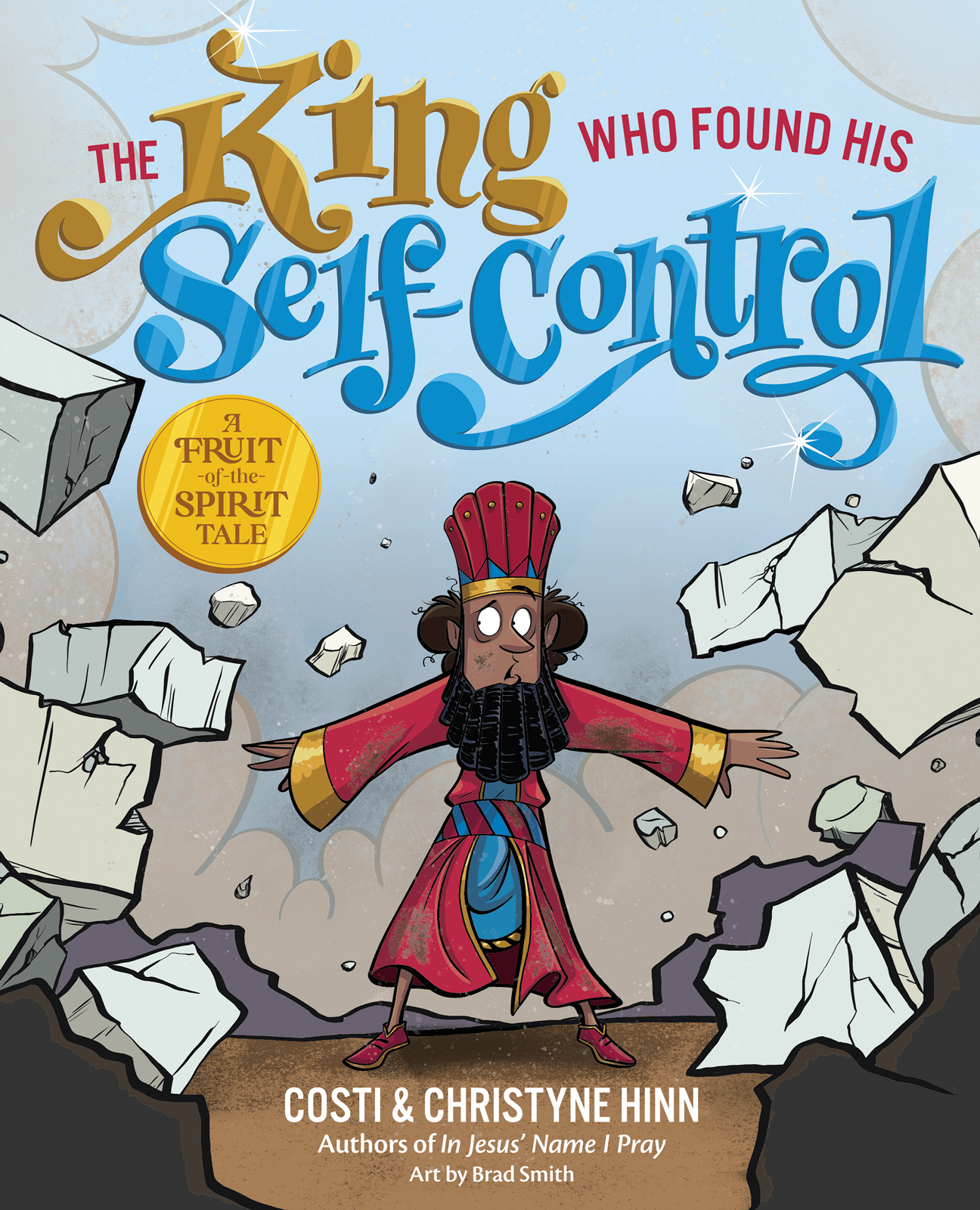
Read more in The King Who Found His Self-Control by Costi and Christyne Hinn
0 Comments Leave a Comment »
6 Ways to Put the New in Your New Year
Posted on Dec 28, 2023 Topic : Inspirational/Devotional, Men's Christian Living, Women's Christian Living
Posted by : Hope Lyda

Do you experience joyful anticipation as you swap calendars? Are you hopeful that the next 365 days will be so much more ________________(adventurous, purposeful, successful, sane, prayerful, meaningful…) than the previous batch?
I do. I am. And then I promptly load most days with last year’s procrastinations and activities I committed to during a carefree day in June, no doubt. Voila, my life at-a-glance is looking strangely familiar. Out with the old and in with the new, right? My impulse is to shout YES to this invitation! Yet, not one of those calendar squares indicates that I’m selling my house and buying a villa in Italy.
Changing Our View of New
If we believe in the One who “makes all things new,” let’s release the idea that only through complete elimination of something is a new something able to emerge. Let’s welcome ways to be renewed, restored, and transformed in the life we’re living. No need to eradicate, quit, move, or win the lottery and then move to Italy (though dreaming is still allowed!) Transformation can begin in subtle ways and gradually let light enter our days and possibility enter our thoughts and hearts.
Here are six simple ways to put the new in your new year.
1. Refresh your spirit and mind with a daily practice
Choose a regular activity or ritual that will breathe new life into your days and year. Take that literally and do ten minutes of deep breathing upon waking. Consider a creative practice that will inspire ideas, solutions, and new ways of expression:
* Draw a sketch each afternoon
* Sing a prayer of praise before breakfast
* Write unedited responses to creative prompts every day
2. Reenergize your conversations
Ask open-ended questions that ignite new lines of dialogue. Allow genuine creative exchanges to unfold as you infuse your communication with earnest curiosity. Ask your spouse to describe their happy place. Sit with your teenager and welcome a discussion about their view of world events or the one change they hope to make in their lives in the next 365 days.
3. Return to the joy of a former hobby
What activity used to captivate and refresh you? Did you collected crescent-shaped rocks, paint abstract landscapes, write novels, hunt with your cousins, browse the farmer’s market for your week’s produce. Maybe you enjoyed the fellowship of a Bible study, running team, or reading group. Give that old interest a new shine and a new place in your current life.
4. Revamp a routine
Ruts. Routines. Potato, Potatoe. Take inventory of your defaults with a willingness to modify. Choose one to shake up for a pay off in more intention and in happy surprises. Change the route you walk your dog. Attend a different service at your church. Trade out your backpack or purse and prioritize what you carry. Use a different form of transportation to get to and from work. Choose a local coffee shop for your mid-day treat instead of the chain you frequent. Dare I suggest a mint tea instead of coffee?
5. Reserve space on your calendar for surprises
Let a philosophical debate begin: Can you plan a surprise? I vote yes. You can plan for a surprise. Before your phone calendar is filled with have-to’s, set aside a couple random windows of time that are reserved for whatever arises. Decide in the moment what you might do. Tour a historical building in your town, go to a theater or museum you’ve never visited, do a photography scavenger hunt, take a drive to a hilltop park and bring your new creative practice along to sketch, draw, or respond to a writing prompt while you savor a broader vista.
6. Notice what God is doing
This is last because it is the best action to lead you into your 2020 with hope. Embrace, memorize, and cling to these words for your personal year of wonder:
Forget the former things; do not dwell on the past. See, I am doing a new thing!
Isaiah 43:18

Read more in My Unedited Writing Year by Hope Lyda
0 Comments Leave a Comment »
8 Essential Foods You Should Be Storing at Home Right Now
Posted on Dec 21, 2023 Topic : Men's Christian Living, Women's Christian Living
Posted by : Melissa K. Norris

A well-stocked pantry in your dry storage, fridge, and freezer will not only be a blessing during hardships or emergencies, it will help reduce the temptation to spend more during each shopping trip on those items you tend to add to your cart whether you need them or not. When you are intentional about having extra supplies on hand, you can breeze right by those items and shelves and only buy from the planned list you have in hand.
Eight Foods to Store at Home
While having a well-stocked pantry is smart, there are some items we should always have at the ready when the need arises. Having a stocked deep freezer doesn’t do one any good if the power goes out for an extended period of time and all of that food is lost. Our goal is to have close to a year’s supply of our main staples on hand. These are the eight foods I believe you should be storing. I don’t include fruits and vegetables, as most of us can grow or harvest these at home or close to our homes.
1. Salt
Salt can be used to preserve food as well as flavor dishes. I put salt at the top of the list because most of us don’t have a way to get salt where we live, except at the store. We can all grow our own herbs, but most people do not have a naturally occurring salt source in the vicinity of their home. Store salt in a dry area, as moisture will make it cake together. If this happens, you can spread it out on a rimmed baking sheet lined with parchment paper. Depending on the time of year and your climate, you can use a warm sunny windowsill, or for those of us who live where sunlight can be scarce, preheat your oven to 250°F. Place the salt in the oven and then turn off the oven. Leave it in for 10 minutes, stir, and place it back in if needed.
2. Fat
Fruits and vegetables are part of a well-balanced diet, but our bodies require a certain amount of fat in order to function. We need fat for cooking and baking. I use butter, lard, coconut oil, and olive oil. Keep your fat source out of the heat and light. I put extra butter and lard in the freezer.
3. Wheat berries
You’ll see flour on lots of food storage lists, but quite frankly, flour is not meant for long-term storage. It will go rancid and can also be a home for pests. Wheat berries and other forms of grain will store for years. Not only can they be ground into flour, but they can also be soaked and cooked into a cereal. We use about 100 pounds of wheat berries a year. I use hard white wheat and spelt as our primary type of wheat berries. Store wheat berries in a cool and dry location.
4. Honey
Honey is a nonperishable food. Raw honey is excellent for eating, cooking, and medicinal purposes. You can make a ginger-infused honey for medicinal purposes during cold and flu season. Honey is also excellent for baking. If honey hardens or forms crystals, simply place the container in hot water. Plus, honey just plain tastes good. I love to swirl it in my coffee. Store honey out of direct sunlight.
5. Sugar
Sugar is needed in baking and also in canning homemade jams and jellies. However, I don’t use regular processed white sugar. I use organic evaporated cane sugar, and all my jam and jelly recipes in this book use about a quarter of the sugar most recipes call for. Store sugar in a dry place in a pest-proof container.
6. Dried beans
Dried beans are not only inexpensive and easy to store, but they have huge nutritional value. Beans can be used in multiple dishes and should be stored in a dark, cool, and dry place.
7. Oatmeal
Oatmeal is inexpensive and can be used for cereal, in baked goods, or even ground up into flour. It contains fiber and is easy to flavor with seasonal fruits and spices. We have oatmeal for breakfast at least once a week, if not more. Oatmeal is excellent with just cinnamon, a pat of butter, and a smidgen of sugar. We add peaches, blueberries, raisins, and other fruits as they come into season. Store oatmeal in a dry place.
8. Coffee
Most of us do not have a source of coffee available to us other than purchasing it. If you’re a tea drinker, then stock up on your teas. But I am a coffee lover. While we could live without coffee, I’d rather have it on hand. Does anyone else just open the canister of coffee and take a big whiff? Whole coffee beans will store much longer than ground coffee and should be stored in a dry and dark area.

Read more in The Made-from-Scratch Life by Melissa K. Norris
0 Comments Leave a Comment »
Navigating Perilous Times with Faith: Unveiling the Stability Found in Knowing God
Posted on Dec 19, 2023 Topic : Men's Christian Living, Prophecy, Women's Christian Living
Posted by : Barry Stagner

At time where the world is spiraling out of control and evil and good have exchanged definitions, truth has become a personal choice rather than universal fact. At a time where we are hearing threats of World War III and hundreds of thousands around the world are marching in solidarity against the nation of Israel and God’s chosen people, it is easy to fall into fear.
This is what we need to remember when fear tries to creep in and rule our minds and emotions:
“For God has not given us a spirit of fear, but of power and of love and of a sound mind”. —2 Timothy 1:7
What a great and glorious truth this is! We could well understand this as Satan trying to impose his will on us and God giving us superior weapons to combat him. This reminds us of a couple of great truths.
First, we are going to encounter fearful situations in life, yet even then the feeling of fear is not from God. In a word, we could say thatknowing God offers us stability at all times and in all situations—including the perilous times in which we now live.
Second, God does allow us to encounter situations that might cause our flesh to fear or worry, but His provision in those situations is not fear, but rather fear’s antithesis—power, love, and a sound mind. The circumstances that challenge them are often the tactics of the enemy seeking to impose his will on our lives.
Satan loves to exploit our vulnerabilities and weakness and seeks to take life’s trials and troubles and turn them into doubts and despair. Our weapon against this is the very Spirit that is within us. “He who is in you is greater than he who is in the world.”—1 John 4:4b
Christians have the distinct advantage, even in the most perilous of times, of having the Holy Spirit within them. The Spirit is in us and is greater than the one who only comes to steal, kill and destroy. We have within us the same Spirit that raised Christ from the dead, the same Spirit gave birth to the church at Pentecost, the same Spirit who inspired the written word of God. This is the same Spirit, according to Ephesians 1:13, whose presence within us is the guarantee of our future inheritance in heaven.
Paul indicates that the fear he is speaking of is spiritual. There is nothing wrong with being afraid of a lion, a tiger, or a bear (oh my!); fear of this sort is natural and even healthy. But fear in the realm of the spirit is not from God. Through Him, we can approach the unknown outcomes of life with power, love, and a sound mind. In other words, God has given us the ability not to freak out!
This doesn’t mean we won’t have concerns—even deep ones—or that we move through life as unfeeling, emotionless blobs. But Paul is saying here that you and I, as Christians, possess a God-supplied ability to meet fearful situations with His power and, because of His love, with a mental stability not available to those who face crisis or difficulty alone.
So when fear creeps in, remember, it’s not from God. He has given you power, love, and a sound mind, no matter what you may be facing or are called to endure!
There are no times, seasons or situations in life or the world where this is not true, including the times we are living in today.

Read more in The Time of the Signs by Barry Stagner
0 Comments Leave a Comment »
Why Your Child Needs to Know About the Bible as Early as Possible
Posted on Dec 14, 2023 Topic : Men's Christian Living, Women's Christian Living
Posted by : Rebecca Lutzer
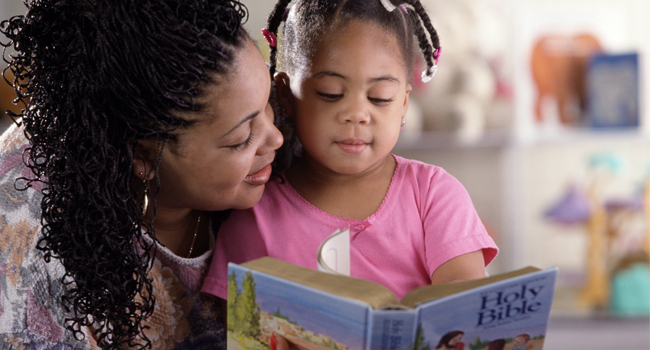
The Bible is like a huge treasure chest, full of knowledge and profound, wonderful truths. Many people hesitate to read it because they think they won’t be able to understand it. Simply put, the Bible tells us about God, that He created us, how we should behave, and how we can please Him. It teaches us what is right and what is wrong, and reveals that everyone is born a sinner and needs God’s forgiveness. It tells us many things we otherwise wouldn’t know.
It is very important to introduce children to the Bible at a young age. In 2 Timothy 3:15 the apostle Paul affirms that Timothy became acquainted “with the sacred writings” from childhood which made him wise for salvation through faith in Jesus Christ. As a young boy, he was taught by his mother and grandmother who had strong faith in the scriptures. That faith was communicated to Timothy and became his own. He then passed along what he learned to others.
We find the story of Jesus acknowledging and welcoming the children in Mark 10:13-16, “ ‘Let the children come to me; do not hinder them, for to such belongs the kingdom of God.’ And he took them in his arms and blessed them, laying his hands on them.” As parents and grandparents, we have a sacred and profound responsibility to teach the doctrines and stories of the Bible to children of all ages. Through books accurately and age appropriately written and beautifully illustrated, we can introduce them to God’s Word. We must teach them who God is, that He made them and loves them, and that He wrote us a book of instructions on how to live.
The Bible is the only book where the author is present every time you read it!
Hebrews 4:12 tells us what the Bible is like:
- It is alive and active, filled with power and life.
- It is sharper than a double-edged sword, reaching down into our soul and spirit.
- It judges the thoughts and attitudes of our hearts, helping us to believe and obey its teaching.
These words should not frighten us from reading and studying the Bible, but rather draw us to it. They reveal that God knows us better than any other person, and even better than we can know ourselves. It tells us that we are sinners because we have broken God’s laws. Through its many chapters and pages, God reveals His Son Jesus Christ who came to the earth to die for our sins and be our Savior. It shows us His amazing grace and mercy.
God’s words, instructions, and promises give us guidance and hope to live righteously in an evil world and confusing culture. The word of God is called the sword of the Spirit as part of the armor of God that we put on to defeat the power of the devil. That’s why studying the Bible, meditating on it, and memorizing it are so important. It convicts, converts, corrects, cleanses, changes, counsels, and comforts us. It is everything we need to live a life pleasing to God.
Psalms 119:11 says, “I have stored up your word in my heart, that I might not sin against you.” Committing Scripture verses to memory fills our minds and hearts with powerful words that will help us overcome temptation, enable us to develop a biblical world view, guard our minds against Satan’s lies, and bring us peace and comfort in times of hardship, suffering, and grief.
Children must learn from adults to love the Bible. They need to see that it gives us strength to face each day no matter what is going on in our lives. We should consider the Bible our most valuable possession, precious and beloved. It is a treasure of truth, a haven of hope, a cup of comfort, a gift of grace, a place of peace, a shelter of strength, a potpourri of promises, a refuge of righteousness, and reveals the limitless love of God.
The Bible is for everyone at any age. Let us bring the children to Jesus by teaching them its words and truths.
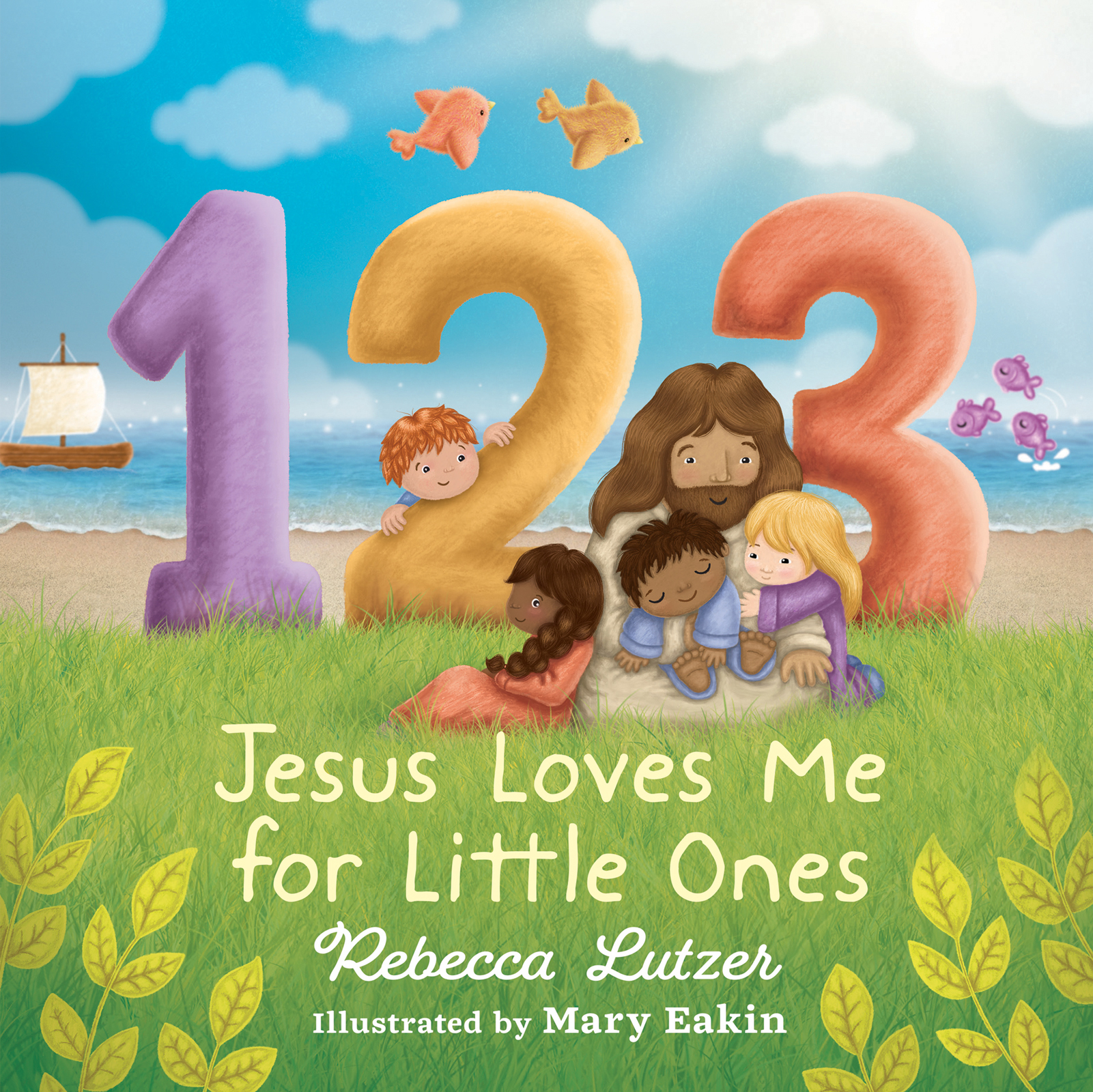
Read more in 123 Jesus Loves Me for Little Ones by Rebecca Lutzer
0 Comments Leave a Comment »
What’s the Best Way to Share the Truth of Christianity?
Posted on Dec 12, 2023 Topic : Inspirational/Devotional, Men's Christian Living, Women's Christian Living
Posted by : Josh McDowell and Sean McDowell

Nearly 20 centuries ago, a high government official, trained in politics and the law, asked a question that has echoed all the way into the twenty-first century.
Imagine Pontius Pilate, then the Roman governor of Judea, standing in his elaborate palace, magisterially bedecked. He posed a set of serious questions to the man who stood shackled between two soldiers.
“Are you the King of the Jews?” Pilate asked. The prisoner was accused of sedition.
This prisoner, unlike most, stood straight in the presence of the governor and looked him in the eyes as he spoke. “I am not an earthly king...My kingdom is not of this world.”
“You are a king then?” the governor said.
“You say that I am a king,” the prisoner answered, aware his interrogator was in a prickly political position, “and you are right.” He looked at the politician with eyes that seemed to read not only his face but his soul. “I was born for that purpose,” he continued, “and I came to bring truth to the world. All who love the truth recognize what I say is true.”
Pilate responded, “What is truth?”
Imagine for a moment you are in that hall with Pilate and his prisoner. Imagine the words of the governor’s question echoing off the marbled walls. Imagine the expression on Pilate’s face as he posed the question, scornful at first, then turning serious when the answer did not come quickly.
Imagine the governor’s thoughts: Who is this man? Why does he gaze at me so? And the prisoner’s thoughts: Have I not just told you? I came to bring truth to the world. Pilate, you are looking at the answer to your own question: I am the truth.*
TRUTH IN RELATIONSHIP
On that day in his Jerusalem palace when he met Jesus, Pilate was not merely discussing the truth; he was literally looking at it. Truth was standing before him, clothed in human flesh! Just days earlier, Jesus had told his disciple Philip,
“I am the way, the truth, and the life” (John 14:6). He was saying truth is a person to relate to, “the way” is a person to interact with and follow, and he is the only true source of life. Truth, a way of living, and life itself is embodied in the person of God. And the means to obtain the truth, the way, and the life is through a relationship with Jesus.
To explain or present a biblical worldview and the truths of the faith outside of relationship is to distort and invite error into Christianity. Jesus wasn’t simply trying to correct the theology of the Jewish leaders with his teachings. Neither was he launching a new philosophy of the Jewish religion. He was offering a way to restore God’s original design for a world gone mad. He was offering the means to restore the God-human relationship that had been broken by sin. Relationship was key. And it still is.
A number of years ago Dartmouth Medical School commissioned a scientific study of young people. The project, which was called “Hardwired to Connect,” analyzed the results of more than 260 studies of youth. The report stated that 100 percent of all the studies they analyzed showed that from the moment a baby is born, his or her brain is physically, biologically, and chemically hardwired to connect with others in relationships.** That shouldn’t surprise us, since we were created in the image of a relational God for the purpose of relationships. In fact, the healthier we are relationally, the more receptive we will be to God’s relational truth.
It stands to reason that if truth is intrinsically relational in nature and we experience struggles or dysfunctions in our relational life, it will be more difficult to receive the truth. But the other side of this coin is that receiving the truth in all its relational meaning can overcome the problems in our relationships. Truth not only points out our wrong and corrects us; it brings relational healing as well, because truth is a person who lovingly cares for us.
-----
Sources
* Adapted from Josh McDowell, Bob Hostetler, and David H. Bellis, Beyond Belief to Convictions (Wheaton, IL: Tyndale House Publishers, 2002), 52-53.
** “Hardwired to Connect: The New Scientific Case for Authoritative Communities,” The Commission on Children at Risk, 2003.
0 Comments Leave a Comment »
Empowering Your Marriage: 3 Powerful Prayers for Your Husband
Posted on Dec 07, 2023 Topic : Inspirational/Devotional, Women's Christian Living
Posted by : Stormie Omartian

Excerpted from the Introduction to The Power of a Praying Wife Book of Prayers by Stormie Omartian.
When I wrote the book The Power of a Praying Wife, I received countless letters filled with testimonies of restored marriages and changed lives. I was deeply touched by the hearts of women who were willing to do anything to see their marriages become all God wanted them to be. Included in many of the letters were requests to have the prayers in this book made available separately.
In the midst of our busy lives, it’s often hard to know how to pray beyond the immediate or urgent. That’s why praying from this book will set your mind at peace, knowing that when you have prayed each prayer, you will have covered your husband and your marriage thoroughly. Not only will he be blessed, but the rewards will be great for you, too. There are blessings that will come to you from God simply because you are praying.
Don’t be overwhelmed by the many ways there are to pray for your husband. You don’t have to do it all in one day, one week, or even one month. Just pick a prayer, any prayer, and let the Holy Spirit lead you from there. And don’t worry about the answers. As long as you look to God as the source of all you want to see happen in your husband and your marriage, you don’t have to be concerned about how it will happen. It’s your job to pray. It’s God’s work to answer. Leave it in His hands.
– Stormie Omartian –
Here are three prayers from the book to get you started!
His Wife
Lord, help me to be a good wife. I fully realize that I don’t have what it takes to be one without Your help.
Take my selfishness, impatience, and irritability and turn them into kindness, longsuffering, and the willingness to bear all things.
Take my old emotional habits, mind-sets, automatic reactions, rude assumptions, and self- protectiveness, and make me patient, kind, good, faithful, gentle, and self-controlled.
Take the hardness of my heart and break down the walls with Your battering ram of revelation. Give me a new heart and work in me Your love, peace, and joy (Galatians 5:22-23). I am not able to rise above who I am at this moment. Only You can transform me.
In Jesus’ name I pray.
Whatever things you ask when you pray, believe that you receive them, and you will have them. And whenever you stand praying, if you have anything against anyone, forgive him, that your Father in heaven may also forgive you your trespasses. Mark 11:24-25
His Choices
Lord, fill my husband with the fear of the Lord and give him wisdom for every decision he makes. May he reverence You and Your ways and seek to know Your truth. Give him discernment to make decisions based on Your revelation. Help him to make godly choices and keep him from doing anything foolish.
I pray that he will listen to godly counselors and not be a man who is unteachable. Instruct him even as he is sleeping (Psalm 16:7), and in the morning, I pray he will do what’s right rather than follow the leading of his own flesh. May he not buy into the foolishness of this world, but keep his eyes on You and have ears to hear Your voice.
In Jesus’ name I pray.
A wise man will hear and increase learning, and a man of understanding will attain wise counsel. Proverbs 1:5
His Past
Lord, I pray that wherever my husband has experienced rejection in his past, he would not allow that to color what he sees and hears now. Pour forgiveness into his heart so that bitterness, resentment, revenge, and unforgiveness will have no place there. May he regard the past as only a history lesson and not a guide for his daily life.
Wherever his past has become an unpleasant memory, I pray You would redeem it and bring life out of it. Bind up his wounds (Psalm 147:3). Restore his soul (Psalm 23:3).
Help him to release the past so that he will not live in it, but learn from it, break out of it, and move into the future You have for him.
In Jesus’ name I pray.
Do not remember the former things, nor consider the things of old. Behold, I will do a new thing, now it shall spring forth; shall you not know it? I will even make a road in the wilderness and rivers in the desert. Isaiah 43:18-19
-----
For more prayers like these, check out Stormie Omartian’s The Power of a Praying Wife Book of Prayers, available now.

Read more in The Power of a Praying Wife Book of Prayers by Stormie Omartian
0 Comments Leave a Comment »
Revelation’s Message of Freedom: A Call to Listen to the Spirit
Posted on Dec 05, 2023 Topic : Inspirational/Devotional, Men's Christian Living, Women's Christian Living
Posted by : Tony Evans

The annual Independence Day celebration in our nation ushers in a time of rest, enjoyment, great food, and even greater displays of fireworks. But let’s focus on another type of independence—what I call spiritual independence. If you have named Christ as your one and only God and Savior, you have declared independence from the rule of sin and Satan over your life. You’ve been set free. As Colossians 1:13 tells us, “[God] rescued us from the domain of darkness, and transferred us to the kingdom of His beloved Son.”
Having gained spiritual independence from the rule of Satan, you may be wondering why, then, it often feels like you’re still in a battle. Just like the British didn’t allow its American colonies to secure their freedom simply by asking for it or letting them just declare it, Satan is not about to let you go without putting up his opposition. He knows that if he lets you out from under his influence, you become dangerous to his agenda. Instead of his telling you what to do, you’ll be telling him what you’re going to do.
That doesn’t sit well with Satan at all. Even though Jesus has legally, under His law, set you free from the reign of sin in your life, the devil doesn’t want you to be experientially set free. It’s one thing to have the status of freedom; it’s another thing entirely to experience it. But the truth in God’s Word can help you walk into the full realization and experience of spiritual freedom.
In the book of Revelation, the apostle John tells us how Jesus sent a message to each of the seven churches of Asia Minor, addressing this concept of complete spiritual freedom in multiple ways, and this begins with learning to hear.
WHAT IT MEANS TO HEAR
Seven times Christ says the same exact thing to these churches: “He who has an ear, let him hear what the Spirit says.” Every one of His messages—although each is addressed to a different group with a different set of problems—boils down to this same solution. Jesus suggests that it’s possible to have an ear and not hear. It’s possible to read and study the Word and still not receive and understand the truth. He’s saying that whoever has the capacity to receive the data ought to heed and apply it rather than just acknowledge it. Because hearing with the ear has as its goal the heeding and application of the truth.
We’ve all talked to people who hear our words yet don’t hear our message. Jesus is saying to the person who has an external ear, “Hear the internal message of what the Spirit of God is saying.” The church is made up of individual people, and so although Jesus has one message for the whole congregation, it’s also for each person who has an ear. In other words, each individual must decide whether they’ll personally pay attention to the message—really hear it—allowing the Holy Spirit to speak to them directly.
Attending church services or even a small group won’t get the truth of God deep within your spirit. Only when you choose to really hear and apply His truth will the fruit of it—the ability to overcome—be made manifest in your life. It’s this ability that moves you from “We shall overcome,” the statement often heard during the height of the civil rights movement, to “We have overcome,” the truth of God’s Word for believers.
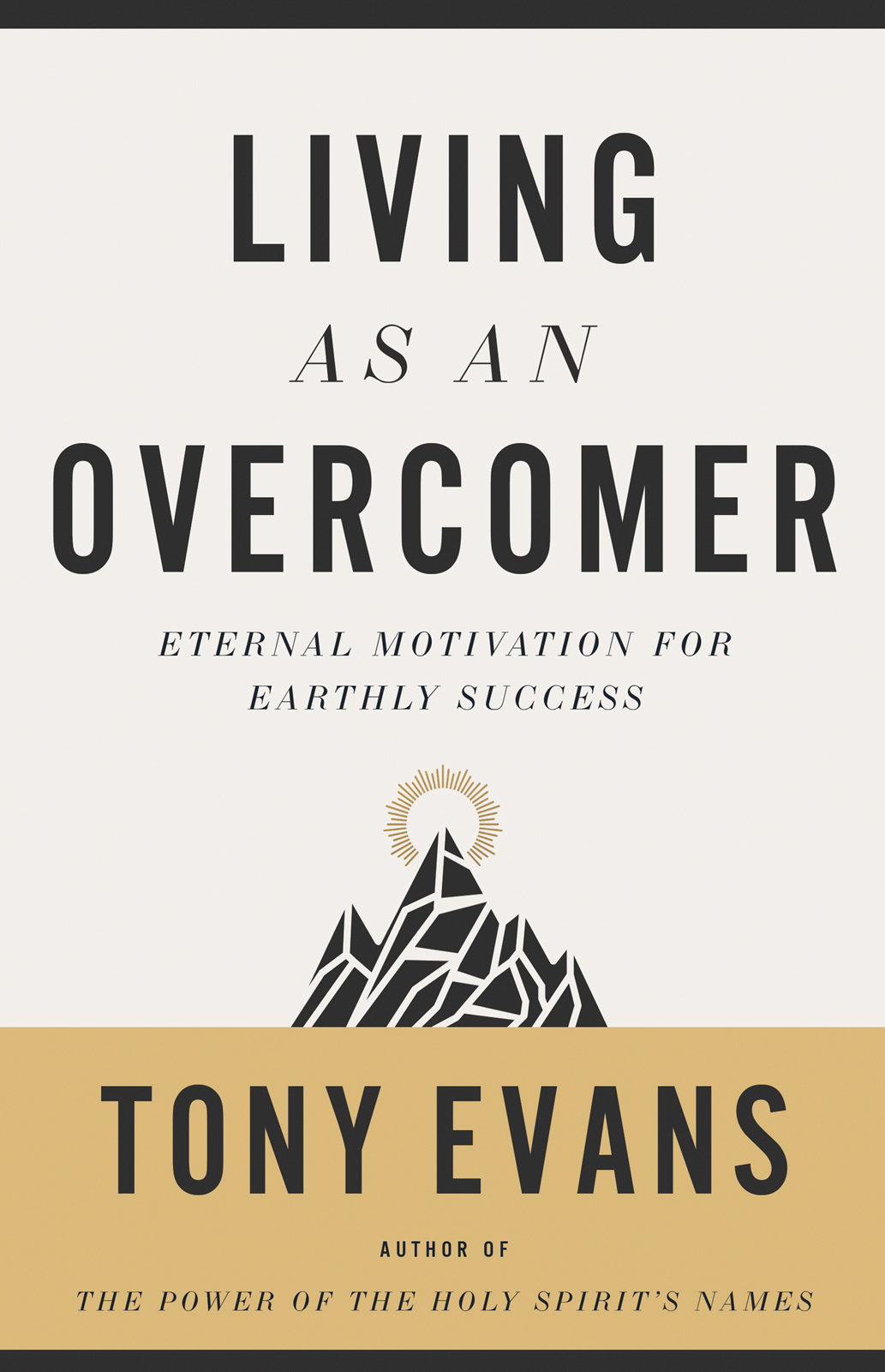
Read more in Living as an Overcomer by Tony Evans
0 Comments Leave a Comment »
This Christmas Season, Will You Open All Your Good Gifts from God?
Posted on Nov 30, 2023 Topic : Inspirational/Devotional, Men's Christian Living, Women's Christian Living
Posted by : Lloyd John Ogilvie

He came to His own, and His own did not receive Him. (John 1:11)
Many people spend the month of December buying, wrapping, decorating, and preparing for the festivities of the holidays but are not ready for a transforming Christmas, nor free to experience its real impact for all of life.
My greatest concern is that it won’t make any difference, that we will go back to the same old life as the same people as we were when it all began. It’s possible to celebrate Christmas and miss Christmas!
Imagine a time around the Christmas tree in which you opened all your presents except those from one particular person. Feel the hurt of that rejection. Look at it from God’s point of view. What do you think He wants to give you? Picture Him waiting for you to open and enjoy His gift.
I can remember when I was a boy how my mounting excitement in the days before Christmas was heightened by any present marked “Do not open until Christmas!” When I thought no one was watching, I would crawl under the Christmas tree, squeeze and shake the carefully wrapped presents, and imagine that what was inside was my heart’s desire. Then, on Christmas Eve, I would go to bed to dream with excitement about what I was sure I would find the next morning when I opened my presents.
The gift I want to share with you during the days leading up to Christmas is marked a bit differently. The tag has your name on it. It says, “To be opened in preparation for Christmas and enjoyed all through the year!” The heart of Christmas is the heart. God’s heart in Christ offered to you and me.
The most tragic thing which could happen is to go through the Christmas season and never open and accept the gifts of love, joy, hope, and peace which flow from His heart to ours. Let's plan to have a heart-to-heart Christmas this year!

Read more in God's Best for My Life by Lloyd John Ogilvie
0 Comments Leave a Comment »
Find the Perfect Gift for Everyone On Your List
Posted on Nov 16, 2023 Topic : Inspirational/Devotional, Men's Christian Living, Prophecy, Women's Christian Living

The holiday shopping countdown has begun! Whether you’re looking for stocking stuffers or shopping for your little ones, big kids, friends, or family members, books make great gifts for everyone.
Here at Harvest House Publishers, we’ve gathered together our go-to gifts for everyone on your list. Check out our Christmas Gift Guide for books that are sure to bring you hope and light this holiday season.
Bible Infographics for Kids Activity Book | Bible Infographics for Kids Epic Guide to Jesus | The Most Special Christmas Night | The Good News of Christmas | The Complete Illustrated Children’s Bible | Like Me | Psalm 23 | Today I Feel like a Jelly Donut | Brave Animal Stories for Kids | Twirl
Emmanuel | Teatime Discipleship | Sacred Seasons | Every Day New | Milk and Honey | KJV Devotional in the Morning and in the Evening | First Light and Eventide | Awaiting the Manger | One Day Nearer | Rediscovering Israel
Pilgrim | Beholding and Becoming | Foundations | He Is Strong | Risen Motherhood | M Is for Mama | Hard Is Not the Same Thing as Bad | The Power of a Praying Wife | A Home in Bloom | Teatime Discipleship for Mothers and Daughters
Dad Tired and Loving It | The Dad Tired Q&A Mixtape | Kingdom Purpose | A Look at Life from the Fairway | KJV Devotional for Men | Dock Tok Presents…The Good, the Dad, and the Punny | Out of the Far North | The Power of a Praying Husband | Understanding and Trusting Our Great God | Transformed by the Trinity
0 Comments Leave a Comment »
Will You Release Your Daily Burdens to God and Experience True Freedom?
Posted on Nov 16, 2023 Topic : Inspirational/Devotional, Men's Christian Living, Women's Christian Living

Burdens Released (morning reflection)
Come unto me, all ye that labor and are heavy laden, and I will give you rest.
Matthew 11:28
It seems ironic to begin the day with a call to rest. Isn’t daytime our working, errand-running, household duties time? Yes, but to be most effective in all we do, we must begin the day by hearing our Lord say, “Come unto me” and then take Him at His word when He promises rest for the day.
Not only are our duties made lighter, but our daily burdens are released as we rest in Christ. He who knows what our day holds is acquainted with our responsibilities, and sees our burdens will sup- ply the strength to do all that’s required of us…if we first rest in Him.
“We can easily manage if we will only take, each day, the burden appointed to it. But the load will be too heavy for us if we carry yesterday’s burden over again today, and then add the burden of the morrow before we are required to bear it.”
John Newton
***
Burdens Lifted (evening reflection)
My yoke is easy, and my burden is light.
Matthew 11:30
How was it for you today? Were your burdens released? Was God present as you went about your day? And what about tonight? Is the burden still with the Lord, or has it eased its way back onto your shoulders?
What was placed in God’s able hands today must stay there tonight. When God receives a burden, He will not return it to us for another round of anxiety. Time now to remember that all your burdens, light or heavy, are no longer yours to bear.
Rest easy tonight. The God who heard your prayer today has remembered it this evening.
“What is needed for happy effectual service is simply to put your work into the Lord’s hand, and leave it there. Do not take it to Him in prayer, saying, ‘Lord, guide me, Lord, give me wisdom, Lord, arrange for me,’ and then arise from your knees, and take the burden all back, and try to guide and arrange for yourself. Leave it with the Lord, and remember that what you trust to Him you must not worry over nor feel anxious about. Trust and worry cannot go together.”
Hannah Whitall Smith
0 Comments Leave a Comment »
Unlocking the Power of Persistent Prayer: A Wife’s Guide to Fearless Asking
Posted on Nov 09, 2023 Topic : Inspirational/Devotional, Women's Christian Living
Posted by : Stormie Omartian

Rejoice always, pray without ceasing, in everything give thanks; for this is the will of God in Christ Jesus for you. 1 THESSALONIANS 5:16-18
As a wife, you need the kind of prayer habit that doesn’t give up or allow discouragement to get in the way, but instead persists and keeps on praying and asking.
When God told Abraham He intended to determine if Sodom was deserving of destruction, Abraham then interceded, praying on behalf of however many righteous people might be there. He asked God if He would destroy Sodom if fifty righteous people were found there, and the Lord said He would not. Abraham then asked if He would destroy the city if forty-five righteous people were found there, then forty people, then thirty, then twenty. Each time Abraham asked, God said He would not destroy it for that many people. Finally Abraham said, “Suppose ten should be found there?” And God said, “I will not destroy it for the sake of ten” (Genesis 18:32). As it turned out, only four righteous people were there, so God destroyed it. But Abraham had stopped asking at ten.
We need the kind of persistence in prayer that causes us to continue asking as Abraham did. Too often we stop short. Perhaps Abraham stopped asking because he couldn’t imagine that there wouldn’t be at least ten righteous people in Sodom. Or perhaps by then God had proved His point and revealed His intentions. God knew the city was wicked enough to destroy, but He saved the four righteous people—which were Lot, his wife, and their two daughters (Genesis 19:29).
Your prayers are powerful to save too. So keep asking and continue seeking, and don’t ask for crumbs when God wants to give you the banquet. When it comes to praying for you and your husband and your marriage, ask God to help you persist in prayer for even what may seem impossible. Ask for your marriage to not only be saved, but to be good. Ask for it to not only be good, but to be great. God doesn’t say “No” to what is His will. If your husband has a strong will that refuses to submit to God’s will, persist in praying that God’s will wins out.
My Prayer to God
Lord, I pray You would help me to be persistent in prayer—to ask and keep asking for what I believe is Your will. I know anything less than love, selflessness, kindness, peace, and generosity of soul is not Your will in my relationship with my husband. Help me to persist in praying for nothing less than the high standard You have for our marriage. Give me a vision of how You want me to pray. Show me the way You want our marriage to be and help me to pray accordingly so that it becomes all that.
I know I cannot force my husband’s will to be anything other than what it is, but You can touch his heart and turn it toward You. I pray You would do that. May he welcome Your Lordship in his life. Help me to pray consistently and passionately, and to persevere no matter what is happening. I thank You in advance for the great things You are going to do in both of us and in our marriage.
In Jesus’ name I pray.

Read more in The Power of a Praying Wife Devotional by Stormie Omartian
0 Comments Leave a Comment »
Compassion in Grief: When Tears Speak Louder Than Words
Posted on Nov 02, 2023 Topic : Inspirational/Devotional, Men's Christian Living, Women's Christian Living
Posted by : Neil T. Anderson

Rejoice with those who rejoice, and weep with those who weep. Romans 12:15
Early in my pastoral ministry I received one of those middle-of-the-night telephone calls that every pastor dreads:
“Pastor, our son has been in an accident. They don’t expect him to live. Could you please come to the hospital?”
I arrived at the hospital about one in the morning. I sat with the parents in the waiting room hoping and praying for the best but fearing the worst. About 4:00 a.m. the doctor came out to give us the worst: “We lost him.”
We were devastated. I was so tired and emotionally depleted that instead of offering them words of comfort, I just sat there and cried with them. I couldn’t think of anything to say. I went home feeling that I had failed the family in their darkest hour.
Soon after the accident the young man’s parents moved away. But about five years later they stopped by the church for a visit and took me out to lunch. “Neil, we’ll never forget what you did for us when our son died,” they said. “We knew you loved us because you cried with us.”
One of our challenges in the ministry is in learning how to respond to others when they honestly acknowledge their feelings. I find a very helpful principle in the conversations between Job and his friends. Job said: “The words of one in despair belong to the wind” (Job 6:26). What people say in an emotional crisis is irrelevant, other than to convey how deeply hurt they are. We have a tendency to fixate on words and ignore the hurt. When grief-stricken Mary and Martha greeted Jesus with the news of Lazarus’ death, He wept (John 11:35). Paul’s words crystallize it for us: “Rejoice with those who rejoice, and weep with those who weep” (Romans 12:15). We are not supposed to instruct those who weep; we are supposed to weep with those who weep.
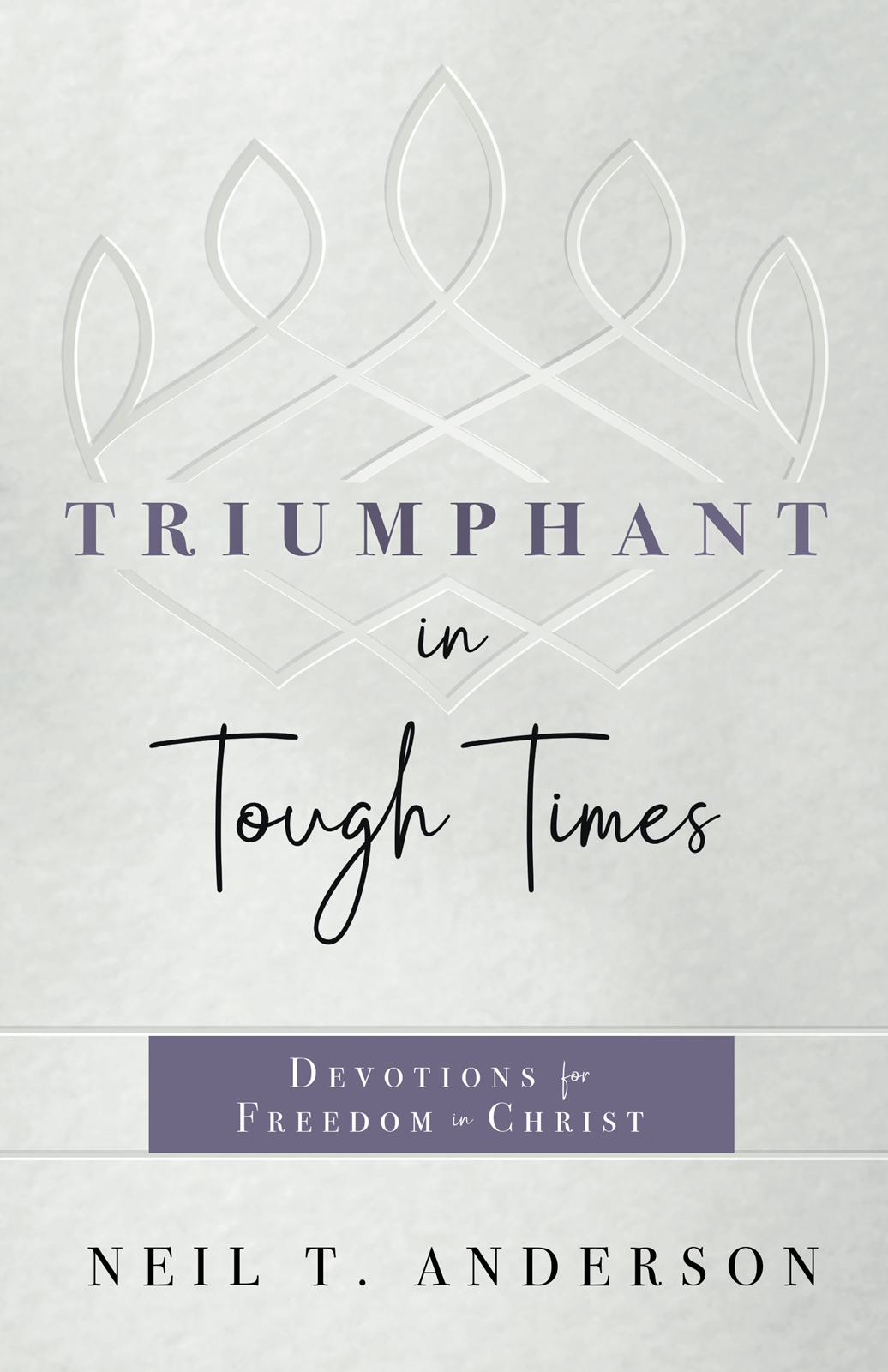
Read more in Triumphant in Tough Times by Neil T. Anderson
0 Comments Leave a Comment »
How God Uses Ordinary People to Accomplish Extraordinary Things
Posted on Oct 12, 2023 Topic : Men's Christian Living, Women's Christian Living

Most children are familiar with the stories of the people they see in a traditional Nativity scene—Mary, Joseph, the shepherds, the wise men, and of course, Jesus. But do they know about Jesus's ancestors who God used to bring about the birth of the Messiah? In this brief excerpt from Jesus and the Characters of Christmas, children will learn about just a few of the everyday men and women whose faith made it possible for Jesus to one day be born. Share this story with your child today.
***
Jesus is kind and loving and perfect.
But others in His story are just normal people like you and me.
Abraham struggled but believed God's promises.
David defeated a giant and was crowned king but made big mistakes.
Rahab had a dark past but believed in God's promise to save and rescue those who are far from Him.
Ruth was from Moah, a country that opposed God's people. But Ruth was faithful, and God used her too.
Thankfully, God had a plan for these misfits all along.
"A blessing is coming to save the world!" God's messengers declared.
So the people hoped and waited. Waited and hoped.
Finally, after four-hundred years of silence, on an ordinary day, God revealed a big part of His amazing story . . . to one of the most unlikely people you could ever imagine.
A simple young girl named Mary lived in the little town of Nazareth. Mary wasn't famous or rich. People probably thought she wasn't noteworthy at all.
But God doesn't care about what other people think. He doesn't care if people have lots of money or cool toys or fancy clothes.
God uses regular, ordinary people to do incredible things.
Mary was one of those people.
And so are you!

Read more in Jesus and the Characters of Christmas by Daniel Darling
0 Comments Leave a Comment »
Finding Guidance: How the Holy Spirit Comforts in Times of Uncertainty
Posted on Oct 06, 2023 Topic : Inspirational/Devotional, Men's Christian Living, Women's Christian Living
Posted by : Tony Evans

Have you ever been in a spiritual slump? Maybe you’re in one today.
Jesus knew there would be days, weeks, or even years when His people would feel disconnected and at a loss as to how to live. He especially knew this would happen to His own band of close disciples when He was crucified and then left their physical presence. That’s why He called them aside to meet with them in a secluded room, where He talked about what He planned to do about it. He wanted to give them the tools to thrive even when He was no longer physically by their side. Stories like this remind us today how God is always providing what we need.
Jesus also knew His disciples were sad and scared. He assured them, “Do not let your heart be troubled” (John 14:1) and told them He was going ahead to prepare a place for them. Then He introduced the person and work of the Holy Spirit through the interesting phrase another Helper. This was to emphasize the reality that even though He was leaving them, God was sending someone exactly like Him to help them through each upcoming day, week, month, and year. In being similar, He, the Holy Spirit, would also bear all the attributes of deity Christ had.
Jesus sees our fears, our sorrows, and our spiritual slumps. He worries about us feeling alone in our journeys. That’s why He sent the Helper, and we know Him. We don’t get to walk with Jesus in the flesh, but we do get to walk with Him every day of our lives when we faithfully walk with the Holy Spirit. Trust the Helper and the comfort and guidance He offers to you no matter what you face.
—
Holy Spirit, when God sent You so many years ago, He provided the comfort and guidance I would need today. Your help is with me no matter where I go. Amen.

Read more in Transformed by the Trinity by Tony Evans
0 Comments Leave a Comment »
Is Halloween a Pagan Holiday? How Its True History May Surprise You
Posted on Sep 28, 2023 Topic : Men's Christian Living, Women's Christian Living
Posted by : Danielle Hitchen

In the twentieth century, the claim that Halloween is thoroughly pagan, originating at the ancient Celtic festival of Samhain (“sow-en”), has become widely spread and frequently parroted. Advocates of this story purport that Halloween is simply a Christianization of this pagan spiritual practice, that Samhain is the Celtic Lord of Death, and this celebration was in his honor. None of these things are true.
First, remember that the feast of All Saints shifts from May 13 to November 1 at the pressure of German churches – a region which did not even know of Samhain, much less celebrate it or have cause to pressure the Church to move the date in order to “Christianize” a pagan holiday.
Secondly, reliable scholarship in anthropology, archeology, literature, and history will tell you that all we really know about ancient Samhain festivals is that around late October/early November there was often a large feast and bonfire to mark the end of the harvest season and the start of winter. This is nothing to get excited about; festivals to mark the close of the harvest and the start of the winter season were popular across Europe and often featured bonfires (for burning organic waste materials and cooking animals they couldn’t board for the winter), feasting (all those animals!), and merrymaking. “No pre-Christian or medieval historical source clearly associates Samhain with any of the three pillars of the pagan hypothesis: veneration of the dead, supernatural activity linked to the temporary proximity to the otherworld, or the celebration of a Celtic New Year’s Eve.”
Third, to the extent that a character by the name of Samhain (or similar) is featured is Celtic folklore, he is a minor character at best – certainly not their God of Death.
It is true that many pagan cultures celebrated a feast to their god of the harvest around this time of year. In agrarian societies, good harvests were of paramount importance to their survival after all. As far as we know these festivals to communal harvest gods were not a factor in the Church’s placement of the Allhallowtide celebrations. The irony in all this, of course, is that Christian communities which eschew Halloween in favor of alternative “Harvest Fests” are far closer to the secular and pagan rituals of the season than those who just celebrate Halloween! That being said, our God is a God who gives a bountiful harvest and is worthy of thanks and praise for his provision.
So…where did all the misinformation about Halloween come from?
Partly, it was a rumor spread about by Protestants during the Reformation as a way of discrediting and disparaging the Roman Catholic church. Partly, it was the work of Sir James Frazer at the turn of the 20th century who claims to have “discovered” connections between an ancient Celtic fire-festival and the appeasement of the dead. But mostly these ideas became entrenched after the pseudo-scholar Margaret Murray published a couple books claiming to have uncovered the secrets – including dates, rituals, and secret priestly hierarchies – of the pre-Christian religions of northern Europe. Her research methods and conclusions have been thoroughly discredited by actual historians and anthropologists, but by that point the damage was done. The work of Frazer and Murray was voraciously latched upon and then vociferously defended by the neopagan movement of the last century.
Unfortunately, these falsehoods were further ingrained in the 1970s and 80s by a man name Jack Chick. His fallacious cartoons alleging that Halloween is Satan’s birthday and that the Roman Catholic church is actually a cult which worships ancient Babylonian deities (including their use of All Souls Day to worship the dead) were turned into tracts warning parents about occult-practicing pagans poisoning candy and seeking children to sacrifice to their dark master on All Hallows’ Eve. (And these aren’t even the worst of Jack Chick’s conspiracy theories!) Unfortunately, hundreds of thousands of these tracts were widely disseminated and the information did, in fact, make its way into the public consciousness even if many never traced the hearsay back to its completely unfounded source.
It should be noted that even though Halloween seems to have no historical root in ancient pagan practices, neopagans of the twentieth century and beyond do continue to refer to October 31 as Samhain and mark it as a special occasion in their rituals (thanks, Margaret Murray). Should this give Christians pause as we consider celebrating Halloween? Probably not. To a certain extent, things take on the meaning you give them. Is a black cat bad luck? If you want it to be, or…it’s just a cat. Are Easter eggs a form of worshipping an ancient fertility goddess? If you want them to be or…they’re just a fun seasonal treat. Are Christmas evergreens actually paying homage to the Roman god Saturn? If you want them to…or they’re a beautiful symbol of Christ’s everlasting, ever-living love. But…is Halloween pagan? If you want it to be. Neopagans have certainly decided it is. But as Christians, we have claim to the true origin of the holiday in addition to a set of significant communal and religious traditions during Allhallowtide. There’s no good reason to reject the holiday wholesale.
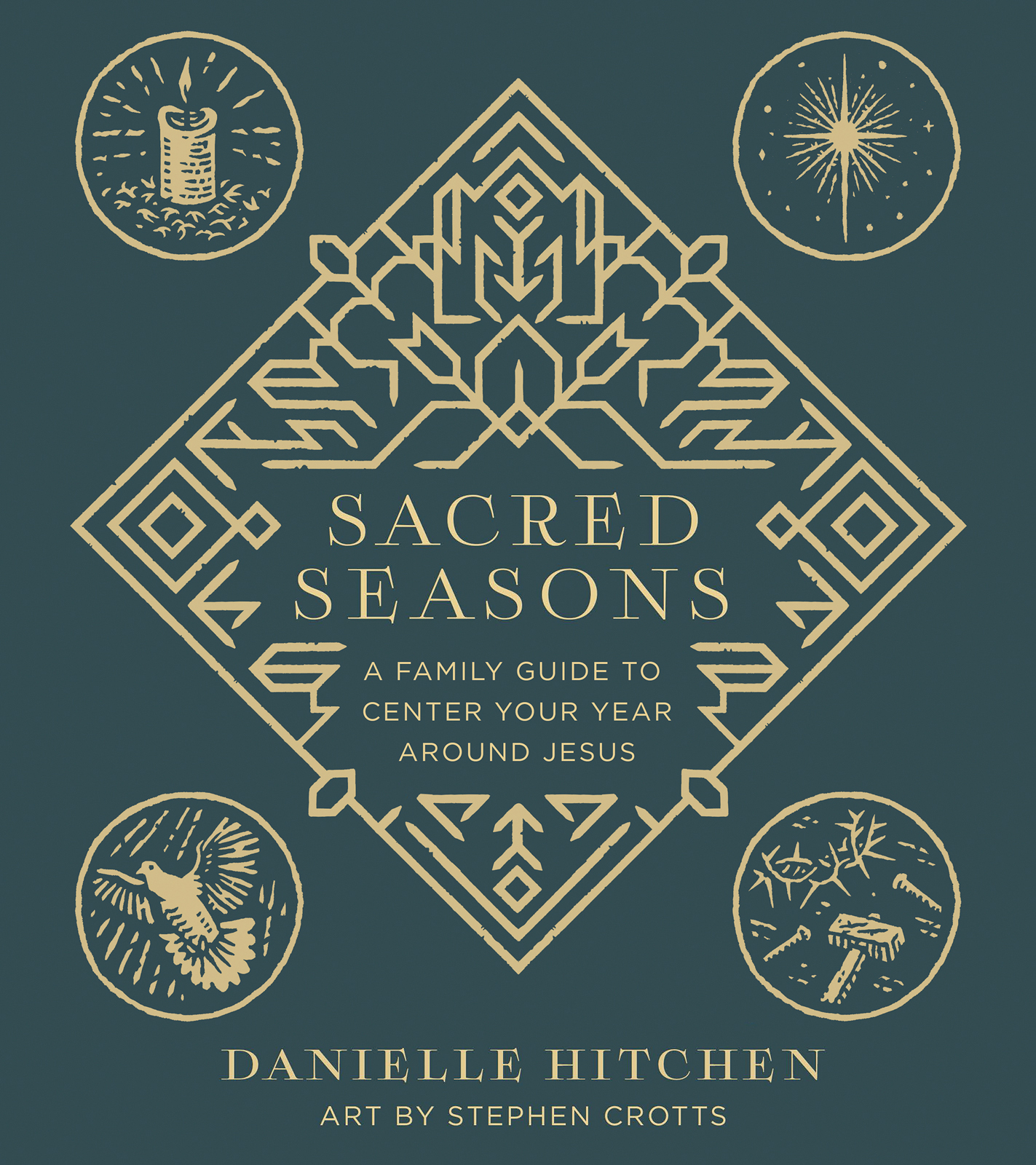
Read more in Sacred Seasons by Danielle Hitchen
0 Comments Leave a Comment »
How to Read Scripture in a Colorful New Way
Posted on Sep 27, 2023 Topic : Inspirational/Devotional, Men's Christian Living, Prophecy, Women's Christian Living
Posted by : Kristi McLelland

The Bible functions like God’s photo album. The Scriptures are not exhaustive. They don’t tell us every detail about every moment that happened. The Bible is not an all-inclusive record.
Today we typically store our pictures in digital spaces like cell phones and laptops. I’m old enough that I still have actual photo albums, with pages I can turn as I look through the pictures. When we choose what pictures to place in our photo albums, the events and instances we capture often involve birthdays, weddings, vacations, and holiday celebrations—important moments we want to remember. We’re not likely to include a picture of us shopping at the local grocery store on a Monday night. Our photo albums contain the most significant people and moments of our lives, some light‐ hearted and joy‐filled, others perhaps more serious and tear‐eliciting.
The Bible functions similarly—like God’s photo album. What we have is exactly what He wants us to have. When you read Scripture, have you ever considered that you are reading the stories, the pearls, God chose for you to have? In this we again see glimpses of the heart of God. While we acknowledge that there are some difficult passages throughout the biblical narrative, we also see the living God consistently working to bring about restoration, renewal, and redemption.
When I was in seminary, one of my professors often made a statement that has stuck with me. He told us, “God did not give you the Bible for you to read it,” which caught all of us off guard. As seminary students, reading and studying the Bible was primarily how we spent our time! He reiterated:
“God did not give you the Bible for you to read it; He gave you the Bible so it could read you.”
What if this is true? That God has given us the Bible so that, as we read it, it is simultaneously reading us?
The Gospel of John was written approximately thirty years later than Matthew, Mark, and Luke. The latter three are known as the Synoptic Gospels because they record Jesus’ story similarly. Matthew, Mark, and Luke were already in circulation when the apostle John penned the fourth Gospel, which reads differently and has a unique emphasis. John would have known that Matthew, Mark, and Luke had been available for a while. I think it is so interesting that the last thought he gave us, in John 21:25, is this assertion: “Jesus did many other things as well. If every one of them were written down, I suppose that even the whole world would not have room for the books that would be written.”
We have a story of Jesus healing a leper,but He could have healed 10,000 others we don’t know about! We aren’t privy to all the miracles and other acts Jesus did, but I love that John says He did many other things! John seems to have understood the Spirit was guiding him to write down the very accounts God wanted us to have. This encourages me greatly every time I open my Bible, giving me the confidence that I am reading what the living God purposed for me to read. He meets us in the Scriptures.God shows us His photo album—who He is, what He is like, and what it’s like to walk with Him.

Read more in Rediscovering Israel by Kristi McLelland
0 Comments Leave a Comment »
How Choosing Hope Pleases God Now—and Echoes in Eternity
Posted on Sep 26, 2023 Topic : Inspirational/Devotional, Women's Christian Living
Posted by : Sally Clarkson

As young, hopeful, and idealistic parents of four, my husband and I had big dreams— dreams of changing the world, of making a difference, of leaving our mark...our wallet, however, didn’t always concur.
We always knew we wanted to dedicate our lives to ministry and to help bring others to Christ, but life so often seemed to conspire against those dreams we believed God had placed on our hearts. Never more so than when, with three kids under 12 and another on the way, we were squeezed out of a church we had helped grow by pouring so much of ourselves into it. We were out of money and options and had to move in with my husband’s mother, all the way out in a tiny sort of ghost town called Walnut Springs, Texas, where we would more likely encounter snakes than people.
When we initially said “I do” a little over a decade earlier and cast our vision for the future with our young, optimistic hearts, this was not what we had in mind. Things were not lining up with the long-held hopes and desires we had lengthy, late-night conversations and long-winded prayers about for years. By our timeline, we should have been leading a large, robust ministry, impacting people’s lives across the globe, and bringing them closer to their creator. Instead, we were in the middle of nowhere, with messy children, living with my mother-in-law!
I began to feel deep despair, wondering if God had forgotten about us or if we had gotten our dreams wrong. It was then that we realized we had a significant choice to make. We could allow hopelessness to fester in our hearts, or we could make the choice to trust God even in the middle of this literal desert.
Day after day, I put on a brave smile for the kids, trying my hardest to give them the best childhood I could. After putting them to bed each night, I would sit on the back deck, breathe in a few moments of peace, and gaze into the magnificent Texas sky. It was there, in the quiet and stillness of twilight, I would ask God if He remembered me, if I mattered, and if any of my hard work and the deep desires that continued to live in my heart meant anything at all.
Each day, even when I did not feel like it, I made the choice to get out of bed, thank God for small blessings, and offer up my hope for the future into His loving hands. I decided to be faithful with where I was and with what I had, even though most of it did not align with the life we had envisioned.
And so, with every new day, I would craft tasty meals, educate the children, provide them with adventures, and read books to them; at night, after talking to God for a while, I would write the words of what would eventually become my first book.
My husband, in lockstep with me, bought a desk and placed it in an abandoned old house on the property and began the long, tedious, unending work of conceptualizing and putting together a ministry, with no guarantee of success.
Looking back, now more than 30 years down the line, I wish I could tell my younger self just how important, formative, and significant those days were. How every sigh and prayer did matter, how every decision to smile for my children and work on my book, even when I had no assurance that anyone would ever read it, would lead to the life I have been blessed enough to live today—one of many books and a ministry that takes us around the world.
I could not see it then, but the difficult choices I made—even while in the dark, to walk in the direction of the Lord and what I felt He had put on my heart through the steady and often unseen acts of faithfulness—all mattered. Not only will these choices matter in this life, but they will also echo into eternity, affecting my children’s lives and so many others down the line.
We cannot see God face-to-face in this lifetime. But when we live our lives in the truth of His reality, it not only pleases Him, but it also shows the world the reality of Him through the ways we live. When we exercise our faith and choose to be faithful at every age, it pleases Him for us to believe in His reality and presence.
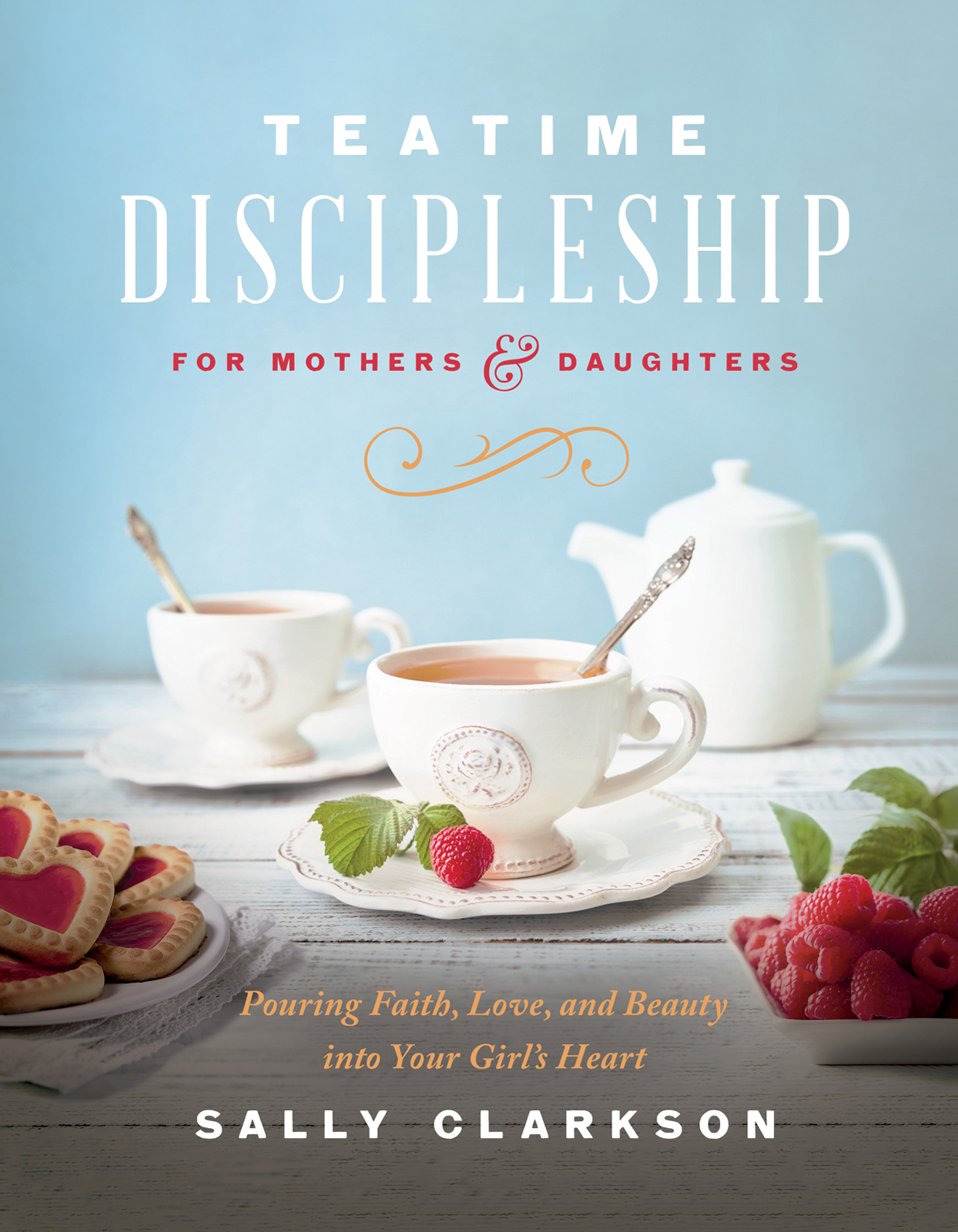
Read more in Teatime Discipleship for Mothers and Daughters by Sally Clarkson
0 Comments Leave a Comment »
How a Single Guy Became the “Dockfather” of Bad Dad Jokes
Posted on Sep 22, 2023 Topic : Men's Christian Living, Women's Christian Living
Posted by : Logan Lisle

Hey there, fellow Harvest House enthusiasts! I want to share a little glimpse into the rollercoaster ride that brought Dock Tok from humble beginnings to where we are now, and trust me, it's a tale that's as hilarious as it is heartwarming.
It all began at my family camp, where I found myself as the MC for our annual family night Talent Show. One day, inspiration struck like a bolt of lightning. Why not create some entertaining videos to share with the world? So I started making videos once a week after that night, documenting the quirky and amusing moments that unfolded at the camp.
But it wasn't until I decided to compile the cream of the crop and share them on TikTok that things got seriously interesting. Almost magically, these videos began racking up millions of views, and before I knew it, Dock Tok had transformed from a side gig into a full-fledged phenomenon.
Now let me address the elephant in the room: Those early videos were, to put it mildly, cringey. I got my fair share of ribbing from friends and even strangers for my less-than-Oscar-worthy performances. These videos explored a wide range of topics, from fun facts to childhood misconceptions, but there was one shining star among them: The dad jokes.
Surprisingly, everyone seemed to have a soft spot for the dad jokes. The more cringe-worthy they were, the better they landed! And the irony? I'm not even a dad! But that's precisely why people loved it. It was all in good fun, and it's what set Dock Tok apart from the rest. It was a place where you could unleash your inner dad-joke connoisseur, regardless of your parental status.
Alright, how about a couple more jokes and puns to brighten your day?
Why did the scarecrow win an award? Because he was outstanding in his field!
I used to play piano by ear, but now I use my hands.
Dock Tok isn't just about jokes, it's about building a community of laughter and positivity. It's about those moments that make you smile, groan, and laugh out loud. It's about connecting with people over humor, even if that humor happens to be a bit on the cheesy side.
So, dear reader, as you explore the world of Dock Tok, know that behind every dad joke and every cringe-worthy moment is a journey that's been nothing short of incredible. It's a journey of perseverance, a dash of awkwardness, and a whole lot of laughter.
In conclusion, our mission at Dock Tok is simple: To make the world a brighter place, one dad joke at a time. We believe that humor is a universal language that transcends age, gender, and background, and we're here to spread the joy.
As we move forward, let's keep the laughter rolling and the puns coming.
Stay punny and stay positive!

Read more in Dock Tok Presents...the Good, the Bad, and the Punny by Logan Lisle
0 Comments Leave a Comment »
5 Ways Christians Can Better Understand and Engage Critical Theory
Posted on Sep 21, 2023 Topic : Men's Christian Living, Women's Christian Living
Posted by : Neil Shenvi and Pat Sawyer

Blog
Today, Christians trying to navigate our rapidly-changing culture are faced with a dizzying array of unfamiliar words and phrases: “intersectionality,” “white fragility,” “cisgender,” “ableism,” “colorblind racism.” Even more confusing are the ideas behind these labels. Concepts like “systemic racism” and “gender fluidity” have found their way from the halls of academia to the nightly news, the workplace, and the elementary school classroom. Activists in the United States and all over the world believe that society is suffused with oppressive systems and structures which must be overturned in the name of “social justice.” What are we to make of these claims? Where did they come from? And what biblical guardrails should shape our thinking around issues like race, class, and gender?
The secular social justice movement and the new terminology associated with it are outgrowths of the critical tradition, which began with Karl Marx and the Frankfurt School. Throughout its history, the critical tradition has been concerned with how power creates and perpetuates social inequalities. Although Marx, writing in the 19th century, focused almost exclusively on economic power and oppression, critical theory today is an umbrella term that encompasses many different critical social theories including critical race theory, queer theory, intersectional feminism, and critical pedagogy. The overriding goal of each of these subdisciplines is liberation: liberation from laws, norms, systems, structures, and stereotypes that advantage one group at another's expense. Space will not permit a full treatment of the many deeply unbiblical assumptions baked into critical theory and its offshoots. However, we will offer several guiding principles for Christians seeking to engage the secular social justice movement.
First, Christians should (and generally do!) care about social ills like poverty, racism, and sexism.
The Bible is suffused with commands for individual Christians to care for the poor and reject any form of partiality (racial or otherwise), and for rulers to govern justly. Our concerns about critical theory should not lead us to reject these nonnegotiable commands.
Second, Christians should define their terms and should insist that others do so as well.
Against the backdrop of critical theory, words like “justice,” “oppression,” “racism,” and “gender” have all been redefined. Resist the urge to use popular jargon. Make sure all your speaking and thinking is rooted in the Bible's categories, not the culture's.
Third, Christians should seek to truly understand the perspectives we criticize.
We should listen before we speak. We should hear both sides of an argument before passing judgment. We should extend grace and charity to others. These basic biblical principles must govern all our interactions, including ones related to “hot button” issues.
Fourth, Christians must rest in and display the unity of the church.
One of the most dangerous tendencies of critical theory is to divide people into oppressed and oppressor groups and then to pit them against one another, even within the church. Christians must forcefully reject this posture. At a time when Jews and Gentiles were deeply divided, Paul insisted that Jesus’s redemptive work on the cross had united them in one body and called them all into a new family where there is “neither Jew nor Greek, slave nor free, male nor female.” Our different social identities are not erased but are subsumed beneath the glorious weight of our identity in Christ.
Finally, we must stay rooted in the gospel.
Every social problem is ultimately an outworking of our fundamental human problem: sin. And the ultimate solution to the problem of sin is the gospel: the good news of Jesus's life, death, and resurrection. Both as the church and as individuals, let's cling to the gospel as the source of our hope, joy, and peace.
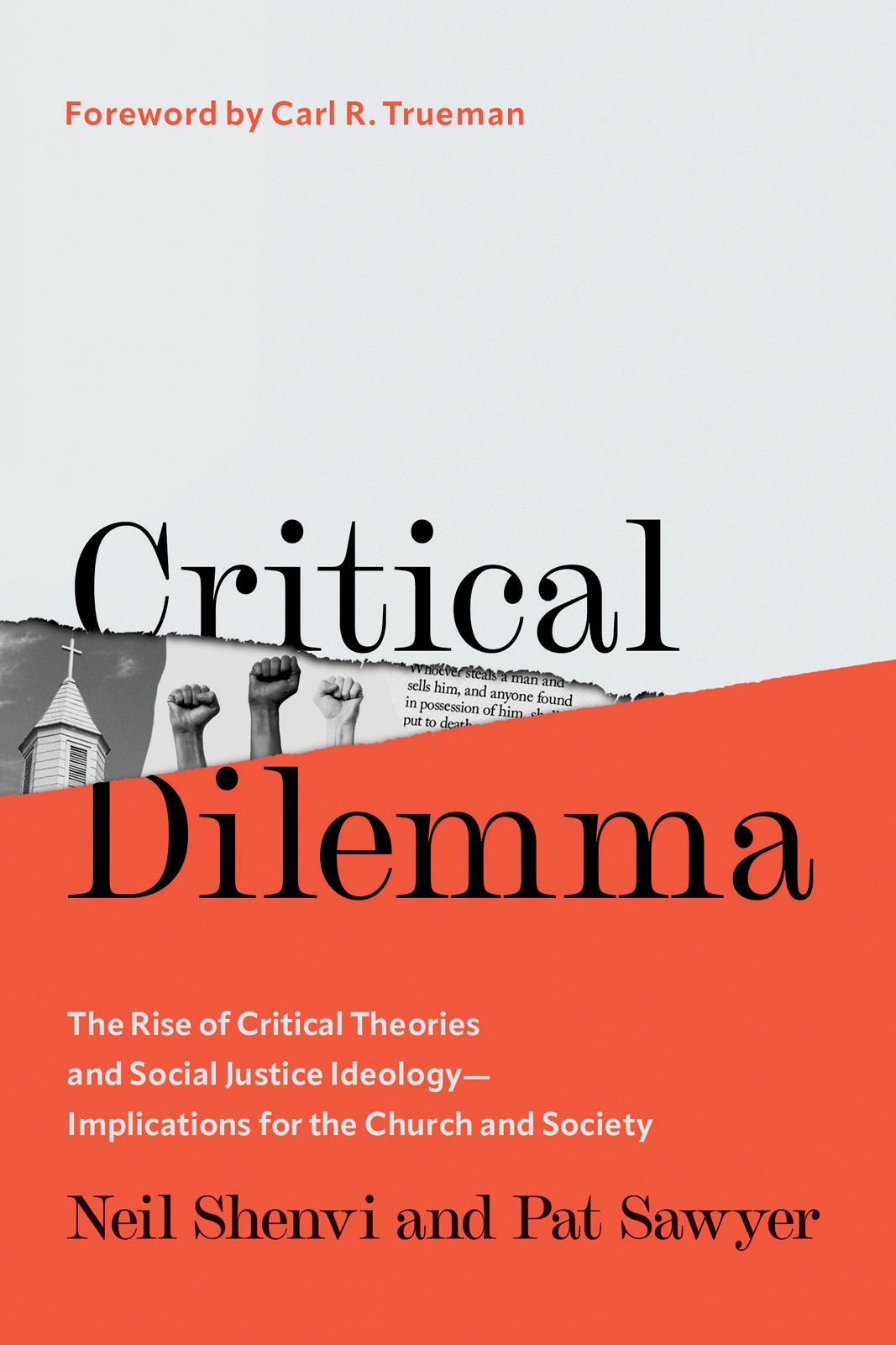
Read more in Critical Dilemma by Neil Shenvi and Pat Sawyer
0 Comments Leave a Comment »
How You Can Handle the Sting of Rejection and Emerge Even Stronger
Posted on Sep 19, 2023 Topic : Inspirational/Devotional, Women's Christian Living
Posted by : Calyn and Blythe Daniel

The excerpt below is from Let's Be Friends, a unique friendship journal for tween girls written by mother/daughter duo Calyn and Blythe Daniel. Discover how you can overcome rejection as an adult or a child. Share this article with your daughter today.
***
One of the hardest things we go through in life is facing rejection and not losing who we are. Rejection can start as young as elementary school and continue into adult life. The sting of someone not accepting you, especially in friendships, can cause you to doubt yourself and your unique place within a friendship.
I (Calyn) have experienced rejection from my friends at school and even though it has hurt, it has made me stronger in the friendships I do have. Rejection never will feel easy. It’s a painful, defeating feeling. And the worst part is that girls won’t even realize that they hurt you unless they experience rejection themselves. However, it is a part of being in a friendship. Friends will change and friendships will change over time. But God knows the friends who are right for you, and he will help as you call out to him and grow as a person even through rejection. God wouldn’t allow rejection if he didn’t know that it would help you find the right friends.
As an adult, I (Blythe) still face rejection in friendships and in work-related relationships. Do you feel as though you have been navigating life around rejection? I want to be stronger through rejection not bitter because of it.
Some of the ways God has shown us to look at the rejection we face is by:
- Recognizing how Jesus kept going in spite of the rejection he faced. He didn’t let it slow him down.
- Recalling that rejection is another person’s response to who you are that speaks to their character not yours.
- Understanding that God will never reject you and shows you his faithful love every day.
- Learning to widen your circle of friends with people you may not have even thought you would connect with.
- Sensing the strength you bring to others because God has created you, and he knows where you will bring your influence.
How are you handling rejection you have faced in your life? Maybe your child is experiencing rejection and doesn’t want to do certain things like go to social events or school because they feel alone or sad.
One of the things that helps me (Calyn) is that whenever friends reject us, we can remember that those aren’t our real friends and that God will show us our true friends. And that doesn’t mean those other friends are mean or bad, they just aren’t the friends for you or me right now. God has set you apart, and you are different from those around you. Sometimes being set apart means that we choose friends who value the same things we do, like having a relationship with God, being honest, and being a true friend.
We want others to like us, and it hurts when they don’t show that they approve of us or care about us as much as we care for them.
I (Blythe) have noticed that when I put my hope in someone to come through for me other than God, then I am saying “God, this person in my life is more important than you.” And that’s something I have to be aware of because that’s not how I want to live my life.
What about you? Is there someone you need to pray for or let go of your holding on too tightly because their rejection has stifled you? The good news is that we don’t have to give someone any area of our life that is reserved for God to fill.
May you be encouraged that even if you are rejected, no one can take away the fact that you are worth more than the value any one person can place on you. God sees you as honorable and worthy and often will show you why rejection from one person may have been protection for you to have a different friend, another business relationship, or spouse. Let’s keep seeking God above anyone else and when rejection does come, ask ourselves how we can grow stronger through it!

Read more in Let's Be Friends by Calyn and Blythe Daniel
0 Comments Leave a Comment »
How The Book of Daniel is More Relevant Now Than Ever
Posted on Sep 13, 2023 Topic : Men's Christian Living, Prophecy, Women's Christian Living
Posted by : Todd Hampson

Daniel lived at a time of rapid change (and judgment) after a prolonged period of grace and warning from God through his prophets. From a human perspective, Daniel’s world was falling apart. The prophet’s home country was decimated and he was forcibly taken to enemy territory to serve in a pagan, godless, violent, and immoral setting. This was not theoretical. It was Daniel’s real‐life situation. Yet God used him amid all the godlessness.
In fact, the harsh reality of Daniel’s predicament provided the perfect opportunity for God to move the dial in a major way. The sweeping prophecies in the book of Daniel provide the biblical framework needed to understand the context of the New Testament, Jesus’ teaching about the end times through his kingdom‐focused parables and the Olivet Discourse, and the oft‐avoided book of Revelation. This can’t be overstated—Daniel contains the foundational framework for an accurate understanding of the end times.
The mind-blowing fulfilled prophecies found in the book of Daniel stand as a concrete and compelling apologetic that the Bible is indeed the very Word of God. The fulfilled prophecies from the book of Daniel—including prophecies about 4 successive world empires (Babylon, Medo-Persia, Greece, and Rome), famous historical figures such as Alexander the Great and Antiochus Epiphanes, and many more—serve as the built-in proof of authenticity of Daniel's book and the sovereign God behind it!
The book of Daniel also provides some of the most practical lessons one can find on how to survive and thrive during a period of rapid change while living in a culture that is antagonistic to the truths of Scripture and the ways of God. Daniel and a few of his friends navigated the complex situation they found themselves in and avoided godless indoctrination and forced false worship. They knew where the line in the sand was and stood up for God regardless of the possible negative outcomes. By doing so, they witnessed God do miracles. They walked through flames unscathed with the Son of God, saw the mouths of hungry lions remain shut, and talked face to face with God’s supernatural messengers.
The practical lessons will equip you to stand firm as a believer—to know which lines in the sand must not be crossed. And the prophecies of Daniel will reveal God’s faithful hand at work through history, helping you understand the details and the importance of the end times—for which we are watching the stage being so clearly set!
If you want to discover your calling, understand the context behind this current period in history, and thrive like never before—regardless of what is going on around you—then you may want to take a fresh look at the gritty, practical, and timely truths from the book of Daniel. We need to reclaim a practical understanding of the sovereignty of God. Even in the midst of encroaching darkness and evil, we can still rest in God’s unfailing love, provision, comfort, and joy. So, take courage as you carefully study the lessons, practical theology, and 2600-year-old prophecies found in the book of Daniel. God is the sovereign pilot who navigates the storm, and you were built for such a time as this!

Read more in The Non-Prophet's Guide to the Book of Daniel by Todd Hampson
0 Comments Leave a Comment »
Why Our Weakness Is Designed to Draw Us Closer to God
Posted on Sep 12, 2023 Topic : Inspirational/Devotional, Women's Christian Living
Posted by : Emily A. Jensen

My hands gripped the steering wheel like I was driving through a thunderstorm, but the car wasn’t moving. I sat in a dark parking lot with my hands at ten and two while tears streamed down my cheeks. Not the pretty kind you might see in an old film, where a single tear can be gently dabbed away with a tissue. My chest heaved, and I wailed more like a child than the twenty-year-old woman I was. It was a cry from the deep—not just tears for another failed relationship but the physical response of disappointment heaped upon disappointment, mess upon mess that I’d made of my life. I’d lived apart from God, but could I even call it life? For all I’d done and tried, I had nothing but ruins to show for it.
For the first time in my adult life, I raised a sincere cry to God. With head low, I could mutter only two words: “Help me.”
And help he did.
Within the week, I heard the gospel and believed. I surrendered my life to Christ. God helped me not by instantly cleaning up the mess I’d made of life but by giving me new life in him.
When I look back on those moments, nearly twenty years ago now, I think of the deepest kind of weakness a person can experience. Something worse than being keeled over with back pain or feeling insufficient for a task. It’s the kind of weakness that each person must reckon with before a holy God. Our souls suppress it because we don’t want to face how minuscule, broken, dead, and incapable we are apart from him.
Knowing you need a strength outside of your own might be something you considered at such a young age that your memory of surrendering to Christ comes in shadows and flashes. You’ve spent your life walking with God and experiencing joy in Christ, even though it’s not been a perfect journey. Through the doubts, the ups and downs, you know the weakness of your flesh and your need for grace. For as long as you remember, you’ve lived as a debtor forgiven and saved.
Or perhaps, as in my case, God opened your eyes and ears to the gospel as a teenager or young adult, and you made the walk of a prodigal into the arms of your heavenly Father. He gently sifted your life through a colander, his loving hands shaking away every worthless thing, leaving only bits to build from as you walked forward in faith and obedience.
Or maybe you’ve never reckoned with your weakness. Perhaps you’re tired, overwhelmed, discouraged, worn down, and frustrated with your own striving. You’ve tried every option for hope and help under the sun, and you’re out of ideas. You sense a weight on your soul heavier than you can lift, and it’s pressing your knees to the ground. Oh, friend, low is exactly the right direction to go.
Today, if you feel weak because you’ve made mess upon mess of your life, or because mess upon mess has been heaped upon you, let the weight drop you low. Collapse beneath the load in sweet relief. And leave the weight of your weakness again at the feet of Jesus Christ. There is no reason for you to try to clean up the mess in a strength you don’t possess. Instead, cry out to Jesus Christ. He allowed himself to be crushed so you could walk freely today. And he lends his ear to every “woe.”
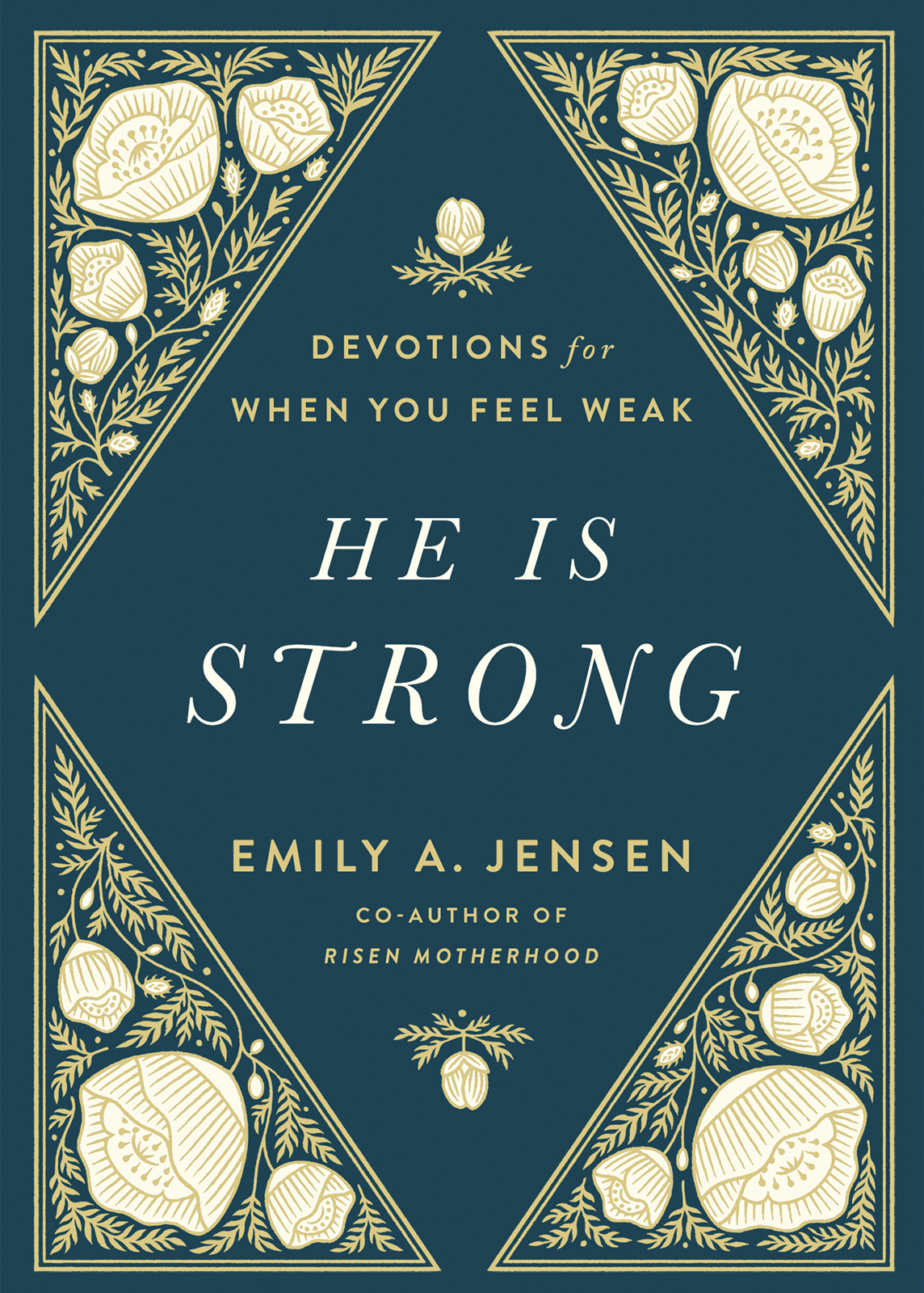
Read more in He Is Strong by Emily A. Jensen
0 Comments Leave a Comment »
Inside the Secret Life of Israeli Special Forces in the Fictional Thriller, Out of the Far North
Posted on Sep 07, 2023 Topic : Fiction, Men's Christian Living, Prophecy, Women's Christian Living
Posted by : Amir Tsarfati and Steve Yohn

OUTSIDE DAMASCUS, SYRIA—OCTOBER 4, 2022—02:10 (2:10 AM) EEST
CARL, Lead. We’re through the checkpoint,” Nir Tavor informed his ops center. “How’s the road look to target?”
“Traffic stop fifteen kilometers ahead,” replied Liora Regev, one of CARL’s analysts. CARL was Nir’s team of odd specialists back at Mossad headquarters. The acronym itself stood for absolutely nothing, an inside joke amongst the small group of millennials. “Appears routine. Otherwise, clear.”
Turning toward the driver, Nir said, “Nice work with the guard.” “He was just a clueless kid. Easily controlled,” Alif chuckled. “I could have had him doing pushups on the street if we had the time.”
Nir laughed, figuring he probably could. Alif was a member of the HUMINT-gathering Unit 504, who were masters of human intelligence collection, interrogation, and PSYOP. When Nir was a kid, he and his friends used to talk about the shadowy unit, but always with hushed voices. Formed soon after the creation of the State of Israel in 1948, it is one of three divisions of the Israeli Defense Forces’ Military Intelligence Directorate—and, by far, its most secretive. Recently, he read an article in which one of the unit’s officers said that if you want to understand the activities of Unit 504, you should go to a theater and watch a thriller double feature. Only then will you scratch the surface of the work they do.
Reading those words had sent a little twinge through Nir. As he had approached the end of his mandatory military service and begun weighing the options for his future, he had considered applying for Unit 504. He wanted action in his life. He wanted to make a difference. But living a secret life for years at a time in an enemy country had seemed exhausting to him. Many of the undercover agents that 504 had deployed around the world, and particularly in the Middle East, reminded Nir of Cold War moles deeply hidden by their governments on the opposite side of the Iron Curtain. There is the loud war that Israel fights with rockets and fighter jets, then there is the larger quiet war. It is this silent war that Unit 504 fights.
Except for nights like tonight.

Read more in Out of the Far North by Amir Tsarfati and Steve Yohn
0 Comments Leave a Comment »
How Bible Prophecy Can Inspire Our Worship of God
Posted on Sep 05, 2023 Topic : Men's Christian Living, Prophecy, Women's Christian Living
Posted by : Steve Miller

Rarely do Christians think about Bible prophecy in connection with worshipping God. The tendency is to view prophecies as mysteries to be solved, or promises about the end times that aren’t relevant to us today. Those misperceptions are unfortunate, because prophecies—both those that have been fulfilled in the past and those about the future—are very relevant to us now, especially when it comes to our worship of God.
God reveals Himself to us on every single page in the Bible. Every passage—whether directly or indirectly—conveys information about who He is and what He does. This is true about the prophetic portions of Scripture as well. Every time we read a Bible prophecy, we learn more about God. And the more we learn, the richer our worship can become.
Before I share specific examples of prophetic passages that can inspire us toward worship, let’s consider the definition of worship. Many Christians associate worship with what we do in church on Sunday. It’s common for us to describe church services as worship services. Together, we sing to God, and we learn from His Word.
But worship is much more than that. Worship has to do with the state of our mind and heart toward God. It has to do with our thoughts about God and our response to Him. To worship God is to show reverence for Him and to admire His greatness. When we worship God, we proclaim that He is worthy of honor and glory and praise because of who He is and what He has done. Worship begins in the heart, and it involves a response to what we know about God.
As we reflect on what Scripture reveals to us about God, and as we see God’s greatness on display, our response ought to be one of showing reverence for Him, treasuring Him, pursuing Him, and making Him the primary love and focal point of our lives.
What are some examples of how Bible prophecy can inspire our worship?
We see God’s precise knowledge of the future on display in Micah 5:2. More than 700 years before Christ’s birth, God specifically declared that Jesus would be born in “Bethlehem Ephrathah,” near Jerusalem. The addition of “Ephrathah” distinguished this Bethlehem from another town in the region of Galilee that was also called Bethlehem.
Keep in mind that Joseph and Mary weren’t in Bethlehem Ephrathah near the time of Jesus’ birth—it took a Roman census to direct them there (Luke 2:1-6). God used a pagan governor to prompt His beloved servants Joseph and Mary to go to the place where He had ordained for Jesus to be born. Only an all-knowing, all-sovereign God could have made such an exact prediction so far in advance, and perfectly orchestrated its fulfillment. Isn’t that amazing?
In Psalm 96:13, we read the prophetic statement that the Lord “will judge the world in righteousness.” This reveals His judgments will be fair and precise toward every single person.
The fact the Lord is able to judge perfectly reveals that He is all-seeing. He knows people’s hearts and motives. It also affirms His holiness and wisdom. He can flawlessly discern right from wrong. And it tells us He is consistent. He will judge every person according to the same righteous standard. No person will be treated unfairly based on fickle whims.
Though the wrath of God is not a pleasant topic, the fact He will exercise perfect judgment tomorrow gives us reason to rejoice and worship Him today. We are comforted when we realize that the wicked will not go unpunished, and that ultimately, righteousness will prevail forever.
These are just a couple examples of how Bible prophecy can inspire us toward worship. Every part of Scripture is meant to increase our understanding of God, and that includes Bible prophecies. So anytime we read a prophetic passage, we ought to ask ourselves: What wonderful truths can I learn here about God? In what ways am I seeing His greatness on display? And how can I respond through praise, adoration, or thanksgiving?
Worship is not to be taken lightly. The Bible tells us that worship will be our primary occupation in heaven. So when we make a deliberate effort to engage in worship here on earth, we are getting practice for what we will do for all of eternity.
One of the great truths about worship is that we will never run out of reasons to adore God. Because God’s greatness is infinite, the reasons we have for worshipping Him are infinite. And it’s wonderful to live with the perspective that every single passage in the Bible can provide us with insights that lead to worship—if we’ll take the time to consider what God is telling us about Himself.

Read more in One Day Nearer by Steve Miller
0 Comments Leave a Comment »
“Trust in Me”: How God’s Sovereignty Relieves the Burden of Our Anxiety
Posted on Aug 29, 2023 Topic : Inspirational/Devotional, Men's Christian Living, Women's Christian Living
Posted by : Ron Rhodes

Someone said that it is the fate of God to be everlastingly misunderstood. This is often the case when God allows difficult circumstances to come into our lives. We wonder what God is doing.
Here’s something we sometimes forget: God has the unique, sovereign ability to bring good out of evil. This is powerfully illustrated in the life of Joseph, whose own brothers sold him into slavery (Genesis 38–39). This situation was painful for Joseph at the time, but God used it to bring Joseph to Egypt, where He elevated Joseph to a position of great authority (Genesis 41).
During the time of suffering itself, Joseph had no idea what God’s intentions were. He did not know that God was using these dire circumstances—spread out over several years—to bring him to a position of great prominence. This is why it is so important to trust God regardless of the circumstances. God truly did bring about a greater good through the pain that Joseph suffered. Joseph later informed his brothers: “You meant evil against me, but God meant it for good” (Genesis 50:20).
If God could bring good out of evil in Joseph’s life, He can do the same in our lives. God invites us, “Trust in Me—I am working in your life to bring about good things.” How will you respond to this invitation to trust?
The hard thing for us is that God doesn’t sit us down and say, “Okay, listen, I’m going to allow some hard circumstances to happen in your life this next week, but I’m in control and I’m going to use these hard circumstances to bring about a great good. So don’t worry about it. Everything is okay.” Certainly, God did not sit down and explain to Job why he was suffering so terribly.
You and I have the privilege of going behind the scenes of Job’s life as we read the book of Job. But we are not able to “go behind the scenes” and discern the mysterious ways that God works in our lives. That’s why we must trust Him. We are generally unaware of why God engineers our circumstances the way He does. But we can always be sure that He is working for our good.
Consider the apostle Paul, who was imprisoned several times during his ministry (see Acts 16:23-37; Ephesians 3:1; Philippians 1:7; Colossians 4:10; Philemon 9). This must have been painful for Paul at the time. He may have wondered why God allowed it. But we know that Paul wrote Ephesians, Philippians, Colossians, and Philemon while in prison. God did a great deal of good through Paul’s imprisonment. God essentially gave him a “time out” so that he could write some of the books of the New Testament.
Chuck Swindoll once said something that has always stuck with me: “The sovereignty of God relieves me from anxiety. It doesn’t take away my questions. It takes away my anxiety. When I rest in it, I am relieved of the worry.” Indeed, he said, “The sovereignty of God frees me from explanation. I don’t have to have all the answers.”[1] Joseph didn’t have all the answers. Paul didn’t have all the answers. But both trusted in God.
Please allow me to suggest a nugget of truth that has always helped me when life throws me a punch: When you do not understand why certain things have happened in your life, that is the most important time to anchor yourself on the things that you do understand.
Among the things that we do understand from Scripture are:
- God is a living God who seeks to walk with us through every circumstance we encounter (see Daniel 6:19-27).
- God loves the unlovable—including you and me (1 John 4:8). In your mind’s eye, try to picture yourself resting in the loving arms of God.
- God is everywhere-present. He’s with you every moment, whether you’re consciously aware of it or not (Psalm 139:7-8).
- God is just. If someone has treated you unfairly, count on God to make all wrongs right in the end (Genesis 18:25).
- God is compassionate and has tender feelings for you. When you are tempted to doubt God’s compassion, think about the Jesus of the gospels, for this will give you an accurate picture of God’s heart for you.
“Trust in Me—I am working in your life to bring about good things.
Why not follow the example of Joseph and Paul and take God at His word? Trust Him!
Pearl of Wisdom: “We know that for those who love God all things work together for good” (Romans 8:28).
—
[1] Charles R. Swindoll, The Mystery of God’s Will (Nashville, TN: Word Publishing, 1999), p. 91.

Read more in A Popular Survey of Apologetics for Today by Ron Rhodes
0 Comments Leave a Comment »
3 Simple Ways to Slow the Hustle and Savor Your Family Time
Posted on Aug 24, 2023 Topic : Inspirational/Devotional, Men's Christian Living, Women's Christian Living
Posted by : Lana Stenner

We all yearn for joyful, memorable days with our friends and family. Slow living has become a trendy phrase, not just for the homestead community, but for everyone from corporate executives to stay-at-home moms. Many of us have a desire to simplify and get back to the basics of what is truly important in life. In a society filled with instant gratification such as same-day deliveries, smart devices, and AI chatbots that answer every question we can imagine, it’s easy to get overwhelmed and distracted. You don’t have to move to a 100-acre farm in the middle of nowhere to slow down the hustle and begin to simplify your days. Here are three easy steps you can do to start chasing God’s simple truths.
Start a Garden
Building a garden can be as simple as filling a container on your patio with soil and plants. The wonderful thing is that it can be done while living in an apartment. If you have a little more space, you can move out to the yard with a raised bed. If you pack it tight with your favorite fruits, vegetables and herbs, there will be little room for weeds to sprout up. We love companion planting that allows our produce to thrive. For example, our tomato beds are vertical gardens with trellises, so the vines can grow up to eight-feet tall. This space saving method also allows room for the marigolds to be planted at the base and repel the insects that destroy our plants. The additional bonus to this companion plant is the beautiful bright yellow and orange blooms. It’s especially fun to plant, nurture, and harvest produce with your family members. It’s a lesson in patience, hard work, and pure joy that you can experience together.
Prepare Family Meals Together
We love our Sunday family time around the dinner table. It’s always casual, delicious, and filled with tears, laughter, and good conversation. The kitchen is the center of our relationships, and spending time preparing meals together can be priceless. If you look back at the landscape of your life, some of your most positive memories will likely be intertwined with food, your favorite people, and a special meal. This is where memories are made and relationships are built. Of course, it’s easier to stop at a drive-thru for a quick burger and eat in the car on the way to a child’s sporting event. We’ve all done that in the past when necessary. However, preparing family meals together, savoring the flavors, and lingering for conversations, give us a sweet taste of good life. This is when we can pass on traditions, discuss values, and truly connect with our friends and family.
Schedule Time to Build Faith
It’s important to devote time to build your faith or other things will quickly distract you and occupy your free minutes. This is more than just sitting in the pew on Sunday morning. Maybe that is sitting on a bench in your garden and praying for a friend or your kids. Filling our spare time by meditating on God’s goodness brings joy to our lives, even in seasons of struggle. Some like to start every morning with time in the Bible and prayer, a walk, or a trail hike. A few minutes of quiet time outside with an audible bible reading app can be powerful. Getting that peace and joy from being in alignment with God is life-changing. Spending time in God’s word, prayer, and worship is nurturing, and can help clarify when our priorities are a bit off. Turning down the noise of the world and pressing into God’s simple truths can bring peace and contentment.
Scheduling intentional time with God, preparing family meals, and growing your own food will help you slow down, savor time with our loved ones, and have a stronger relationship with the Creator.

Read more in The Grace-Filled Homestead Cookbook by Lana Stenner
0 Comments Leave a Comment »
Three Ways to Spend Advent at Jesus’s Feet
Posted on Aug 22, 2023 Topic : Inspirational/Devotional, Men's Christian Living, Women's Christian Living

“Season of peace? This feels more like a season of stress!”
In the whirlwind of shopping, planning, baking, and trying to make everyone happy, Christmas season has often left me overwhelmed. You too?
One year when I was particularly plagued with yuletide anxiety, out of nowhere the story of Mary and Martha popped to mind. (Maybe not “out of nowhere.”)
Remember the story? During a dinner party, Martha was agitated by trying to perfect the preparations, while Mary sat at the Lord’s feet, listening to him (Luke 10:38-42 ESV). Martha complained to Jesus that her sister wasn’t helping. Ponder Jesus’s response:
“Martha, Martha,” the Lord answered, ‘you are worried and upset about many things, but few things are needed—or indeed only one.Mary has chosen what is better, and it will not be taken away from her.” (Luke 10:41-42)
Ahh... That was the gentle nudge I needed to remind me to shift my attention onto what the Advent season is about—Jesus!
Here are three ways to focus on Jesus while awaiting Christmas day.
First, follow Mary’s example and listen. He’s given you the incredible gift of his Word. When you read the Bible, you are sitting at Jesus’s feet, being filled with the words of the one who loves you and came at Christmas to save you. Remember that his Word is a “lamp to my feet and a light to my path” and its truths are: “More to be desired ... than gold, even much fine gold; sweeter also than honey and drippings of the honeycomb” (Psalm 19:10).
To redirect your focus to Jesus during this season, it’s helpful to use an Advent devotional, specifically written to walk with you through the days leading to the night of his birth. Awaiting the Manger: Whispers of Advent in the Old Testament, directs you to explore Old Testament passages in a new light—always pointing toward Jesus. Whether you pick Awaiting the Manger or another, I encourage you to select an Advent devotional that shines light on Jesus and his love.
Tip: I find great comfort in simply copying a Scripture verse onto a 3x5 card. Just writing it is encouraging, and I can also put it in my pocket to ponder throughout the day.
Second, pour out your heart to the Lord. This is another practice we glean from Mary. Did you know that Martha’s sister Mary was also the one who emptied a large amount of ointment onto Jesus’s head and feet at a dinner? (Mark 14:3, John 12:3). Mary’s tender, almost desperate, love for her Savior shines through her vulnerable actions. She doesn’t fear laying bare all she has before him. We can do this too. Think of your prayers as Mary’s anointing oil. (See Rev. 8:3.) Pour them out to him. Throughout the Psalms, we see abundant examples of prayers flooding the Lord’s throne. Here’s one:
With my voice I cry out to the Lord; with my voice I plead for mercy to the Lord. I pour out my complaint before him; I tell my trouble before him. (Ps. 142:1-2)
If you don’t know what to pray, sometimes it helps to use a pre-written prayer. I engage in this almost every day. If you’re looking for short prayers to pepper your day, you can find those in Awaiting the Manger as well!
Tip: To find time, pray while folding socks or driving to work or during the little corners of your life. He hears those prayers too!
Third, don’t forget gratitude. This part of pouring out our hearts to the Lord is perhaps the most like Mary’s loving anointing. Thank him for the things that are making you busy! As you shop for or wrap presents, give thanks for the person the gift is for. And especially, don’t forget to thank God for the greatest gift of his Son born in the manger.
Tip: On a small piece of colored paper (green works great!), write down one thing you’re grateful for every day during Advent. Put them on your fridge or on a bulletin board. It’s a great way to celebrate the blessings you already have instead of only focusing on those gifts you’re craving.
I’m praying these three reminders will help you find true peace during this Advent season, as Mary did, at Jesus’s feet.
Peace I leave with you; my peace I give to you. Not as the world gives do I give to you. Let not your hearts be troubled, neither let them be afraid. (John 14:27)

Read more in Awaiting the Manger by Ocieanna Fleiss
0 Comments Leave a Comment »
The Startling Reality of a Love that Never Leaves You
Posted on Aug 17, 2023 Topic : Inspirational/Devotional, Men's Christian Living, Women's Christian Living
Posted by : Ruth Simons

Every journey is marked by distance and terrain. Distance tells you how far you have yet to go, and terrain indicates how much effort it’ll take to get to your destination. When traveling, we know we will be separated from comforts and the people we know and love, and we plan accordingly. In preparation for a journey, we pack survival kits, emergency contact cards, and try to minimize the unsettledness we inevitably experience when we’re far from home.
It’s not so different with our spiritual journeys. Whether we feel distant from or in close proximity to the things that give us assurance can be the difference between journeying in fear and anxious striving, or journeying from a position of courage and confidence.
We were made for the latter in our walks with God—a journey that traverses seasons of life and the difficult terrain of our hearts. It’s a journey that finds its purpose when we receive the gift of salvation through Christ and live as a new creation the rest of our days until we see our Savior face to face. The promises recorded for us in the Bible testify that while the journey is not easy, we do not walk alone.
So why do so many of us feel distant and alone? Why do we so often allow ourselves to believe that the distance between the God who rescues us and our sinful hearts is vast, when Christ erased the miles, the distance, and the eternal separation sin causes...and brought us near?
Maybe that’s why the apostle Paul so clearly addresses the true state of a Christ-follower’s nearness to God, and wrote in Romans 8:38-39, “I am sure that neither death nor life, nor angels nor rulers, nor things present nor things to come, nor powers, nor height nor depth, nor anything else in all creation, will be able to separate us from the love of God in Christ Jesus our Lord.”
Paul wouldn’t have spelled out all the ways we cannot be separated from God’s love if it wasn’t so easy to forget. As if death, angels, and rulers were not enough, Paul says “nor anything else in all creation” (read: nothing in all the world) is capable of removing us from the active love of God in our lives as believers.
My guess is that, like me, it’s much easier for you to remember the ways you’ve caused distance with God than to remember the ways God has bridged the impossible chasm with His love. That’s why Paul makes such a dramatic point about the inability for anything to remove you from God’s love.
“Never did His love begin and never can it cease. It is from eternity and shall be to eternity.”
–C.H. Spurgeon

Read more in Pilgrim by Ruth Simons
0 Comments Leave a Comment »
Ditch Your Spa Day and Rest in the Sweet Truth of God’s Word
Posted on Aug 15, 2023 Topic : Inspirational/Devotional, Women's Christian Living
Posted by : Cambria Joy

Six days shall work be done, but on the seventh day is a Sabbath of solemn rest, a holy convocation. You shall do no work. It is a Sabbath to the Lord in all your dwelling places. Leviticus 23:3
***
It seems there’s not a lot we look forward to more than the chance to go on vacation. To break away from the cares of this life and refresh our souls. Just the thought of that makes me want to exhale. Even the hope of time to recover and restore can ease our tension temporarily. We can settle for the hope of rest but not follow through because of life demands or even misplaced guilt about having a break.
We regularly need to breathe a little deeper and go a little slower. Not just once a year for seven days but as a regular part of our weekly rhythm. Sabbath isn’t a religious commandment meant to enslave us but a life-giving invitation meant to refresh us. Does God not understand we have a never-ending to-do list? A whole day of rest sounds nice, but there are bills, deadlines, and well, life.
Jesus had such a full life, he barely had time to eat some days. Sound familiar? Take a look: “And he said to them, ‘Come away by yourselves to a desolate place and rest a while.’ For many were coming and going, and they had no leisure even to eat” (Mark 6:31). Jesus knew what it was like to have so many demands that he was forced to skip lunch. He’s not out of touch with us. He felt the pains of busyness in his soul too. And that’s exactly why he repeatedly shows us a life of rest—from God resting on the seventh day of creation to Jesus resting on the Sabbath day. A kind of rest that goes deeper than a deep-tissue massage.
Now, don’t get me wrong, a spa day can be a great thing. Esther basically got beauty treatments for a year. I love a good pedicure and an afternoon lounging beneath palm trees while sipping cucumber water. However, our invitation to rest isn’t just about going to a resort. So where do we go? I think the place Jesus led his disciples is the same place he invites us to: a desolate place. Yes, a place without inhabitants. In other words, you simply need to be alone. And by “alone,” I mean you and God. Rest isn’t a location but a posture of the heart. A heart that bows in reverence to be still before God. To get quiet enough to hear his voice.
Work requires us to repeat tasks day after day. The monotony can dull our hearing and make it hard to listen to the still, small voice of God, who desires to freely give us rest when we come to him. The remedy? Just like we roll up our sleeves to get to work, we have to roll up our sleeves when it comes to rest. The challenge before us is to focus our attention on God in a world that’s loud. We’re pulled in different directions all day, but if we direct our attention to God moment by moment, we’ll find that even demanding days can’t deafen us to his whispers.
It takes diligence to wake up and slow down, to spend time with the One who gives us true life. We rush through our lives hungry for rest, but all the while Jesus freely hands it out. All we have to do is come to him to receive this soul-satisfying nourishment not bought with wages but given out by God: “Do not work for the food that perishes, but for the food that endures to eternal life, which the Son of Man will give to you” (John 6:27). We get full when we fill up on the words of Jesus. There’s no need to hurry through our days full of weariness when he offers us endurance by simply resting in his presence: “Come to me, all who labor and are heavy laden, and I will give you rest” (Matthew 11:28).
Go to him. Streams of quiet waters are found everywhere our Shepherd goes. Jesus promised when we come to him—a person, not a place—our souls find rest. I hope you hear the echo of God’s heart when he says, “Come away.” He wants to do more than relax you. He wants to regenerate you. You’ll return beyond refreshed—you’ll be made completely new. He’s just waiting for you to say yes. May you take his hand today and find your soul refreshed every step of the way.

Read more in Milk and Honey by Cambria Joy
0 Comments Leave a Comment »
3 Quick and Easy Autumn Decor Upgrades That You’ll “Fall” in Love With
Posted on Aug 10, 2023 Topic : Inspirational/Devotional, Women's Christian Living
Posted by : KariAnne Wood

Don’t tell the other seasons, but fall is my favorite. I love sweater weather and clear, crisp afternoons under blue skies with falling leaves to keep the day company. It’s like the world is ready for pumpkin spice and hot chocolate. With all the mini marshmallows.
Wood Leaf Pumpkin

There are so many ways to make a pumpkin look cute. You can paint them and decoupage them and make your own out of felted wool. The pumpkin-creating possibilities are endless.
If you have pumpkins that have seen better days and need a little refresh, here’s a simple tip to make those pumpkins ready for their own fashion show.
Search the aisles of the craft store for wooden leaves. They typically come in a bag with different sizes and shapes. Remove them from the bag and add them to the top of your pumpkins. You can glue them in place, or if the leaves have a small hole at the top like these, you can use a piece of twine to attach them to the pumpkin stem.
Expert Tip: Instead of wood leaves, why not add book-page leaves to your pumpkins? Cut out leaves of different shapes and sizes from an old book, pinch the end, and glue them to the top of your pumpkin.
Bittersweet Fall Mantel

Just between us? I have a challenging time with fall in my living room. You see, it’s blue and white. Not exactly at the top of the fall color list.
And then I came up with a super simple mantel decorating idea, starting with the red orange of bittersweet.
These stems of faux bittersweet look like individual pieces of contemporary art. So I let them shine.
I tucked four long pieces of faux bittersweet on the mantel—two on each side with their stems crisscrossed. Next, I placed blue and white pumpkins among the stems. The key to decorating with pumpkins on a mantel is to vary the height. Use pedestals or books or even milk glass flipped upside down to give height to the pumpkins.
Then I added a few candlesticks and some blue and white pieces.
Now the mantel is ready for fall.
Expert Tip: If neutral colors are more your thing, you could recreate the same look with stems of neutral flowers, like dried hydrangea or wheat or dried leaves.
Rustic Fall Place Setting

Planning a fall get-together with family and friends this season? Here’s a creative way to set your fall table.
Start with a neutral fall wreath at each place setting, made by wrapping neutral fall stems into a circle with florist wire. Next, place a round cutting board or wood charger on top of the stems. Add a large white plate at each place, layered with a smaller fall leaf plate. Gold silverware, neutral linen napkins (these are my grandmother’s), and a beaded napkin ring complete the look.
Finally, scatter pumpkins down the center of the table for an easy centerpiece and add a smaller pumpkin at each place setting as a gift for each of the guests.
Expert Tip: For an easy fall centerpiece idea, hollow out faux pumpkins to use as vases in the center of the table.
***
Looking for more quick and easy seasonal decorating tips? Find them here.

Read more in 10-Minute Decorating Ideas by KariAnne Wood
0 Comments Leave a Comment »
When Helping Helps–Strategies for Ending Poverty in Uganda and Beyond
Posted on Aug 08, 2023 Topic : Inspirational/Devotional, Men's Christian Living, Women's Christian Living
Posted by : Kelly Miller
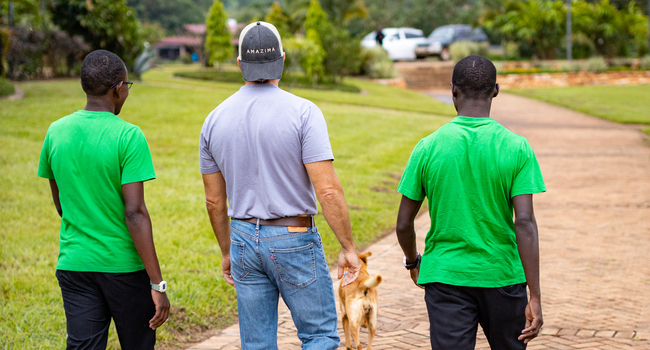
After spending five years in Uganda as the Dean of Students at a unique boarding school in Jinja, Uganda, I have come to believe that education, at least in developing countries, is often NOT the final answer to poverty. In my experience, most of the schools where sponsored children attend are subject to rote memorization for learning and in secondary schools, the students can be in a classroom thirteen or fourteen hours a day. The eventual outcome, after sixteen years of being in school, is a mostly worthless certificate that affords little to no opportunity. The sad reality is that only a small percentage of secondary school graduates go on to further education. It’s no wonder that the cycle of poverty has seen little change even as the amount of schools and sponsored children has steadily grown.
In my opinion, the broader education system in Uganda (and other developing countries) actually contributes to poverty because the environment in most of the schools further erodes the child’s dignity and significantly limits their ability to see themselves as valuable. For meaningful change to occur, things must change in our approach. Fortunately, the obvious mistakes to avoid and the fundamental and wise steps to take are known and available to anyone who would seek to understand.
Even though the quality of the schools are less than optimal, the groups who sponsor the children should not be viewed negatively. Child sponsorship organizations meet an urgent need in humble Ugandan communities by coming alongside families to provide the assistance needed for children to go to school. To be clear, without the critical efforts of these ministries and NGOs, most children from hard places in Uganda would not go to school.
If we desire to be part of the solution, we mustn't look at poverty primarily in material terms, but instead, we must first focus on the issue of human identity and dignity, as all people are made in the image of God. If you want to actually help affect change in these schools, focus on the identity and dignity of the person; don’t just give them the material things or resources you think they need. Of course, this is easier said than done.
It takes work to learn how to help people grow to a dignified identity, which is needed for climbing out of material poverty. Of course, the easier (and more common) path is to just sit back and judge the work of others, send a check, and move on, or at worst, leave it for government programs.
In my experience, most of the “help” offered to people in material need has failed to guide them out of poverty. This doesn’t mean the money and hours spent addressing material needs are not important. They are. I’m also not advocating for less effort or passing judgment on the motivations of others. What I’m saying is that we can do better, and we can see more effective, transformational outcomes.
At our school, we built the Student Life program around leading our students to know their inherent value, being made in the image of God. In support of this idea, we fashioned an environment of safety where trusted relationships are built and discipleship can flourish. In addition, we invited the families of our students to actively participate in the education of their children. As with our students, the starting point with our families is helping them to understand their dignity and how important they are to us, their children, and most importantly, to God.
It’s a long process for sure and one for which patience is critically important. For there to be any chance to see the outcomes we all desire, dignity and value are mandatory building blocks. Following this strategy in Uganda, I have seen a quantity and degree of success beyond any expectations.
Be encouraged! When you take the time to lead people to know their God-given value and that they matter, regardless of their circumstances, you also create an environment for transformation and confidence. At that point, your good ideas about how to help them may, well, actually help.
“Let us not become weary in doing good, for at the proper time we will reap a harvest if we do not give up.” Galatians 6:9

Read more in Unexpected Joy by Kelly Miller
0 Comments Leave a Comment »
Why Do the “Good Guys” in the Bible Behave So Badly?
Posted on Aug 04, 2023 Topic : Inspirational/Devotional, Men's Christian Living, Women's Christian Living
Posted by : Matthew Tingblad

Let’s Talk about Morality in the Bible
Moses killed an Egyptian and tried to hide his crime (Exodus 2:11–12). David slept with another man’s wife and tried to cover it up by killing her husband (2 Samuel 11). Abraham and his wife mistreated Hagar after Abraham got her pregnant (Genesis 16:1–6). Aren’t these supposed to be the “good guys” in the Bible?
I suspect a big reason we struggle with these stories is because of the false belief that whoever God uses must have lived a good, moral life for us to follow. This is mostly false, yet preachers use the Bible in this way as if it’s mostly true. They say, “We need to be more like Abraham, Moses, and David!”
Don’t get me wrong: David displayed admirable faith when he stood up against Goliath! But the main character in every story of the Bible is God. God is the one who never fails. God is the one who shows kindness to those who don’t deserve it. God is the one who can draw a straight line with a crooked stick. When we want to learn about morality in the Bible, then let’s start with the parts that teach plainly about morality. Then we can use what we learn to discern whether or not someone like David is morally right with any particular story of his life.
What We Learn from the Most Immoral “Hero” in the Bible
Probably the most striking example of God using an immoral person to accomplish his good purposes would be the story of Samson. Judges 13:24–25a (NIV) says, “The woman gave birth to a boy and named him Samson. He grew and the LORD blessed him, and the Spirit of the Lord began to stir him.” Reading this, we might think that Samson is bound to grow up to be a man of God with spectacular character. But reading on, we learn that is not true at all! He is demanding of his parents (Judges 13:3–4). He disobeys God’s law (Judges 14:9). He is petty and childish (Judges 15:11). But at the same time, Samson experiences episodes where God’s Holy Spirit fills him with supernatural strength, sometimes even enabling his desire for revenge (Judges 15)! Then through a record-breaking display of stupidity, Samson winds up betrayed, captured, and blinded by his enemies. He prays to God for supernatural strength one more time to avenge himself. God grants his less-than-honorable prayer, and Israel is delivered from the Philistines.
The contrast between Samson’s moral issues with God’s faithfulness is not just present; it’s loud and in your face! Through Samson, God is making a point about his ability to work through bad intentions for his good purposes. This echoes the lesson of Genesis 50:20—what people intend for evil, God can use for good! These stories are not here to endorse evil behavior. They are spotlights on God whose goodness is greater than human failure.
Praise God for this! After all, none of us are perfect either. If God can use people like Moses, David, Abraham, or Samson, then God can certainly use us!

Read more in Why Did God Do That? by Matthew Tingblad
0 Comments Leave a Comment »
Do You View the Hard Parts of Motherhood as Challenges or Afflictions?
Posted on Aug 03, 2023 Topic : Inspirational/Devotional, Women's Christian Living
Posted by : Abbie Halberstadt

All suffering is hard. But not all hardship is suffering.
Oxford Languages dictionary says that to suffer is to “experience or be subjected to (something bad or unpleasant).”
Conversely, a challenge is a “task or situation that tests someone's abilities.”
That’s a crucial distinction to make, especially when I am seeking, first and foremost, to tackle the question of finding the good in those testing circumstances rather than the conundrum of why some of us suffer more than others.
Thankfully, the Bible has much to say about what our response to difficulty should be (take the Lord’s telling Joshua to “be strong and courageous” no fewer than three times in as many sentences as He gives ol’ Josh the daunting task of driving the pagan peoples from the Promised Land). My goal is always to return to the truth of Scripture, no matter how far into the weeds of worldly culture we have strayed. So if you opened this book hoping for encouragement that motherhood is hard but we can do hard things in Christ’s strength, with His Word as our guide, then you are in the right place!
One of the reasons I feel compelled to lay out so clearly the differences between hardship and suffering is that popular motherhood messaging hammers us with the assurance that much of what we encounter from our children on a daily basis is not merely a challenge but instead, true affliction.
I get it! I coined the term “emotional terrorist” in our home for those moments when the three-year-old is leveraging every bit of his lung capacity, his mess-making prowess, and his iron will to intentionally torpedo my day.
Or at least, that’s what it can seem like he’s doing when my focus rests solely on the disruption to my peace, the injury to my feelings, and the upending of my neat little plan for the day. But regardless of how hard my emotions work to convince me I am justified in my disdain for this pint-sized impediment to either my productivity or my relaxation, Scripture tells a different story.
In one of the most quoted yet least understood verses in the Bible, Paul says, “I can do all things through Christ who strengthens me” (Philippians 4:13 NIV). Sure, Paul can do “all things” through Christ. But what “all things” exactly? I’m paraphrasing, of course, but this is the exact quote that sums it all up: “I have learned the secret of being content in any and every situation” (Philippians 4:12 NIV). So that means: When the baby sleeps, or when he wakes up seven times. When the teenager participates with a helpful attitude, or when he drags his feet and mutters under his breath. When the nine-year-old cleans up after her muffin-baking, or when she drops a flour grenade on the kitchen floor and walks away.
Well, shoot.
You mean, we’re not victims of our children’s tendency to upchuck an entire lunch of undigested chicken quesadillas an hour into a road trip? Of their propensity to embarrass us in public with the way they parrot our impatient tones? Of their fondness for smashing that one heirloom dish we asked them never to touch?
Short answer: No, we’re not.
Our children are not “something bad or unpleasant we are being subjected to,” to borrow from the above definition of suffering. And yet, when we view “dealing with” their more challenging traits as suffering rather than as a hard-but-good opportunity to grow in Christlikeness, we gravitate toward a Motherhood of Martyrdom—an attitude sure to bleed into the way we treat our families.
Not only that, but the more we muddle true suffering in with hard mothering days, the less likely we are to find comfort in verses like 2 Corinthians 4:17, which says, “Therefore we do not lose heart. Though our outer self is wasting away, yet our inner self is being renewed day by day. For our light and momentary affliction is producing for us an eternal weight of glory that is far beyond comparison. Therefore, we fix our eyes not on what is seen, but on what is unseen. For what is seen is temporary, but what is unseen is eternal.”
Suffering is real. Hardship is inevitable. But conflating the two within the context of motherhood is a surefire way to “lose heart” and lose sight of the unique opportunity every hard day gives us to throw ourselves onto the safety net of Jesus’ new morning mercies, firm in the knowledge that it will never break.

Read more in Hard Is Not the Same Thing as Bad by Abbie Halberstadt
0 Comments Leave a Comment »
Why Planning Can Help You Cope with the Ups and Downs of Life
Posted on Jul 27, 2023 Topic : Inspirational/Devotional, Women's Christian Living
Posted by : Tsh Oxenreider

It often feels like there’s very little throughout our lives over which we have control. We may spend countless hours dreaming of walking the hallowed halls of a favorite university, decorating our teenage bedrooms with pennants of the team, and angling our transcripts to hedge our bets on acceptance, only to find a rejection letter one day in the mailbox. We may board a plane for a family reunion, only to miss most of the event because of a delayed flight and a missed connection, and then spend the weekend at a nameless airport gate on standby. We see the positive pink line on a test and buy a crib and stroller, only to find out a few months later we’ll need to exchange that stroller for a two-seater and squeeze another crib into the corner to match the twins growing inside.
Life never goes according to plan.
Usually, it’s the little things that surprise us and keep us on our toes, daily and weekly tossing us curveballs for which we need to adjust our swing and choke up on the bat. We might decide on Sunday afternoon to grill chicken and vegetables for dinner on Wednesday, only to glance out our kitchen window as we marinate the meat and witness a midweek downpour. We study hard for the test, sure the teacher will ask about mitochondria or the Treaty of Ghent or Brontë’s use of gothic symbolism, only to find out something entirely different was on her mind. We may pull up to the drive-through with a hankering for our favorite milkshake, only to find out the machine is broken. We may plant pole beans and peas, only to see the chickens dig up the sprouts for a late-afternoon snack in the garden. (That last one from recent experience.)
If we wake up expecting our days to go exactly how we want, or even how we imagine, we’ll walk through life in a constant state of disappointment. It defies logic for us to ask the movements and rhythms of life to be predictable, please and thank you, and yet we crave it all the same. Our bodies long for routine and regimen; we function best with roughly the same sleeping patterns, eating patterns, and traffic patterns. Even if we crave the occasional surprise dessert or whimsical day trip, those changes to our rhythm feel special because they’re unusual. If we expect them regularly, they cease to be surprises and, by definition, morph into routines.
We make best-laid plans with good intentions, yet life necessitates an open hand to these ideas. We can’t go through our days on the offense, ready to slam away all those unplanned pests like a game of whack-a-mole—we’d be exhausted. (Perhaps we are.) But we also can’t dig our heels into the ground, refusing to flex with whatever comes our way, because we’ll become brittle, rigid, curmudgeons of life. No one wants to become a curmudgeon.
So what’s to be done? Blow around like a leaf in the wind with no agenda to our day whatsoever? Of course not. Be a drill sergeant of our time, trying to force it to bend to our will even when it can’t be done? Not possible.
Instead, we plan our days and weeks with good intentions and thoughtful respectability, echoing the ancient words from King Solomon when he said, “We can make our plans, but the Lord determines our steps” (Proverbs 16:9 nlt). Plan, yes. But be open to wherever the day’s path leads.
***
Discover how you can bookend your days with intention and gratitude in Tsh's new journal.

Read more in First Light and Eventide by Tsh Oxenreider
0 Comments Leave a Comment »
What to Do When an Unexpected Adventure Calls You
Posted on Jul 25, 2023 Topic : Inspirational/Devotional, Women's Christian Living
Posted by : Kathi Lipp

“What do you think about moving to the mountains full-time?”
If only I’d known that with that one question, our whole lives would change.
Actually, I take that back, because if I’d known all the hard stuff we were going to face, I would have never signed up for this particular adventure. And I would have missed all the good stuff.
At this point, you might be thinking, I could never be a homesteader! I got you, girl.
Let’s get it straight from the start: Being a country girl was never an aspiration of mine. I was not the girl glued to Little House on the Prairie on Monday nights while I was growing up. I have never longed to be outside or described myself as “outdoorsy.”
I assumed I never could be a homesteader because
- I didn’t grow up in a homestead-y family,
- I thought I would die without Starbucks a minimum of three times a week.
- I spent way more money at HomeGoods than Home Depot.
- I felt like a pioneer if I made dinner five times a week.
- I’ve never lived in “weather.” (In the Bay Area, if it dips below sixty-four degrees, people start layering with scarves and multiple jackets.)
- I basically gave up gardening because I couldn’t keep the squirrels out of my four-pot salsa garden.
- Roger has severe environmental allergies.
- I shop in the plus-size section of the store (and you don’t see a lot of plus-size people featured in Mother Earth magazine).
- I’m highly allergic to mosquitos. Like, one side of my face blows up if I get attacked by a mosquito.
- I hurt my back 25 years ago helping my parents move a box (yes, one box), and I’ve never fully recovered.
- At our age, Roger and I should be looking at retirement plans, not plans to build a new, expanded chicken house.
- I am decidedly “indoorsy.”
- Touching animals besides dogs and cats has always freaked me out.
But I rallied and thought, Hey, we’ve lived in the mountains part-time for a year. How different could it be to live there full-time? What I didn’t realize was the difference between visiting the cabin and living at the cabin. Visiting the cabin means you can head back to town when you know there is a storm coming and you don’t want to get stuck in the mountains. Living at the cabin means you have to dig a snow tunnel to the chickens so you can chip the ice off their water. That’s a big difference.
Living at the cabin means you can’t just run to the store for a loaf of bread. It’s easier to make one yourself (or let’s be honest—just decide bread isn’t that important and crackers with jam is a perfectly acceptable lunch).
Every day up here on the mountain is a day I’m tempted to doubt I have what it takes to make it work. Here, we are surrounded by “mountain people.” You know, people who think nothing of spending all day chopping wood or clearing land. While I sometimes debate whether I have the emotional energy to load the dishwasher.
But miracles abound. My certified, citified husband has made the adjustment. When I first knew him, long before we were married, and he was looking for a house, he told me the one criterion was that it couldn’t have a lawn to mow. He hated the idea of mowing a lawn every week. So sure—let’s buy thirty-three wooded acres and call it a day. But Roger reminds me that there’s a difference: Mowing the lawn is a chore, but managing a forest is an adventure.
So here the two of us are, on the adventure of a lifetime. Because if not now, when? And if not you, who?
Moving to the mountains? Best not-thought-through decision I’ve ever made in my life.

Read more in The Accidental Homesteader by Kathi Lipp
0 Comments Leave a Comment »
How to Powerfully Impact the World with Your Spiritual Gifts
Posted on Jul 20, 2023 Topic : Inspirational/Devotional, Men's Christian Living, Women's Christian Living
Posted by : Tony Evans

As you might imagine, He gave you your gift for a purpose—to strengthen the body of Christ as it serves as His church, “the fullness of Him who fills all in all.” Therefore, your gift accomplishes two things. First, it increases the impact of your ministry to the body of Christ (1 Corinthians 12:7; 1 Peter 4:10). Second, it provides a testimony of your faith to a watching world (Mat- thew 5:16).
There will come a day when each of us will stand before Jesus Christ to give an account for the way we used the gifts He gave us. The question won’t be how much college you attended or how many seminars and workshops you participated in to sharpen your skills. No, the question will focus on how you used those seminars, workshops, and college degrees to support His body of believers and advance His kingdom of light in a world filled with darkness. How did you utilize the gifts given to you to further God’s kingdom on earth? That is the question you will have to answer. If your skills and abilities did not contribute to the strengthening of Christ’s church and the progression of His kingdom, then they were simply talents that never became fully maximized as spiritual gifts.
For example, if you are gifted in the area of teaching, then as a way of maximizing that gift, you are to discover how you can use your gift not only within the church but also in the culture, perhaps by teaching in a public school in order to bring Christ’s light into a darkened place. Your spiritual gift ought to impact both the body of Christ and the world at large.
Paul references this dual purpose of our spiritual gifts—to strengthen the church as well as increase its impact on society.
He gave some as apostles, and some as prophets, and some as evangelists, and some as pastors and teachers, for the equipping of the saints for the work of service, to the building up of the body of Christ; until we all attain to the unity of the faith, and of the knowledge of the Son of God to a mature man, to the measure of the stature which belongs to the fullness of Christ (Ephesians 4:11-13).
Spiritual gifts are designed to empower the church, and the church’s job is to spread the kingdom of Jesus Christ. Specifically, verse 12 tells us that the gifts are given “for the equipping of the saints for the work of service.” I know of no other way to interpret that statement than to say that we—the saints—have a job to do. That job is to build up the body of Christ so that the body of Christ can spread the kingdom in society.

Read more in Kingdom Purpose by Tony Evans
0 Comments Leave a Comment »
How Can You Make Your Home Well Ordered and Organized? Start SMART
Posted on Jul 18, 2023 Topic : Men's Christian Living, Women's Christian Living

Your home is your special place to live life. Whether you’re living in your dream home or a small apartment, the same rule should apply to getting yourself organized: Make the most of the space you have.
Organization isn’t just about setting up a storage system. It’s about designing a home that truly reflects your family. By using pieces that are pleasing to your eye, you’ll actually enjoy maintaining your space. The systems you select become a way to showcase your style and keep your home under control at the same time.
Best of all, as you organize your home, you also organize your life. You don’t waste time searching for missing items. Your surfaces are clearer, so your mind feels clearer too. You’re not afraid to entertain friends or neighbors. Your home won’t be perfect, but that’s okay. That’s not the point. It will be presentable and comfortable and a place you’re proud to call your own.
As we journey through the spaces of our homes, beginning with the entryway, you’ll begin to catch a vision of the best organizing plan for you and your loved ones. You may feel most at home with lots of empty space and room to breathe. Or you may be content with a cozy amount of treasures, wanting to be surrounded by a comfortable amount of stuff. No matter your preference, you’ll learn to look at your home with a practiced eye, determining what you truly use and what you could do without.
After you’ve cleared the clutter, you can establish some simple habits and routines that keep your home—and your life—well ordered and organized. Simple organizing is about making the most of the space you have and creating a home that works for your family so you can get on to the most important things in life! The things that aren’t things at all. That’s the heart behind simple organizing.
Start SMART
Take a look around your home. Do your spaces look tidy, organized, and welcoming? Or do clutter and chaos take center stage? Don’t worry if you answered “clutter and chaos.” You’re not alone.
Every day we make choices that contribute to disorder in our homes. We put things down instead of putting them away. We fail to create designated spaces for our stuff . We put off picking up until the next day—and then we run out of time. And that’s okay. We can’t expect perfection every single day. When you’re not sure what to do first, set just one goal. When you’re feeling wishy-washy or indecisive about what to do next, take one specific step. I recommend starting in your entryway—the space that visitors (and you and your family!) see when you first walk into your house. Then choose just one thing to improve or organize. It might be a pile of discarded shoes or a stack of mail or all the stuff you need to walk your dog.
You’ll be successful in your organizing if you remember to let go of the perfect solution and commit to just a simple one. A foolproof way to do this is by setting goals that are SMART:
S—Specific: Get rid of the pile of shoes cluttering up the entry instead of simply lining them up over and over again.
M—Measurable: Pare down what is kept in this space, allowing only one pair of shoes per family member to be left in the entry.
A—Achievable: Find a storage system so you can keep the shoes in the entry but allow them to stay hidden.
R—Realistic: Don’t set an unnecessary goal, such as designing an elaborate shoe storage system for multiple pairs of shoes per person. Fewer shoes and less mess in the entry is the goal, not more storage for more stuff .
T—Time Limited: Set a timeline for steps and completion, such as 30 minutes in the morning or afternoon.
Start with the entryway—and start SMART. Make a series of small, simple goals to kick out the chaos and get your home simply organized.

Read more in Simply Home by Melissa Michaels
0 Comments Leave a Comment »
Enjoy the Sweet Taste of Summer with This Scrumptious Strawberry Pie Recipe
Posted on Jul 13, 2023 Topic : Men's Christian Living, Women's Christian Living
Posted by : Georgia Varozza

To me, there’s little that’s more satisfying than feeding family and friends, and I don’t need much of an excuse. Long day? I’ll make you dinner! New baby keeping you busy? Here are a few frozen meals, ready to defrost and feed the family! Celebrating something (first lost tooth, a great report card, promotion at work, a sunny spring day)? That deserves cookies!
As I write this, it’s June, and around here, that means strawberries are ready to pick. Most everyone gets into the act—we pick strawberries, either from our own gardens, or at the nearest u-pick farm. We use them in myriad ways, turning out jars of strawberry jam and other tasty goodies, adding the berries to homemade ice cream, baking them into muffins and sweet breads, and freezing them for winter so the goodness lasts even after the last strawberry of the season is picked.
Our family never seems to tire of these delicious, sweet morsels. And because they are some of the first fruit to ripen in our area, we celebrate them daily. The sky’s the limit! But probably our favorite way to eat strawberries is in pie form, and especially in the following recipe.
Strawberry Pie
Ingredients
1 quart* strawberries, washed, drained, and hulled
1 cup sugar
3 T. cornstarch
½ cup cream cheese, softened
1 baked and cooled pie crust
Sweetened whipped cream
*I tend to use about 5 cups of berries because it makes the pie fuller; I also use a 9-inch pie plate
Directions
Save out 2 cups of the choicest berries.
Mash remaining berries until juice is extracted. If necessary, add water in order to make 1 ½ cups liquid, using all parts of berries (this mixture will be thick and lumpy with mashed berries).
In a small bowl, mix together the sugar and cornstarch.
In a large saucepan, bring the berry juice mixture to boiling, gradually stirring in the sugar and cornstarch mixture. Cook over medium-low heat, stirring constantly, until boiling. Boil 1 minute, continuing to stir constantly. Remove from heat and cool.
Spread the softened cream cheese over the bottom of the cooled, baked pie shell, being careful not to pull up the crust from the bottom of the pan (use your fingers, if necessary to flatten bits of the cream cheese before laying them down on the crust). Spread the saved berries over the top of the cream cheese in the pie shell. Pour the thickened juice mixture over the berries, evenly distributing the syrup.
Chill at least 2 hours. Top with sweetened whipped cream right before serving.
The addition of cream cheese really takes the flavor of this pie up a notch. So the next time you’re tasked with making a dessert, try this unique pie. Family and guests will clamor for another piece and beg you for the recipe. It’s a keeper!

Read more in The Homestead-to-Table Cookbook by Georgia Varozza
0 Comments Leave a Comment »
What God’s Creatures Can Teach Us About His Love and Care for Us
Posted on Jul 11, 2023 Topic : Inspirational/Devotional, Men's Christian Living, Women's Christian Living
Posted by : Shirley Raye Redmond

Have you ever watched an old TV episode of Lassie? Each week that loyal collie performed some incredible task for Timmy’s family that left me wondering why our dog was sweet, but hardly capable of dashing off to bring help in an emergency or smart enough to save a child from a burning building. Lassie was a television staple for twenty years.
There were other animal shows too during the 1950s and 1960s, like The Adventures of Rin Tin Tin. This series featured an orphan boy named Rusty and his trusty canine companion who were adopted by the soldiers at Fort Apache. The weekly episodes focused on their efforts to keep law and order in the wild west.
Then along came My Friend Flicka which took place on a Wyoming ranch. Based on the novel by the same name, the show involved a smart horse instead of a clever dog.
Flipper aired from 1964 to 1967 and introduced a personable dolphin that helped a ranger and his two young sons take charge of the animal life at Coral Key Park in Florida.
While these family shows revolved around fictional plot lines, there have been many real-life dramas with animals performing exceptional feats—often life-saving ones. Take Togo, for instance. In 1925, this sled dog and his owner Leonhard Seppala led the five and a half day “Great Race of Mercy” to bring life-saving serum to the city of Nome, Alaska which was ravaged by a diphtheria epidemic. Approximately one hundred fifty dogs died from exhaustion and cold during the race, but Togo survived and received national fame for his courageous achievement. So did Balto, another dog that took part in the same life-saving effort.
During World War II,numerous dogs played their part in protecting the troops. One of them was Rob, a British “parachute pup.” Rob participated in twenty parachute descents in Europe. His diligence as a guard dog prevented his assigned patrol from being captured and killed on several occasions.
More recently, a guide dog named Roselle made the news when she successfully lead her blind owner Michael Hingson and dozens of frantic people from the collapsing World Trade Center on 9/11.
Not all animal heroes are dogs, however. In 2006, Tommy, a shelter rescue cat, called 9-1-1 on speed dial when his owner suffered a series of strokes and fell out of his wheelchair. Tommy’s quick (trained) response saved the man’s life.
Mila, a white beluga whale, prevented a young woman from drowning.
A potbellied pig named LuLu is credited with saving the life of a woman who was having a heart attack—Lulu dashed into the street, lying down in the road until one driver stopped and called an ambulance.
Willie the parrot shrieked “Mama baby,” alerting the babysitter that the toddler in her care was choking to death. Interestingly enough, the bird’s owner later said that Willie had never used those words before.
God’s creatures have often shown remarkable courage and devotion in the face of danger. Courageous cats, devoted dogs and plucky parrots—no creature is too small or humble to be used for God’s purposes. Are you blessed with an animal hero in your life?

Read more in Brave Animal Stories for Kids by Shirley Raye Redmond
0 Comments Leave a Comment »
How You Can Unleash the Power of Positive Self-Talk
Posted on Jul 06, 2023 Topic : Inspirational/Devotional, Men's Christian Living, Women's Christian Living
Posted by : Daniel Gil

Self-talk matters. I need to make sure that in my head and heart I’m not constantly putting myself down or cursing myself for making mistakes. As people often say, “Be careful what you tell yourself, because you’re always listening.” Learn to control your thought life. I encourage myself. Daily. The Bible even says David “strengthened himself in the Lord his God” when he was having more than just your average bad day and nobody was there to cheer him up (1 Samuel 30:6). You won’t always have someone else to encourage and motivate you. You have to learn to do that for yourself when you need it the most. I regularly remind myself who I am and whose I am. I also remind myself of my dreams, goals, and purpose in life. On the good days and the bad days. You have to be your own first line of defense against toxic thought patterns and unhealthy habits. Don’t curse or put yourself down when you inevitably fall or fail, because the truth is, life happens. Now, don’t go on the opposite end and begin making excuses either. Instead, hold yourself to your standards and core values and continue to aim higher. It’s okay to stumble and fall as you make your way uphill. All of this takes place within your mind, and it can be a battleground at times.
The Bible says that “each heart knows its own bitterness, and no one else can fully share its joy” (Proverbs14:10 NLT). Nobody else may fully understand what you’ve been through in life. You do. But while you look for others to process through those experiences with, have a filter that you use that leads you to a better place or simply keeps you in a good headspace. Remind yourself of the promises of God throughout Scripture—that though you fall you can get back up (Proverbs 24:16), that even what your enemies intended for evil God can use for good (Genesis 50:20), and that God has good plans for you,to give you hope and a future (Jeremiah 29:11).
Remember that the whispers you utter to yourself matter much more than the shouts of someone else toward you.
The mind is a powerful thing. And faith comes by hearing (Romans10:17). If all you ever hear is “You’ll never be good enough,” or “Why bother trying; you could never do it...you won’t make it” then even if it’s a complete lie, you will accept it over time and even begin believing it yourself. But if you speak life and truth over yourself, your automatic response will be to reject the lies you may hear in your head about your memories or your present circumstances.
The Bible says to think about whatever is true, noble, just, pure, lovely, admirable, excellent, or praiseworthy (Philippians 4:8). Why? Because it will shift your worldview and have the most profound effects on your life and attitude—for the better.
We need to have courage. But to do that, we need to constantly be encouraged. And if that’s not coming from others, then it definitely needs to be coming from within us. Be careful what you tell yourself, because you’re always listening. So the next time you talk to yourself, make sure you end the conversation feeling a little better and more hopeful than when you began. Have good self-talk.

Read more in Kingdom Ninja by Daniel Gil
0 Comments Leave a Comment »
How Forgiveness is One Anxiety Cure We Often Forget to Think About
Posted on Jul 04, 2023 Topic : Inspirational/Devotional, Men's Christian Living, Women's Christian Living
Posted by : Bob Phillips

“I just can’t get that tune out of my head.” Have you ever heard a song or lyrics you keep remembering...over and over in your mind? The song continually interferes with your thoughts—and it becomes very difficult for you to think about anything else.
This is a type of rumination: a combination of concentration, pondering, and repeating a thought over and over. It’s a form of mentally “chewing on” various comments, problems, or situations in your life.
When cows eat grass or hay, they swallow the food, later vomit it up into their mouths, chew it some more, and then swallow it again. This process is called “chewing the cud.”
When someone hurts you or disappoints any expectations you have for them, negative feelings can arise. Like the cow chewing the cud, we can vomit up negative thoughts, hurtful comments others have made, or situations that have been mentally harmful for us. We keep remembering the event or comment over and over again.
The difference between cows and humans is significant when it comes to rumination. When cows chew their cud, they feel peace and contentment. Relaxed cows chew their cud; cows under stress do not chew their cuds. Humans, however, are usually under various degrees of stress when they chew over their problems and difficulties. Ruminating for humans can cause high blood pressure, anxiety, anger, disappointment, resentment, weakened immune systems, loss of sleep, labored breathing, ulcers, muscle tension, sweating, trembling and shaking, digestive issues, and a host of other physical ailments.
You may ask, “What’s the best and fastest way to break the ruminating process of negative thinking and feeling? How can I choose a good attitude?” There’s a simple answer, but it’s not an easy answer. A great portion of the rumination in our lives revolves around someone who has said or done something to hurt us. After thinking about what happened for a while, we come to the conclusion that what that person or persons did or said to us was not fair. We become hurt, then angry, then resentful. Then we develop a grudge, and then we want some type of vindication or revenge. Welcome to Hurtsville; a lot of people live here.
Now back to the simple answer: We need to forgive them.
With forgiveness, you break the rumination process. You pop the balloon of hatred and revenge. You release yourself from the prison of negative thinking.
Doesn’t that sound better than what you’ve been doing that hasn’t worked? Has all your brooding over the past changed anything?
When you forgive, you in no way change the past—but you sure do change the future. — Bernard Meltzer
Practical Help for Attitude Change in the Area of Forgiveness
When the hornet of memory flies into your mind, learn how to take out its sting. Practice steps for finding the off button of negative thinking.
- Respond quickly when bad attitude thoughts raise their ugly head.
- Acknowledge their presence.
- Question your unrealistic thoughts; do not just accept them as fact.
- Distract yourself by taking a mind detour.
- Pray
- Read your Bible.
- Talk to someone.
- Exercise or go for a walk.
- Determine what set off the negative thinking. Identify the triggers and then eliminate them.
- Follow the steps of Matthew 18:15; talk with the individual with whom you have a problem.
Forgiveness is a sign that the person who has wronged you means more to you than the wrong they have dealt. —Ben Greenhalgh

Read more in Attitude is a Choice—So Pick a Good One by Bob Phillips
0 Comments Leave a Comment »
“Who Is God?” and Other Big Questions Little Kids Ask
Posted on Jun 29, 2023 Topic : Men's Christian Living, Women's Christian Living

Anyone who has spent time around children knows that they can ask surprisingly insightful questions, especially when it comes to spirituality. Pastor and trusted Bible teacher Dr. Tony Evans answers some of children's most fundamental questions about the Christian faith in his new book My Biggest Questions About God. You can use these helpful Q&As to initiate important discussions about God with your children.
Who Is God and What Is He Like?
The Bible tells us that God has always existed. It also tells us that God is a Spirit. This means we can't see Him, but God showed us what He is like by sending Jesus.
God is everywhere. Wherever you go—down in the deepest ocean, up to the highest mountain, or even out to the farthest stars—He is there.
Who am I, and Why Do I Exist?
God says, "I am with...everyone who is called by my name, whom I created for my glory, whom I fomred and made" (Isaiah 43:5,7).
God made us to be like Him. Our purpose is to show and tell others about how great God is.
Where Did the World Come From?
"In the beginning God created the heavens and the earth" (Genesis 1:1). God created everything: the sun, the stars—all of it.
God created the world with His words. He said, "Let there be light." He spoke, and land and oceans appeared. Lions and tigers and giraffes and everything else showed up because God spoke them into being.

Read more in My Biggest Questions About God by Tony Evans
0 Comments Leave a Comment »
9 Super Picks for Kids’ Summer Reading Fun
Posted on Jun 22, 2023 Topic : Men's Christian Living, Women's Christian Living

Nothing is better than a book on a hot, late summer afternoon after a busy day of play. Beat the heat and keep their reading skills sharp over summer vacation with these great picks for little ones, youth, and middle-grade readers.
Little Ones
1.jpg) Today I Feel Like a Jelly Donut
Today I Feel Like a Jelly Donut
This colorful board book helps little ones identify their feelings by comparing their many moods to different foods. Young children will be introduced to ten of the most common emotions, likening each to a familiar food item.
1.jpg) The Kingdom of Heaven
The Kingdom of Heaven
The Kingdom of Heaven uses the many allusions to gardening in the Bible to teach little ones about God’s kingdom and their role in it.
1.jpg) Lead the Way
Lead the Way
Lead the Way introduces little ones to ten women of steadfast faith who changed the world by standing up for what they believed in and exemplifying Christ’s love for others.
Young Readers
Like Me
This children’s picture book follows a day in the life of a sibling of a child with a disability.
Like Me helps kids recognize the many similarities they share with children whose needs are different than theirs, and that they are loved equally by God.

My Biggest Questions About God
Pastor and trusted Bible teacher Dr. Tony Evans answers fundamental questions about the Christian faith to help children understand who God is and why they can trust Him with their lives. Help children build a firm foundation of faith.
Stories from the Storyteller
Based on the animated series, Stories from the Storyteller features modern retellings of many of Jesus’s parables, teaching young people important biblical truths through fun family adventures. This storybook is ideal for family reading time.
Middle-Grade Readers
Bible Infographics for Kids Adventure Journal
Adventurers of all ages will embark on a faith-tastic 40-day journey filled with incredible, infographic-infused opportunities to draw, learn, write, engage, pray, imagine, reflect, study, and chronicle their connection with their Creator.
A Girls' Guide to Studying Her Bible
The Bible can help girls know how to find good friends, get along better with their families, make right choices, and grow into stronger Christians. Help a girl take her first steps toward discovering how much God loves her!
Kingdom Heroes for Kids
Using examples from the lives of notable men and women in God’s Word, respected pastor and Bible teacher Dr. Tony Evans helps children learn what it takes to be a hero for God’s Kingdom.
0 Comments Leave a Comment »
More than Just Wisdom: How Proverbs Can Actually Transform Our Lives
Posted on Jun 15, 2023 Topic : Inspirational/Devotional, Men's Christian Living, Women's Christian Living
Posted by : Jean E. Jones, Pam Farrel, Karla Dornacher

My then boyfriend and now husband, Clay, gave me (Jean) a white faux leather Bible for my seventeenth birthday—my first Bible that included the Old Testament. Then he suggested we read a chapter of Proverbs each day according to the day of the month along with whatever else we were reading in our Bibles. That was easy because Proverbs contains 31 chapters.
Proverbs changed our lives.
Clay accepted Jesus as Lord just two days before he turned 13. I did likewise around my fifteenth birthday. But neither of us had been raised in a Christian home, and we discovered we had numerous habits that godly wisdom exhorted us to change.
Being teenagers, the instructions on sexual temptation jumped out as relevant. The relationship advice compelled both of us to alter how we treated people, especially each other. And the guidance about conversations transformed our speech.
I pray Proverbs will do the same for you.
What Is a Proverb?
As a child, I loved Aesop’s Fables. The delightful animal tales concluded with a life lesson in the form of a proverb. For example, “The Fox & the Grapes” ended with “There are many who pretend to despise and belittle that which is beyond their reach.” And who can forget the moral of “The Hare & the Tortoise”: “The race is not always to the swift” (which, incidentally, comes from Ecclesiastes 9:11)?
Additionally, we’ve all heard proverbs like “The early bird catches the worm” and “A penny saved is a penny earned.” These short, memorable sayings make it easy to recall important principles.
The book of Proverbs contains pithy adages like those above. They, too, teach valuable lessons. Unlike folk wisdom, however, the love of God and his truth undergird the proverbs in the Bible.
Who Wrote Proverbs?
When we want wisdom, we need to know whether the person from whom we’re seeking advice is wise, right? So let’s check out the author of Proverbs. It’s easy to do because the book begins with a title that includes the author’s name.
Titles show that Solomon wrote three of the seven collections in the book and may have collected the proverbs in two others. Others authored the final two collections.
Solomon was the son of King David and Bathsheba. At God’s command, David bypassed his older sons and crowned young Solomon to co-reign with him.
After David died, God appeared to Solomon in a dream and told him to ask for whatever he wanted.
God was pleased with Solomon’s request. Here’s his reply in 2 Chronicles 1:11-12:
Since this is your heart’s desire and you have not asked for wealth, possessions or honor, nor for the death of your enemies, and since you have not asked for a long life but for wisdom and knowledge to govern my people over whom I have made you king, therefore wisdom and knowledge will be given you. And I will also give you wealth, possessions and honor, such as no king who was before you ever had and none after you will have.
That tells us something important: Asking God for wisdom pleases him.
God granted Solomon so much wisdom that the queen of Sheba heard about it and traveled many miles to test him. So yes, Solomon is a worthy wisdom teacher.
Ready to get wise and dive deeper? Check out Discovering Wisdom in Proverbs below to learn more.
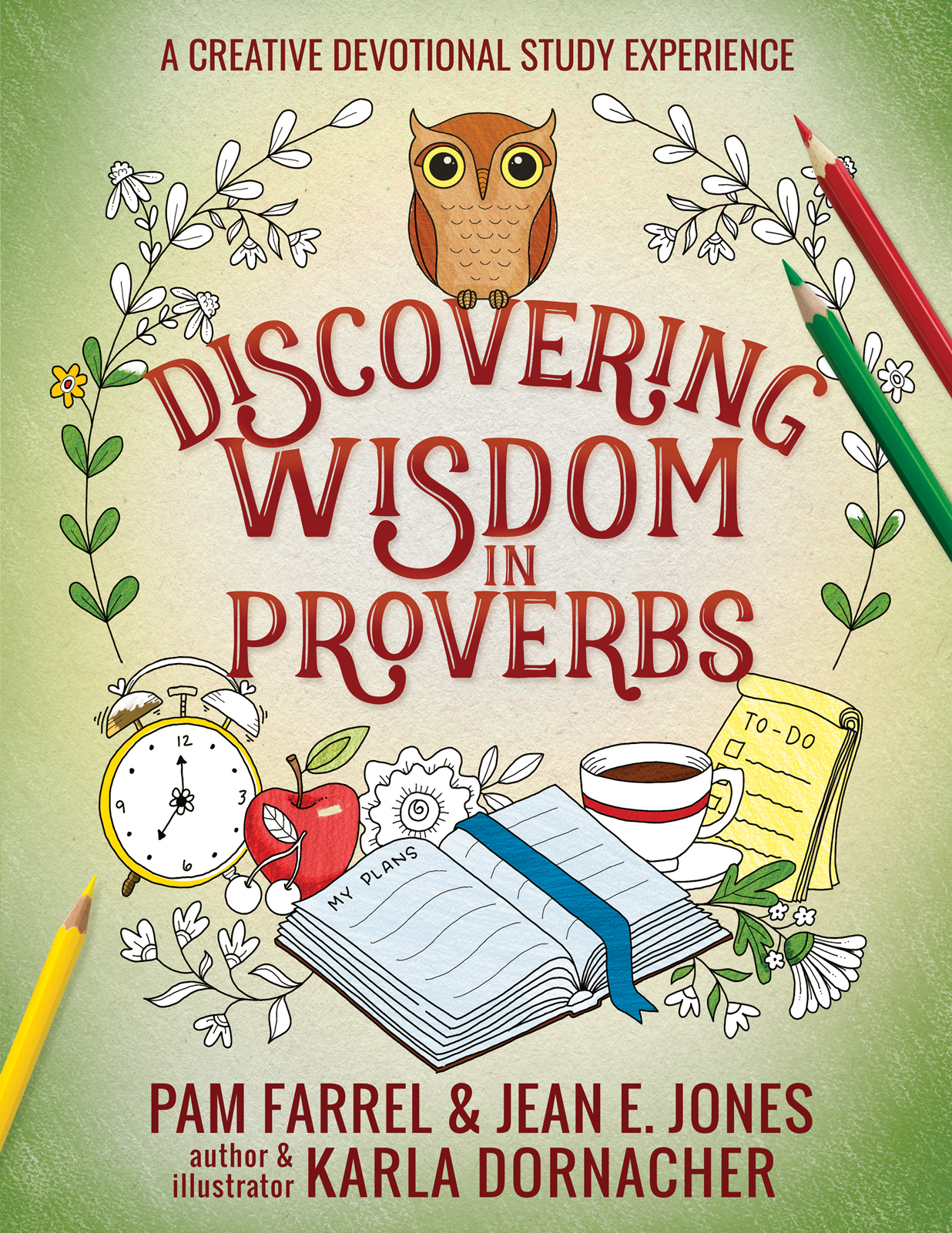
Read more in Discovering Wisdom in Proverbs by Jean E. Jones

Read more in Discovering Wisdom in Proverbs by Pam Farrel

Read more in Discovering Wisdom in Proverbs by Karla Dornacher
0 Comments Leave a Comment »
How Greater Communion with God Leads to True Soul Satisfaction
Posted on Jun 08, 2023 Topic : Inspirational/Devotional, Men's Christian Living, Women's Christian Living

"The soul's deepest thirst is for God himself, who has made us so that we can never be satisfied without him."—F.F. Bruce
God has made us in such a way that we experience yearnings and cravings. Left to ourselves, we are incomplete and insufficient, feeble and sorely lacking. And though we are often driven and motivated by our physical longings, deeper still are our spiritual longings. Just as we cannot live physically without food and water, we cannot live spiritually without spiritual sustenance. F.F. Bruce says the deepest thirst of all is our thirst for God, and the reason is simple: The God who created us formed us in such a way that we are not meant to exist apart from him. To live apart from God is the spiritual equivalent of trying to live without food and water. It will lead only to weakness, pain, and death. This being the case, may we echo King David, who prayed, “Earnestly I seek you; my soul thirsts for you; my flesh faints for you, as in a dry and weary land where there is no water” (Psalm 63:1). This is a prayer God delights to answer, for he loves to meet our insufficiency with his bounty, our emptiness with his fullness.
"God only is the saint's treasure and chief good: he lays up treasure in heaven and this treasure is God."—William Strong
What is it that we, as Christians, long for? What is it that we crave? What is it that will quiet our restless hearts? We want forgiveness, for we know our rebellion. We want joy, for we know our misery. We want justice, for we lament that the righteous suffer while the evil flourish. We want heaven, for we know we deserve hell. There are many longings, many hungers and thirsts, that can drive us to the open arms of the Father. Yet behind them all there is a deeper longing, a brighter treasure, a higher good—God himself. The Bible tells us of a treasure hidden in a field and a man who gave up all he had to buy that field and acquire its treasure (Matthew 13:44). And that treasure is truly God. The greatest longings of our souls cannot be satisfied by forgiveness or joy or justice or heaven or anything else. They can be satisfied only by God, who is himself our treasure, our reward, our joy, our delight, the one without whom we have nothing, and the one with whom we have everything we could ever need.

Read more in Understanding and Trusting Our Great God by Tim Challies
0 Comments Leave a Comment »
How Social Media Is Causing an Anxiety Pandemic—and What Can Truly Cure Us
Posted on Jun 01, 2023 Topic : Men's Christian Living, Women's Christian Living
Posted by : Elyse Fitzpatrick

We’re in the middle of a pandemic. But not that one.
The pandemic we’re in the middle of is self-inflicted. We’re causing it. In some ways, we’re even addicted to injecting the very viruses that cause it. I bet you’ve already done it today. Maybe that’s how you ended up here.
I’m talking about the anxiety pandemic that is caused by the use and overuse of social media.* Like COVID-19, this pandemic has an acronym, too: FOMO: Fear of Missing Out. Social media use is driven by the fear that if we’re not scrolling we’re missing out. “Social media use continues to rise across all ages and demographics. The average is 2.5 hours per day. In social media alone.** And while that’s an average across all ages, our youth spend nearly twice that.
What does social media do? Sure, it entertains. Sometimes those cat videos really are funny. But what else does it do? It insinuates that others are living a meaningful, fun, blessed life. And it forces us to compare ourselves to them. It makes us afraid that we’ll never have the kind of life “they” have. And so, we keep searching and posting and comparing…on and on until we’re bent down under the weight of it all. All this social media consumption is making us sick. It’s making us anxious.
“Anxiety in a person’s heart weighs it down, but a good word cheers it up” (Proverbs 12:25). We’re weighed down with the worry and fears that we’re not…enough. We need a good word instead.
A Good Word
Here is the vaccine you need: You don’t need to mine for likes to know you are okay. You don’t need more friends or followers in a virtual world to find rest in knowing that you’re welcomed and loved. You don’t need to put special filters on your selfies to prove that your life is so, so pretty. You don’t need to compare yourself to others…in fact, you should ask the Spirit to help you resist that comparison impulse.
Questions like, “Am I as popular/beautiful/free…” are nothing new. Adam and Eve suffered from ancient FOMO.They were the first but not the last. Fast forward a bit to the story of Joseph and his brothers and you’ll see FOMO again. Father loves him best! He got a new coat! Fast forward once again and see how even the execution of Jesus was caused by the fear of missing out on the power and love of others:
- Matthew 27:18, “…it was because of envy that they had handed him over.”
- John 11:48, “If we let him go on like this, everyone will believe in him, and the Romans will come and take away both our place and our nation.”
Sure, the question, “Am I as okay as others?” has always been asked. But things have changed with the internet. Now, the question taps us on the shoulder thousands a times a day, driven by a global community who, just like us, is searching for freedom from the anxiety that whispers, “You’re not enough.” Everyone else is. But you’re not. Look. See how you don’t measure up. Keep looking.
What’s the good word you need? Is there a vaccination? A cure? It’s really simple. Here it is in the words of the Apostle Paul: “…God will also count us as righteous if we believe in him, the one who raised Jesus our Lord from the dead. He was handed over to die because of our sins, and he was raised to life to make us right with God.” (Romans 4:23-25 NLT).
What’s the answer to our all-pervasive fear that we’re not enough? Proverbs tells us that we need a good word…and that’s what the word “gospel” means. Like the ancient fear of missing out, the ancient word of cheer is so simple and so freeing: You aren’t enough. You can’t be. Rest in that truth. But that’s not all. Someone who loves you was enough in your place.
You are more loved and welcomed than you ever dared hope. Knowing that you’re loved, that you can’t be any more “okay” than you already are, is the only good news there is. “…God will count you as righteous if you believe in him.” You are okay. You won’t miss out.
Listen, friends. Ultimately, it really doesn’t matter if someone “hearts” your post. In 10 years, or even 10 minutes, no one will even remember that picture of a beautiful coffee drink and dessert you shared. The only judgment that will reverberate for eternity is the one that has been spoken over you because you’ve trusted in the perfect life, death, and resurrection of Jesus Christ.
A day will come when social media and all our FOMO will vanish…like a dream. It will be gone. And if you’ve transferred your trust off yourself and onto Jesus to forgive you and make you okay in God’s sight, then his perfections will be yours.
Don’t look to social media to prove that you’re okay. Instead cast all your anxiety on him, because He cares for you (see 1 Peter 5:6-9a). You might pray something like this:
Lord, I don’t feel like I’m good enough. Please free me from this self-absorption and help me trust that you will do what you said you will: You’ll forgive me and counted me as perfect. And please, Lord. Help me disconnect from social media and everything that draws my heart to look away from you. Help me resist, knowing that you have said that you love me and that’s all I need.
*In this short blog, I will only concern myself with the form of anxiety that is caused by social media consumption. I’m not talking here about other forms of anxiety or about debilitating anxieties that have a physiological component.

Read more in Overcoming Fear, Worry, and Anxiety by Elyse Fitzpatrick
0 Comments Leave a Comment »
More than Motivation: The True Heart of Inspirational Prayer
Posted on May 25, 2023 Topic : Inspirational/Devotional, Women's Christian Living
Posted by : Harvest House

Inspiration:
- the process of being mentally stimulated to do or feel something, especially to do something creative
- a sudden brilliant, creative, or timely idea
- the drawing in of breath; inhalation
What does an inspirational prayer look like? Many would think along the lines of the first definition of the Oxford English Dictionary cited above—words that stimulate us to do or feel something. We all find ourselves in seasons where hope feels illusive and we long for the right words to encourage our hearts to feel differently.
As women, we experience these dry seasons in unique ways. We’re often so busy, so worried, so stressed, so interrupted, so burdened, and so unsure. Our attention is demanded, and so we never seem to have a moment to catch our breath, let alone breathe deeply. Either the world outside requires much from us, or our own racing thoughts distract us from filling our lungs deeply with life and exhaling with a sense of peace.
Which brings us back to the idea of inspirational prayer…not in the sense of the first two definitions, but in the sense of the third: the drawing in of breath; inhalation.
So where do we start? Well, the original breath.
The Spirit of God has made me, and the breath of the Almighty gives me life (Job 33:4).
But He didn’t just breathe life into us and then walk away. He continuously offers it through the Bible.
All Scripture is breathed out by God and profitable for teaching, for reproof, for correction, and for training in righteousness (2 Timothy 3:16).
There’s the breath! Catch it! Breathe deeply again and again. God initially breathed life into humanity, and He continues to breathe life into us through His written Word.
In every season, God offers us His life-giving breath to fill us up and push out the brokenness that would attempt to fill the vacuum. In seasons of famine, when I feel no better than a valley of dry bones, I can trust the Lord, who says, “Thus says the Lord God to these bones: Behold, I will cause breath to enter you, and you shall live” (Ezekiel 37:5).
In the seasons where I feel God’s presence, love, and grace keenly, I can trust Christ, who offers even more: “[ Jesus] breathed on them and said to them, ‘Receive the Holy Spirit’” ( John 20:22).
This is the prayer life of the Christian—the constant breathing in and breathing out of God. It’s inhale, exhale, again and again. It’s repetition. It’s perpetual. A never-ending rhythm. To stop is to deprive us of the oxygen that feeds body and soul.
Breathe deeply and be inspired by the Word of God and then let it guide your prayers back to Him.
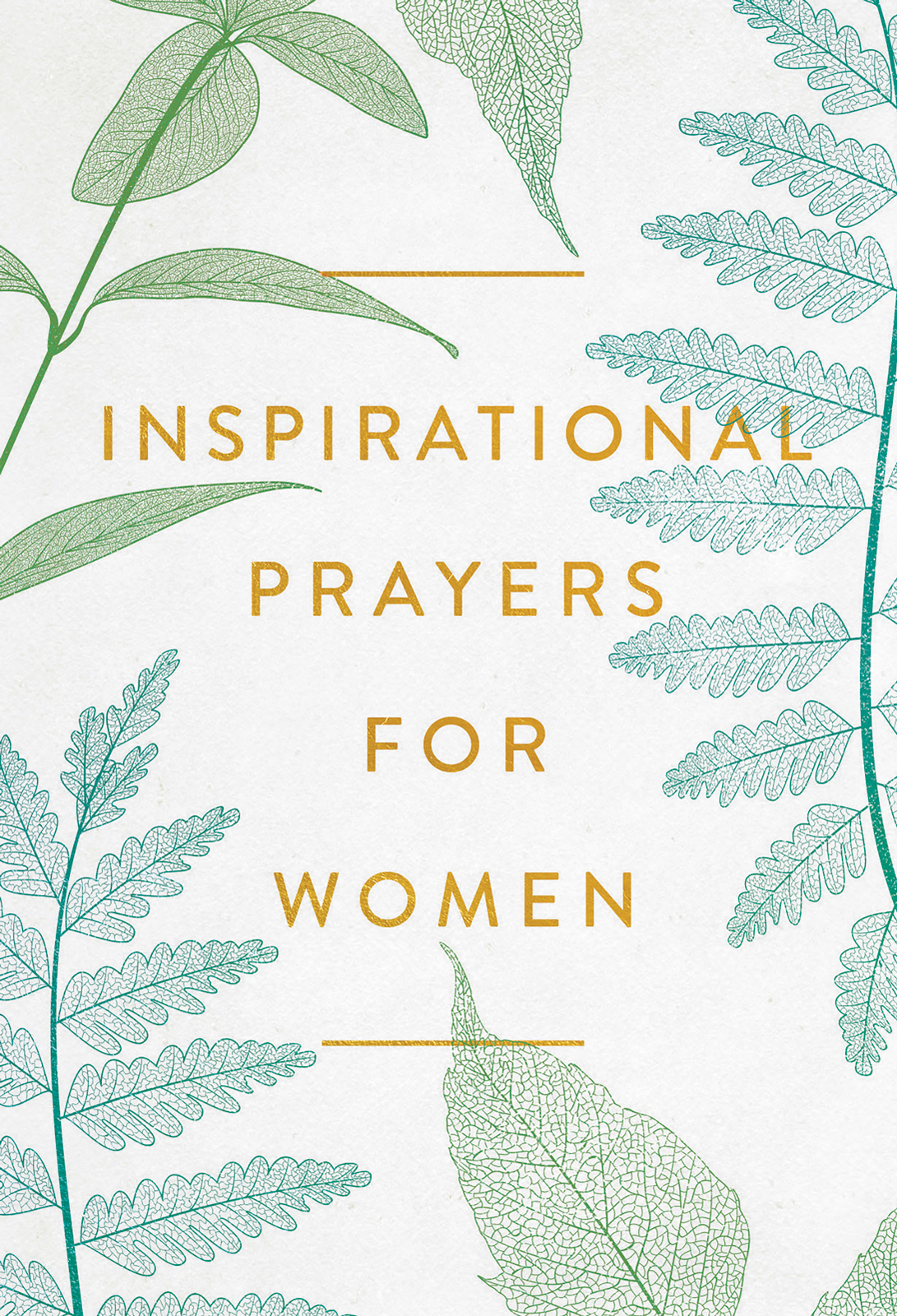
Read more in Inspirational Prayers for Women by Harvest House Publishers
0 Comments Leave a Comment »
How to Enjoy the Ride No Matter Where God Is Leading You
Posted on May 18, 2023 Topic : Men's Christian Living, Women's Christian Living
Posted by : Aaron Dillon

Having worked in the publishing industry for close to two decades, I can tell you that book projects are often conceived and scheduled years in advance of when they become actual books. This is especially true of Christian publishing, where prayer and planning often intersect. We trust God that books will be completed in his perfect timing and meet the current needs of readers.
Recently, I worked on a project that started out as a simple addition to a children’s activity book, but quickly evolved into its own full-scale release. This unexpected endeavor never followed a typical timeframe or an orderly, detailed schedule. As with many “God things,” it just came together at the right time.
These moments are many and when they happen, they are proof of a divine providence far beyond our limited human talents. But our journey to these serendipitous spiritual appointments can be fraught with worry and second-guessing.
What if I’m I taking a wrong turn?
Is this truly God’s timing?
What if I’m following the wrong path entirely?
Though it’s easy to dwell on such doubts, by doing so we can often miss out on experiencing the pure bliss of God’s supernatural provision in our lives. How can we more fully enjoy the unplanned and unexpected adventures we encounter as believers?
Avoid the Pressure of Imagined Expectations
In the Bible, the word expectation is only used a handful of times and in most of those instances, it would serve us well to understand that hope requires more faith than expectation does. Had I realized sooner that no one was expecting this side project to become its own book, I could have experienced more joy and freedom in the process. The expectations I was laboring to meet never truly existed.
Embrace the Unexpected
Asger Jorn, a Danish artist and author, once said, “A creative train of thought is set off by the unexpected, the unknown, the accidental, the disorderly, the absurd, the impossible.” Having this mindset as we begin any project allows us to give ourselves more grace and often yields better results in the end. When the Lord leads us in a different direction, it’s often for the purpose of growing our God-given capacity for problem solving and ingenuity. Other times, these abrupt detours compel us to set aside our human understanding and rely solely on him for inspiration and enlightenment. The more we can start to view these unexpected U-turns as opportunities to deepen our faith rather than ominous stressors, the more joy and fulfillment we’ll find along life’s winding road.
Remember Who Is Ultimately in Control
Regardless of circumstances or outcomes, we can trust in God’s sovereignty. We can move forth with confidence that He always wants what’s best for us. (Jeremiah 29:11) Amid the unexpected, the unplanned, or the unforeseen, God walks alongside us. (Deuteronomy 31:8)
Given our human frailty, these reminders don’t amount to a foolproof method for avoiding anxiousness, doubt, or other unsettling emotions when faced with life’s uncertainties. However, we can feel greater peace in trying times as we more readily recognize God’s presence. Most important, we can greet the great, unplanned adventures God has in store for us with greater joy and anticipation!
0 Comments Leave a Comment »
What Can the Bible Teach Girls About Love, Joy, and Peace?
Posted on May 11, 2023 Topic : Men's Christian Living, Women's Christian Living

Beloved author and trusted Bible teacher Elizabeth George shares wisdom from the Bible about how girls can experience the first three fruit of the Spirit—love, joy, and peace. Share this article with your daughter today!
***
But the Holy Spirit produces this kind of fruit in our lives: love, joy, peace, patience, kindness, goodness, faithfulness, gentleness, and self-control (Galatians 5:22-23).
The Holy Spirit gives you the ability to understand the spiritual truths of the Bible. The Spirit also provides what you need to be a girl after God’s own heart. Evidence of the Holy Spirit at work in your life is revealed in what is called “the fruit of the Spirit.”
Throughout the Bible, “fruit” refers to the outside evidence of what is on the inside. Every person who has received Jesus as Savior has the Lord living within them (1 Corinthians 6:19). God’s presence is evidenced as good “fruit” or godly character. Let’s learn more about each individual fruit of the Spirit. Let’s see what your life will look like when you walk by the Spirit—when you exhibit the fruit of the Spirit.
You will demonstrate love
Love is self-sacrifice. Love is not merely an emotion. Love is an act of the will. Love involves effort, not merely emotion. Love demands action, not just feelings. Love is something you do, not something you only feel or say.
You will display joy
When the sun is shining brightly in your life, it’s easy for you to be happy. But when life turns dark and stormy and things aren’t going your way, you are not quite so happy, are you? You will always find joy “in the Lord.” Joy has nothing to do with your situation, but everything to do with your relationship with Jesus. In Jesus you can experience joy anywhere, anytime, no matter what is happening! What is the greatest trial or disappointment you are facing today? Whatever it is, turn to God for His joy.
Joy is not dependent on circumstances, but on the spiritual realities of God’s goodness. Joy is not merely an emotion, but the result of choosing to look beyond what appears to be true in your life to what is true about your life in Christ.
You will have peace
I like to call peace “the sacrifice of trust.” You make the sacrifice of trust when you face pain and stress in your life and choose to trust God instead of stressing out. Note the reason you can experience God’s peace: Don’t worry about anything; instead, pray about everything. Tell God what you need, and thank him for all he has done. Then you will experience God’s peace, which exceeds anything we can understand. His peace will guard your hearts and minds as you live in Christ Jesus (Philippians 4:6-7).
Peace comes with knowing that Your heavenly Father is continually with you. Peace also comes with acknowledging that God will supply your every need.

Read more in A Girl's Guide to Studying Her Bible by Elizabeth George
0 Comments Leave a Comment »
Why Should You Read Revelation? Pondering God’s Final Chapter in His Word
Posted on May 09, 2023 Topic : Men's Christian Living, Prophecy, Women's Christian Living
Posted by : Jeff Kinley

When we come to the last book of the Bible, we would expect a dramatic and powerful conclusion to God’s grand story and message to us. Think about this: God could have ended his written revelation to us any way he wanted to. As an author, I do the same. I carefully consider how I conclude my books. What do I want the reader to know, think, feel, or do upon turning the last page? What do I want to impress upon him? How do I wish her to respond?
And God, being the master storyteller and consummate communicator, did the same with his book. He could have finished the Bible with a message on how to love one another, or how to be good Samaritans to our neighbors, or even by reviewing and summarizing some of the important truths he had previously communicated.
But he didn’t.
Instead, he finished his magnus opus with a book that is 95 percent prophecy. As such, Revelation is almost exclusively a book about the future. But why? Why tell his first-century audience about prophecies that not only wouldn’t end up happening in their lifetime, but wouldn’t be fulfilled for at least 1,900 years?
I suppose the original hearers and readers of Genesis, Isaiah, Jeremiah, and Micah could ask the same question, for they, too, were given prophecies that were eventually fulfilled many hundreds of years after they were first given. But this highlights the very nature of prophecy—that it is primarily a foretelling of future events and not necessarily things that are happening “in the now.”
So why did God end his written Word with a book on future prophetic events? Because he has unfinished business to attend to. And because…
- He has a bride to rescue (John 14:1-3; 1 Thessalonians 4:13-18).
- He has a people to redeem (3 Peter 3:9; Revelation 7:9-17).
- He has a planet to punish (Revelation 6–19).
- He has a nation to restore—Israel (Romans 11:25-26).
You see, the story isn’t over. There is yet coming a climactic season-ending episode. A closing act.
A grand finale.
God wrote Revelation because he wants us to know about that finale, and to respond to it (Revelation 1:3). He wants us to be aware of coming world events and to spot the signs leading up to the end times. He wants us to enjoy a sneak preview of our future home in heaven. He also knew that in these last days, there would be a pandemic of confusion, ignorance, and uncertainty. Fear is currently outpacing faith among God’s people. In the church, confusion is clouding clarity. Ignorance is spreading faster than knowledge. And uncertainty is overshadowing confidence.
The ultimate antidote to ignorance is truth—God’s truth.
The book of Revelation is a climactic book of knowledge, not confusion. It is not an enigmatic, apocalyptic code only to be broken by a select few experts, but rather, a book of enlightenment to be read, heard, understood, and obeyed by everyone who traverses its pages (Revelation 1:3).
In its very first verse we discover Revelation to be a book about God. It is “the Revelation of [from, about] Jesus Christ.” It comes through an angel, to John, and for his bond-servants (the church). And what will the book cover? “The things which must soon take place” (1:1). Revelation is the only book in the Bible that comes with a certain kind of promised blessing for a certain group of believers—namely, those who “read, hear, and heed the words of the prophecy” (verse 3).
Why is this blessing for the readers of Revelation so important? Verse 3 concludes, “For the time is near.” If it was near when John first wrote those words, it is even nearer to us today. Open Revelation and let’s prepare for God’s grand finale.

Read more in God's Grand Finale by Jeff Kinley
0 Comments Leave a Comment »
7 Great Gift Ideas for Mother’s Day
Posted on Apr 28, 2023 Topic : Inspirational/Devotional, Men's Christian Living, Women's Christian Living
Posted by : Harvest House Publishers

With Mother’s Day coming up fast, it’s time to start coming up with gift ideas for Mom! Here are seven new books she’s sure to love.
With Teatime Discipleship, Sally Clarkson will invite you in, pour you a cup of tea, and share with you what she’s learned about how our incredible Lord reveals His glory through our home life, relationships, and daily responsibilities.
With carefully crafted intention, this special collector’s edition of Ruth Simon’s bestselling volume of seasonal devotions comes beautifully packaged in a Ruth Simons signature keepsake box and includes 64 additional pages of watercolor art.
This deluxe edition of the bestseller includes three all-new chapters. Join Emily Jensen and Laura Wifler as they reveal how the gospel applies to your everyday life, bringing hope, freedom, and joy in every area of motherhood.
Mama-of-ten Abbie Halberstadt helps women humbly and gracefully rise to the high calling of motherhood without settling for mediocrity or losing their minds in the process.
Author Rhonda Stoppe provides the biblical hope, wisdom, and encouragement you need to help your son live a life without regrets!
This beautifully photographed guide shows you how to enjoy the many gifts the garden offers inside your own home, transforming your living spaces into places filled with warmth and wonder.
Gathered in this charming little book are prayers in pairs: One for you, Mom, and a corresponding one for your children. Each set covers a topic dear to your mother's heart—your children's relationship with the Lord, their growth in faith, their health, family and friends, and so much more.
0 Comments Leave a Comment »
Why Is it Important to Help our Kids Learn About Their Feelings?
Posted on Apr 27, 2023 Topic : Men's Christian Living, Women's Christian Living
Posted by : Katie Kenny Phillips

My 10-year-old daughter was having a particularly rough morning the other day. Mornings just seem to be tough, in general (am I right, mamas?!), but she was grumpier than usual. I found myself getting really irritated. Why do mornings have to be so ugly? Why can’t she recognize that she is being unkind to me when all I’m trying to do is help her?
That’s when I realized there was something else going on. I remembered she had a test scheduled for that day and was very, very nervous. Of course, she wasn’t saying, “Mother, I’m so sorry I’m being particularly crabby with you this morning but I’m anxious about a timed test this morning and I have very high expectations for myself. I don’t want to let you, my teachers, or myself down by doing poorly.” Nope. It came out more like, “MOOOOOOOOOOOOOM. STOOOOOP IT!” I think she may have even said I was being “cringe.”
It was helpful to figure out what was going on underneath the surface, so we could start to deal with it. I was able to encourage her that I thought her test was going to go well. I told her all we asked of her is that she try her best. I told her I’d be praying for her throughout the day to stay calm and remember everything she had studied. As our little ones start to learn to communicate, we want them to start learning about their feelings. We want them to be able to stop lashing out at other people and think, wow, I’m really nervous about my test and I’d like some reassurance that everything is going to be ok.
***
So, what are some of the big reasons why it’s important for kids to learn and grow in their social-emotional learning? And what are some ways we can help them?
It’s Important That Children Learn to Dive Deeper Than Just Mad and Happy
When kids are babies, it seems as if they operate between happy and furious. There's no in-between. Feed them, cuddle them, change their diapers, allow them the rest they need. This equals a happy baby (most of the time.) But if you are one nanosecond late with any of the above actions, that equals a furious baby. As kids get older, however, it makes sense to start identifying a few of their other emotions and labeling them.
For example, when we need our toddler to get ready to walk out the door, they most likely will be angry they have to stop their fun playtime. We can say, “You sound frustrated that it’s time to put your toys away. I understand that! But we’re getting ready to leave and we’ll look forward to bringing the toys out later when we get home.” Yes, our toddlers may be mad, but it doesn’t stop there. They’re frustrated that we are forcing them to stop something they’re enjoying. We’re having them follow our timeline, not theirs. Let’s teach them to name those emotions, rather than stopping at “mad” and then being irritated that they’re upset.
When Our Kids Sense They Are Having a Feeling, We Want Them to Be Curious
As we continue to label the deeper feeling underneath our kids’ reactions and behaviors, the goal is to teach them to be curious. We don’t want them going through life just flying off the handle and reacting without ever taking the next step to stop and ask themselves, why might I be feeling this way right now?
We can have them practice figuring out why they may be feeling a certain way from an early age. I’ve always played the game “Be a Detective” with my kids. Whether they’re asking where the ketchup is, where their missing shoe might be, if they’re losing their cool with a sibling, or if they’re feeling sad, I ask them to be a detective and try to figure out what’s going on. We want our kids to be curious about themselves and their emotions. It is a necessary step in getting unstuck and moving forward.
When Our Kids Are Curious About Their Own Feelings, They’ll Become Curious About the Feelings of Others
When kids learn that a behavior is not necessarily the whole story, they can start being curious about other people’s emotions as well. I remember a time when I had gotten concerning news about a dear friend of mine and I was really worried. As I was making dinner that night, I guess I was a little sharp with my words to one of my kids and he stopped me and said, “Are you angry right now?” I was so proud of him! I wasn’t angry. I was scared for my friend and it was coming out as impatience with a child who had nothing to do with that situation.
We want our kids to show compassion and empathy to others as they grow older and it helps when they are curious about people’s feelings.
So let’s help our little ones (and our big ones) figure out what may be going on underneath the surface. Let’s introduce more complex emotions so they become curious about themselves and others. It helps them—and us—better understand each other. And we can all feel good about that.

Read more in Today I Feel Like a Jelly Donut by Katie Kenny Phillips
0 Comments Leave a Comment »
How God’s Design for Motherhood Can Help You When You’re Struggling
Posted on Apr 20, 2023 Topic : Inspirational/Devotional, Women's Christian Living
Posted by : Emily Jensen and Laura Wifler

Man was created first, and then woman was created from him to be his helper. She wasn’t a helper in the sense of being less valuable than Adam; rather, he needed help—it wasn’t good for him to be alone. On his own, he was missing something in his ability to live out God’s instructions. There would be no good work or future generations without woman. Eve would be a complementary image-bearer with equal value, but as a female, she imaged God in different ways than Adam did.
In the original language, Eve’s name sounds like “life.” The account in Genesis says, “The man called his wife’s name Eve, because she was the mother of all living. And right there, in the third chapter of the Bible, we find the concept of motherhood.
The word “mother” has multiple layers of meaning. Eve had the potential to be a biological mother, but she also represented a spiritual purpose all women can relate to: to invest in and nurture the family of God as life-givers. In the context of the whole Bible, spiritual mothers play essential roles in the redemptive story. We see them passing on God’s promises to future generations, boldly protecting the lineage of God’s people, training and discipling those around them, heralding the good news, and more.
God’s physical design for Eve tells us something about his purpose for motherhood.
Eve had a womb—a perfect environment for growing a child until he or she entered the world. After birth, Eve could feed the baby with a perfect cocktail of nutrients in her breast milk. A baby could be nurtured by her bosom, have skin-to-skin contact, and experience necessary physical love at least every few hours for the first years of life. Because filling the earth was a part of God’s instructions for Adam and Eve, this pattern likely would have repeated itself many times. Bearing and raising children would have impacted her rhythms of work and how her days were ordered and filled.
There is a spiritual design to motherhood as well.
Throughout the rest of Scripture, we see moms are essential to the spiritual upbringing and formation of their children’s character. Together, moms and dads are tasked with teaching children the redemptive story along with God’s character and law. Parents should train their children in wisdom (discerning right from wrong) and faithfully discipline with love and self-control. All of this is done with the hope of seeing their children walk in righteousness. Myriads of books are available about the ins and outs and practical how-tos for today, but overall, a mother is meant to model God’s love, instruction, and discipline for her children.
This gets to the heart of motherhood: God’s design, both physically and spiritually, reflects the heart of the greatest Life Giver to the world.
He is the ultimate Creator of life, the ultimate nurturer and provider, and the compassionate, gentle one who supplies our needs when—like our own babies—our only capacity is to cry for help. God’s love for his people is compared to the fierce, protective compassion a nursing mother has for her own helpless child. This is how he cares for us! As a mother shows mercy to her helpless child, he shows mercy to helpless people. God also lovingly trains and disciplines us as his children, making us more into the likeness of Jesus.
What does this design for motherhood mean to us when we’re struggling?
First, it moves our heart’s desire for satisfaction from “how we mother” to finding it in God, the true Life Giver and Helper. Second, it doesn’t allow us to just lower the bar or brush past God’s design. Instead it compels us to understand why we struggle and where we find hope. It bids us to keep walking through the narrative of the gospel to see God’s good news for hurting moms.

Read more in Risen Motherhood by Emily Jensen and Laura Wifler
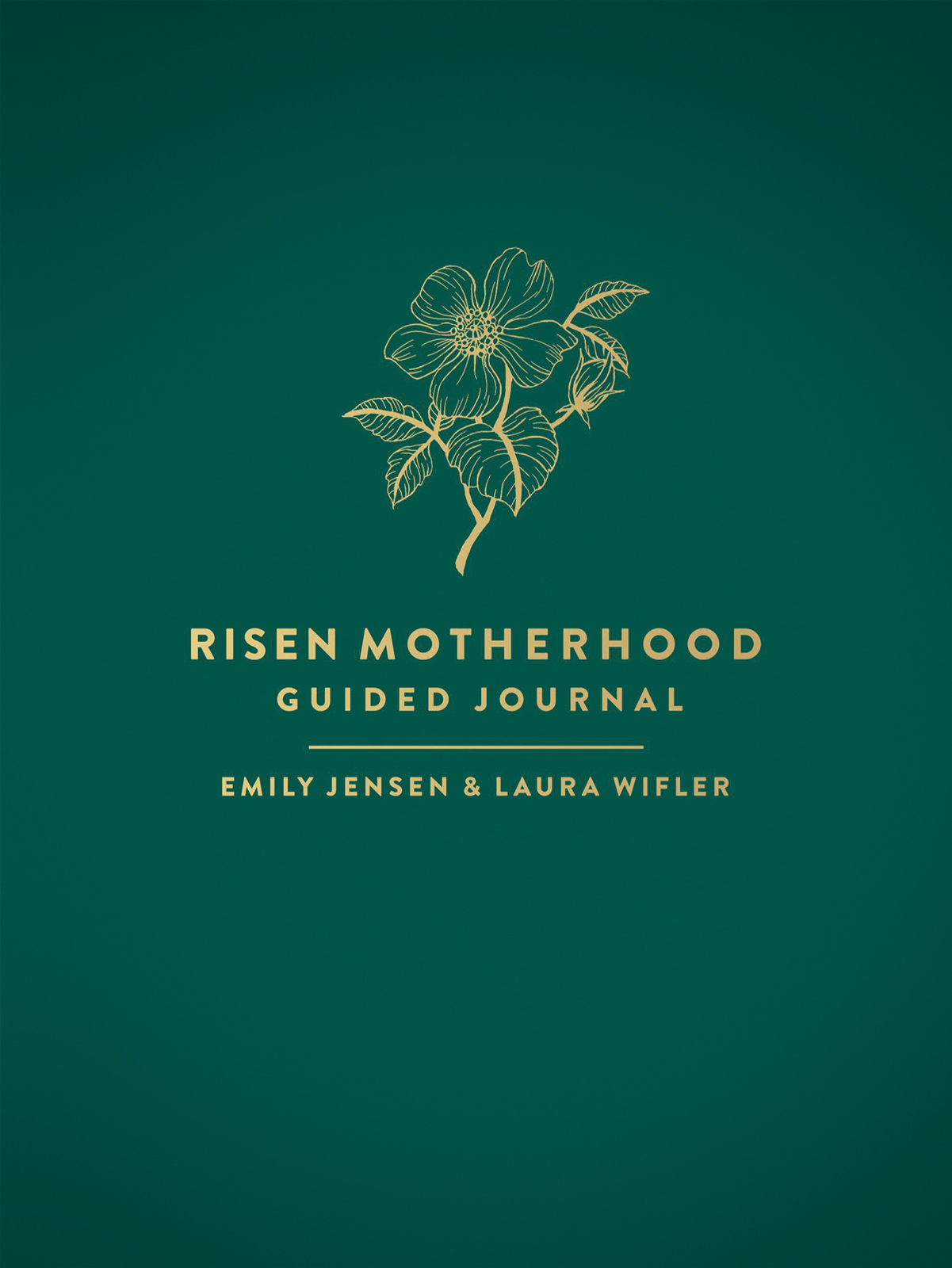
Read more in Risen Motherhood Guided Journal by Emily Jensen and Laura Wifler
0 Comments Leave a Comment »
How to Avoid Life in the Rough: An Insider Lesson from Golf
Posted on Apr 13, 2023 Topic : Inspirational/Devotional, Men's Christian Living, Women's Christian Living
Posted by : Steve Chapman

Let him who thinks he stands take heed lest he fall. (1 Corinthians 10:12 nkjv)
Two words I mutter to myself from time to time on the practice range often bring to mind the apostle Paul’s warning to the Corinthians noted in today’s verse. Those words are, “Just when!”
To explain, it’s when I think I’ve found a fix in my swing—perhaps a slight tweak in my grip or my takeaway—that results in a half‑dozen string of well‑hit shots. Then, as excitement swells at the prospect of reaching a new level of consistency, suddenly the next ball flies way left, or way right, or goes dribbling pitifully a few yards in front of where I stand.
Puzzled by not knowing what went horribly wrong and feeling my ego deflate like a party balloon that got in the way of a stick pin, I mumble with disgust, “Just when.”
That’s my short way of saying, “Just when I thought I had this game all figured out and I am ready to apply for a tour card, get a manager, and hire a caddie, I fall back into a swing‑damaging habit.”
For a span of a few shots I thought I stood faultless and my swing would never fail me again. The truth is, I was distracted by a belief that I was better than I am. I didn’t “take heed” that I was capable of forgetting the basics and thinking only of the glory that can come with a well‑hit driver or iron.
The practice range is not the only place to have a “just when” moment. It can happen off the course too. For example, we can have a few victories over a certain sin—such as an addiction to alcohol, pornography, or gambling—and begin to proudly think we’ve conquered the problem. Then, while pompously basking in the distracting glow of success, we forget that the enemy of our souls still lurks nearby with temptation. Next thing that happens is, the ball of joy is heading into the deep rough.
The question is, how can we avoid the “just when” moments in our lives? The first step is to understand that, just like in golf, where we are bound to go out of bounds on occasion, so it is true as followers of Christ. We are smart to embrace the “take heed lest you fall” warning and accept the fact that none of us are beyond being tempted.
That admission will then lead to trusting and leaning on the gracious promise that follows in the next verse: “No temptation has overtaken you except such as is common to man; but God is faithful, who will not allow you to be tempted beyond what you are able, but with the temptation will also make the way of escape, that you may be able to bear it” (1 Corinthians 10:13 nkjv).
How good of God to include such an incredibly encouraging and comforting assurance to His followers that He recognizes our weaknesses and is willing to help us get through them. And adding to that good news, just like our bad shots on the course can have an escape route, so it is with temptation. He’ll provide a way of escape so that we can get back on the fairway of righteousness.
Heavenly Father, I thank You that You reveal Your strong love for me in my weaknesses. I confess I am prone to proudly think I can stand alone against temptation, but I know it’s not true. How good of You to not allow me to be tempted beyond that which I am able to handle. When I am tempted, I will lean on You to help me see the way of escape You provide. Blessed be Your name for such kindness. Amen.

Read more in A Look at Life from the Fairway by Steve Chapman
0 Comments Leave a Comment »
Time Is Limited: How Christians Can Best Use It
Posted on Apr 06, 2023 Topic : Men's Christian Living, Prophecy, Women's Christian Living
Posted by : Amir Tsarfati

In the Western church, we don’t understand persecution. If you want to know what being a Christian can cost you, look to the pastors who are in Iranian jails. Or go to the hidden house churches in China. Or listen to the testimonies of the Nigerian survivors of Boko Haram attacks on their churches. That is true persecution. What we are experiencing in the West is inconvenience. But true persecution is coming for the tribulation believers.
For us now, the worst we will likely experience due to the sharing of our faith is some awkwardness, maybe a few tough questions, and possibly some embarrassment when we aren’t sure of the answers.
But the problem isn’t just that Christians don’t want to risk a conflict by sharing their faith. Most don’t even think about it! It’s not part of their lifestyle. They have bought into the satanic mindset that this life is about them—their comfort, their contentment. As a result, they waste their lives with wasteful living. What is wasteful living? It is all that time, money, and effort focused on yourself and your happiness and your stuff.
We have been given the free gift of salvation. And we are expected to use it. Being a Christian is more than just possessing a ticket to heaven. When we say yes to Jesus, we are not just becoming part of His family, we are joining up with His workforce. He has created us and called us to Himself, and now He is ready to deploy us to the tasks that He has specially prepared for each of us individually.
The temporal focus says, “I’ve got to get all the enjoyment I can out of this life now. I’ve got to see all I can see and do all I can do. I’ve got to visit all the places I want to go to. My bucket list runneth over, and I’ve got to check off every item.” This is a perfectly understandable mindset if you know nothing about eternity. But we know better. Jesus said,
If anyone desires to come after Me, let him deny himself, and take up his cross, and follow Me. For whoever desires to save his life will lose it, but whoever loses his life for My sake will find it (Matthew 16:24‑25).
Those are familiar words for anyone who has been a Christian for any amount of time. The question is, are you truly living it? Are you denying yourself for the sake of your mission? Are you sacrificing your comfort in pursuit of your calling? There are many Christians who would be willing to die for their faith. But how many are genuinely living it day by day by day? Paul compared our lives to a race, writing, “Do you not know that those who run in a race all run, but one receives the prize? Run in such a way that you may obtain it” (1 Corinthians 9:24). What does it look like to run to win?
Look at Paul’s life in 2 Timothy 4:6‑8.
He ran hard until the end, always mindful that each day could be his last, whether through death or rapture. We must live the same way, because by death or rapture, each day might also be our last. Time is short; don’t waste it on yourself.

Read more in Has the Tribulation Begun? by Amir Tsarfati
0 Comments Leave a Comment »
How Do You Become a Great Dad? It Starts with Desire
Posted on Mar 30, 2023 Topic : Men's Christian Living, Women's Christian Living
Posted by : Jerrad Lopes

As I was leaving the hospital where my fourth baby had just been born, another dad joined me on the elevator down to the parking lot. His wife had just given birth to their first baby the day before, and he was rushing down to get the car ready for their departure. I was standing in the back of the elevator as he hurried to get on before the doors closed behind him. I couldn’t help but smile as I watched him.
“Congrats, man. You’re probably really excited,” I said to him as I watched him fumble his bags. Based on the amount of stuff he was trying to juggle, you would have thought he was leaving on a three-week trip to the desert. He had three massive water jugs in one hand, two suitcases, a diaper bag nearly choking his neck, and a car seat tucked into the crease of his elbow.
“Thanks, man! It’s our first!” he said as sweat dripped off his forehead and down into his eyes.
“Can I help you with any of that?”
“No, that’s okay. I think I’ve got it.” He settled into a much-needed pause as the elevator doors closed and took us down to the lower level.
“You visiting someone?” he asked after gathering his breath. His eyes were looking down at the box of cookies I was holding in my right hand.
“Oh, no. We just had our fourth. I’m headed down to pick up the car.” “Nice! And…all you have is a box of cookies?”
I sat there in silence for what felt like fifteen minutes.
“Um…I guess I’m just now realizing that this is basically all we brought to the hospital.”
We both started laughing like we were old friends sharing an inside joke.
As I sat down to write tonight, I started to think about my interaction with that dad on the elevator. It struck me how excited he was and how hard he was trying to be a great dad for his baby from day one. Even in my very brief interaction with him, I got the sense that this was the greatest day of his life, and he was going to do everything in his power to make sure he was the kind of husband and father that his family needed him to be.
I don’t think he’s alone in that.
For many of us young dads, we long to do more than just pay the bills and keep a roof over the heads of the ones we love. Our childhoods taught us that our souls need more than food on the table. Our hearts need to be engaged. Our longing for adventure needs direction. Our wandering soul needs a guide to show us the way. Something deep in our bones knows that our role as a husband and father is so much more than simply showing up. And whether we can find the words to articulate it or not, there is something deep within us that drives us to be more than the men who have gone before us. Not that all the men who have gone before us have failed (although some have—majorly) but that we should take the baton that has been placed in our hands and run farther with it.
It’s that internal longing that almost instinctively motivates us to go down the slides, wash the dishes, cook a meal, practice ballet, wrestle on the floor, play hide-and-seek, and change the diapers.
And because of that, I want to pause and say something to you that you may not have heard in a while, or maybe even ever.
You’re doing a good job, man.
Seriously. Your kids are lucky to have a dad like you.

Read more in The Dad Tired Q&A Mixtape by Jerrad Lopes
0 Comments Leave a Comment »
3 Powerful Prayers You Can Use to Gain Victory Over Stress
Posted on Mar 28, 2023 Topic : Inspirational/Devotional, Men's Christian Living, Women's Christian Living

Stress is inevitable, but God has given us tools in the Bible to help us deal with daily pressures. Consider these three prayerful antidotes to anxiety from author and evangelist Clayton King.
STRESS SOLUTION #1: FOCUS ON WHAT'S RIGHT IN FRONT OF YOU
When you’re stressed out with busyness and to-do lists, it’s so easy to miss something God may be trying to teach you. One small spiritual discipline that has a big positive impact on your life is learning to stop, just for a moment, and pay attention to what’s right in front of you. Being present, noticing your surroundings, paying attention to people and situations—these are the practices God often uses to breakthrough to us, to remind us that he loves us, to nudge us toward an action he wants us to take or a path he wants us to follow. Be encouraged by Proverbs 24:32—“I applied my heart to what I observed and learned a lesson from what I saw.” Wisdom and learning are all around you. Be still and quiet long enough to see it and embrace it as a gift of God.
God, I ask for your assistance as I pay attention to what is right in front of me. Help me focus on what’s happening now instead of trying to figure out everything that’s ahead of me.
STRESS SOLUTION #2: RELEASE PRESSURE BY RUNNING TO GOD
My life, since I was a teenager, has been filled with travel. I’m constantly packing a bag, catching a plane, and watching the clock. Stress is a perpetual companion unless I have a release valve that I can turn to lessen some of the anxiety that comes with being on the go so often. I’ve found that a short, simple pause where I say a quick prayer out loud to God can make all the difference in my attitude. This practice really works. Proverbs18:10 says, “The name of the Lord is a fortified tower; the righteous run to it and are safe.” There is safety and peace to be found in running to God during times of pressure or conflict. Just whispering a short prayer when you’re feeling anxious can usher real peace into a challenging and busy day.
I know that you are always with me, Lord. You’re right beside me no matter what I face, and I thank you for the comfort your presence brings me.
STRESS SOLUTION #3: WAGE WAR ON WORRY
it’s normal to worry about things we can’t control. I sometimes struggle with stressing over money, my family, the future, and people that I love. But even though we tend to worry like this, as the last several years have proven to all of us, we really can’t control anything anyway. Jesus encourages us to wage war on worry. In Matthew 6:25 he says, “I tell you, do not worry about your life, what you will eat or drink; or about your body, what you will wear. Is not life more than food, and the body more than clothes?” The Galileans Jesus was talking to lived on the edge of poverty, so if Jesus tells them they don’t have to worry about these things, how much more faith should we have that God will care for us?
Today I choose to wage war on worry by trusting in your faithful care and provision for my life, God.I know you love me and will take care of me.
***
Looking for more prayers to help you overcome stress and the other challenges in your busy life?
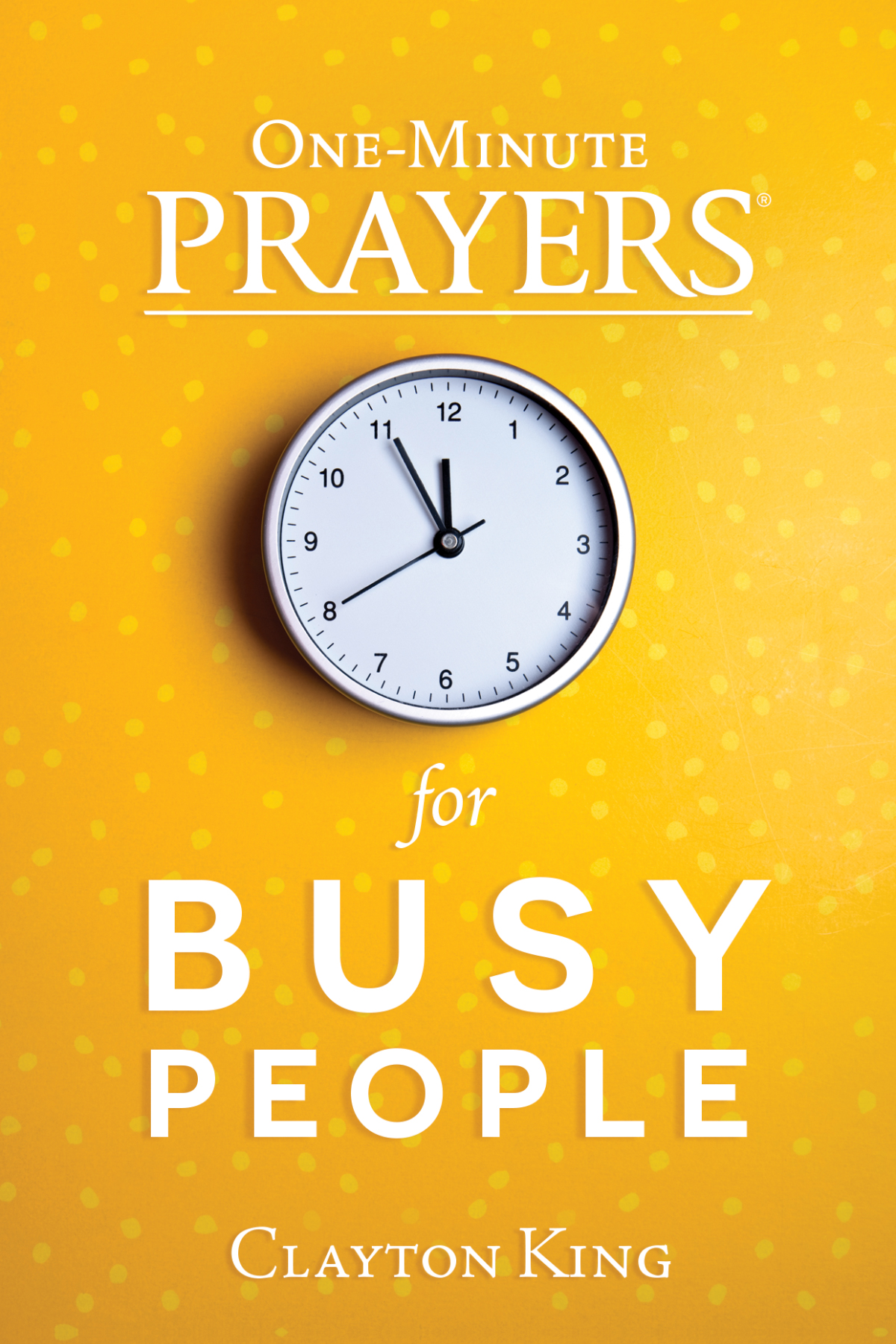
Read more in One-Minute Prayers for Busy People by Clayton King
0 Comments Leave a Comment »
How Reading to Little Ones Helps Them Learn and Grow
Posted on Mar 23, 2023 Topic : Men's Christian Living, Women's Christian Living
Posted by : Shirley Raye Redmond

I recently presented a gift of four board books to a young mother at her baby shower. She thanked me, of course, but later over sparkling cider and lemon cupcakes she naively admitted she just didn’t see the point of reading to babies and toddlers. “It seems like such a waste of time,” she confessed sheepishly. “I mean, they don’t understand what you’re reading about—not really.”
I responded by asking, “But cuddling your baby on your lap is worthwhile, right?”
She quickly agreed. That’s when I went on to add why cuddling with a book is equally worthwhile—maybe even more so.I’ve always found the act of holding a baby while looking at a colorful book together to be a comfort and a pleasure. The benefits of reading to young children—even kiddos who are nonverbal—are many and I shared just a few of them while I helped the new mom load the presents into the back of her minivan.
Babies may not understand everything, but they do respond to sounds and tones.
Being read to helps with their language acquisition. The more words baby hears the more words she will eventually add to her vocabulary arsenal.
By watching your expressions as you read—frowning, laughing, widening your eyes, baby will learn important social development and thinking skills.
Board books are colorful and provide visual stimulation.
Babies will be introduced to colors, numbers, shapes and letters in an easy, attractive way.
Babies who are read to regularly generally become better readers than those children who were not read to.
Board books are sturdy.
Being allowed to touch and turn the pages provides tactile stimulation. Put sturdy board books in a toy box so children can help themselves. My 18-month-old grandson loves to toddle over to the toy basket to retrieve a book.
Don’t worry if your infant or squirmy toddler doesn’t understand everything you are saying. Reading together is a wonderful, shared activity that you to enjoy. So go ahead—cuddle, connect, communicate. You’ll make memories you’ll treasure in the years to come.

Read more in Lead the Way by Shirley Raye Redmond

Read more in Stand Strong by Shirley Raye Redmond
0 Comments Leave a Comment »
How to Grow the Home You’ve Always Wanted
Posted on Mar 16, 2023 Topic : Inspirational/Devotional, Men's Christian Living, Women's Christian Living
Posted by : Christie Purifoy

Do you wish your home was beautiful?
Do you want to create a space that is warm and welcoming? I have wanted that since I was a child using my mother’s hot glue gun to attach tiny wooden shingles to the plywood dollhouse my father built for me. I have wanted that since I was a young newlywed reading home and garden magazines and wishing my home decor budget were bigger—wishing I had a home decor budget, for that matter. Having now lived in quite a few homes and having sought to cultivate beauty in each of them, I have learned something surprising: beauty can’t be bought. Instead, it must be grown. It must be lived.
It is the lives we live in our homes that make them beautiful. I know this to be true, but I also know that this is not a straightforward truth. If it were, then a sink full of dirty dishes would be beautiful. A basket full of unwashed laundry would be beautiful. The pile of backpacks and sneakers my children leave daily on the kitchen floor would be beautiful. Dear reader, as grateful as I am for my family, a pile of smelly sneakers is most assuredly not beautiful. It is perhaps good. It is a sign of life, yes. But it is not the sight I want to see first thing in the morning, nor is it a sign of welcome for my guests.
When I say that our lives can make our homes beautiful, I mean that a home’s beauty is not determined by how well it follows trends or whether the kitchen countertops are made of real stone. What I mean is that by pursuing beauty with our whole selves, we will naturally surround ourselves with beauty. We will create beauty. And our homes will come alive.
I have found no surer method for bringing my own home to life than working to erase the dividing line between creation out there and my home in here. We were each made for Eden, but we have believed the lie that only a special few have the “green thumbs” needed to grow flowers, and houseplants, and whole gardens. Do not believe the lie. You, too, can root yourself in the vitality of creation. You, too, can cultivate life.
Tend a few potted herbs on the kitchen windowsill. Cut some blooming branches and bring them inside. Plant bulbs. Plant a tree! I promise, it isn’t as hard as you might think. It is in these small, intentional ways that our lives become rooted, and our homes become beautiful. Ease into the simple rhythms of a gardening life, and you will find that not only have you made your space beautiful, you have grown your house into a home in bloom.

Read more in A Home in Bloom by Christie Purifoy
0 Comments Leave a Comment »
How to Choose Peace in a Volatile World
Posted on Mar 09, 2023 Topic : Inspirational/Devotional, Women's Christian Living
Posted by : Sally Clarkson

It is far better to light the candle than to curse the darkness.
—William L. Watkinson
As a young missionary in Communist countries many years ago, I cut my teeth on discipleship—“making disciples of all nations,” learning to live by faith in a very foreign place, and holding fast to my Bible. One of my surprises, however, was the prevalence of conflict and issues, at times among the missionaries themselves.
Young and unseasoned, I believed that if someone was brave and courageous enough to go into the mission field, they would probably be superhuman and surely super-spiritual! And yet, living overseas can be so very stressful that it magnifies difficulties. This was the place I began to learn the importance of peacemaking, when disharmony infiltrated the relationships on my staff team. Most were mature believers, but each needed the mercy and grace of God and from me. (Kind of reminds me of marriage!) Discord of large proportions could disrupt our unity, causing multiple issues.
Fighting, warring, and arguing are some of the foundational evidences that this world is separated from God. We war against each other as countries but also as individuals because we are self-centered. We are focused on our own agenda and our own well-being as opposed to focusing on serving and bringing harmony to others. As believers, we should not be surprised by relational conflict; it is a mark of the fallen world. And we, as followers of Christ, are called to redeem broken places.
Becoming a peacemaker in this world is an act of will, an obedience of conscience where we serve God by doing what is right. Maturity in Christ is learning to do what is right because righteousness is deeply instilled in the pathways of our minds and hearts. If we have memorized God’s Word and wisdom principles, when we later encounter animosity—and we surely will, daily!—our minds will already have a plan so we can behave as Christ would have us behave. Truth, understanding, and obedience are partners in peacemaking.
Whether as spouses, parents, friends, siblings, or coworkers, peacemaking—the act of choosing to reach out in the work of restoration—comes from a heart that worships God. Humbling ourselves brings the possibility of unity and restoration as we admit the ways we fail and disappoint people who trusted us. By our own kindness, we can show the world that humility is the bridge to making peace.
James 3:17 teaches, “The wisdom from above is first pure, then peace-loving, gentle, reasonable, full of mercy and good fruits, impartial, free of hypocrisy.” May the Holy Spirit quicken our hearts to obey and practice this truth, that we might bridge the gaps in our relationships with the love of God.
Are there any relationships God is pressing on your heart to restore? Is anything keeping you from making peace with those who are in conflict with you? Do you need to humble yourself or forgive the other person? If I have learned anything from the heart of Jesus, it is that when I choose to obey what He shows me in His Word, that obedience ultimately brings me peace and deep joy. I do not have to carry hate or bitterness; He will relieve me from them when I accept His will for me to make peace.

Read more in Teatime Discipleship by Sally Clarkson
0 Comments Leave a Comment »
Hope When Life Feels Barren: What Desert Flowers Can Teach Us
Posted on Mar 02, 2023 Topic : Inspirational/Devotional, Women's Christian Living
Posted by : Bonnie Gray

I’ve always wanted to go to the desert and see the wildflowers bloom.
I read in an article that once a year wildflowers bloom in the desert. So one year for spring break, I convinced Eric and our two boys to go climb rocks in Joshua Tree National Park. I sealed the deal by saying, “We’ll even go on a jeep tour!” We packed our bags and drove down to Palm Springs from the Silicon Valley Bay Area for the first time.
But when I called to book the jeep tour, the company told me no one knew exactly when flowers bloom in the desert. “We only know they bloom sometime between March and May,” they said.
I learned that depending on the conditions of the land and weather, the timing varies every year. Still, I booked the trip, praying God would allow us to see the wildflowers.
As my family and I zoomed out into the desert later that week, nothing but dirt, rocks, and shrubs dotted the landscape. I felt so let down as our open-air jeep jostled us across the desert plains.
“I thought we were going to see wildflowers,” my boys said, looking around like bright-eyed prairie dogs.
I shrugged. “Yeah, I guess not,” I shouted above the squeaky jeep ride.
To my surprise, just 30 minutes later, our guide stopped by the roadside and walked us over to some plants. “Wildflowers bloom here because they tell us something important is up ahead,” he said, with a sparkle in his eyes underneath his sun hat.
He pointed up ahead to a cluster of palm trees in the distance. An oasis! Streams were running underneath the ground we stood on, and the wildflower plants were drawing water from deep within the desert.
I didn’t know flowers could blossom like that in the desert because nothing along the way told me anything beautiful could emerge from dry wilderness. Yet underneath the barren desert floor where I could not see, life-giving water was flowing.
Are you standing in a wilderness of your own—in a desert of stress where peace and joy look just beyond reach? Do you feel overwhelmed, surrounded by questions and problems? Are you losing hope that beauty will show up along the way?
Stress can make us feel overwhelmed, especially when we don’t even realize we are depleted until we suddenly hit the wall. You’re going to be okay. Because no matter how dry or barren your life feels right now, it’s never too late to find joy. God’s love and peace is an oasis we can run to, return to, and be refilled by, no matter how hopeless things appear.
As I stood in the middle of an oasis of lush palm trees, marveling at the pool of water flowing out of the ground, I felt an overwhelming peace. My heart was refreshed with joy as I began recalling Scriptures that flowed out life-giving truth from a place barren of hope.
Nothing will be impossible with God (Luke 1:37 ESV).
The LORD will always guide you; He will satisfy you in a sun-scorched land and strengthen your frame. You will be like a well-watered garden, like a spring whose waters never fail (Isaiah 58:11 BSB).
Joy will blossom again in you because God makes beautiful things come alive in you. You are his beloved daughter, and he knows just what you need.
God’s love and peace is an oasis we can run to, return to, and be refilled by, no matter how hopeless things appear.
Does your soul need refreshment? Take the Soul Care Quiz, a free personal wellness assessment to learn what kind of soul care you need to help you live with more peace and joy.

Read more in Breathe by Bonnie Gray
0 Comments Leave a Comment »
What Moms Forget When Praying for Their Children
Posted on Feb 24, 2023 Topic : Inspirational/Devotional, Women's Christian Living
Posted by : Stormie Omartian

I have noticed that many moms pray often for their children, but they don’t always pray for themselves. And they need to. That’s because an important part of being a good mom is recognizing that you can’t do it well without God’s help. We moms need the Lord to enable us every day to produce the fruit of the Spirit, which is “love, joy, peace, longsuffering, kindness, goodness, faithfulness, gentleness, self-control” (Galatians 5:22-23). Who doesn’t need every bit of that when raising children?
Who doesn’t need a closer walk with God so that you can partner with Him in prayer to positively affect each child’s life and be guided by Him in every decision and thought? It’s important that we moms pray for ourselves to become our best in order to help our children become their best.
I pray you will find this way of praying as valuable to you as I have, and you will see, sense, and feel the increasing benefits to both you and your children.
Here are two prayers you can pray right now for the right ordering of life before God—one for you, and one for your child:
Prayer for Moms
Lord, Help Me Put My Life in Right Order
Seek first the kingdom of God and His righteousness, and all these things shall be added to you. MATTHEW 6:33
Lord, I pray You would help me set my life in right order. I want to always put You first above all else in my life. Teach me how to love You with all my heart, mind, and soul. Show me when I am not doing that. Show me if I ever lift up my soul to an idol. My desire is to serve You and only You. Remind me to always seek You and Your kingdom first, above all else, because I know when I do, everything will fall into place and my life will be in right order and You will supply the things I need.
In Jesus’ name I pray.
Prayer for Children
Teach My Child to Establish Godly Priorities
You will keep him in perfect peace, whose mind is stayed on You, because he trusts in You. ISAIAH 26:3
Lord, I know You are a God of order and peace. And when things get out of order in our lives, even as children, we lose our peace. I pray for (names of children) that You would help them to make You a priority in their lives. Help them to understand that when they seek You first before anything else, then You will put their life in order, supply all their needs, and give them peace. Teach each one how to focus their mind and heart on You and shut out all else that attempts to distract them away from You. Give them strength and discernment to recognize the voice of their enemy and refuse to listen to it.
In Jesus’ name I pray.
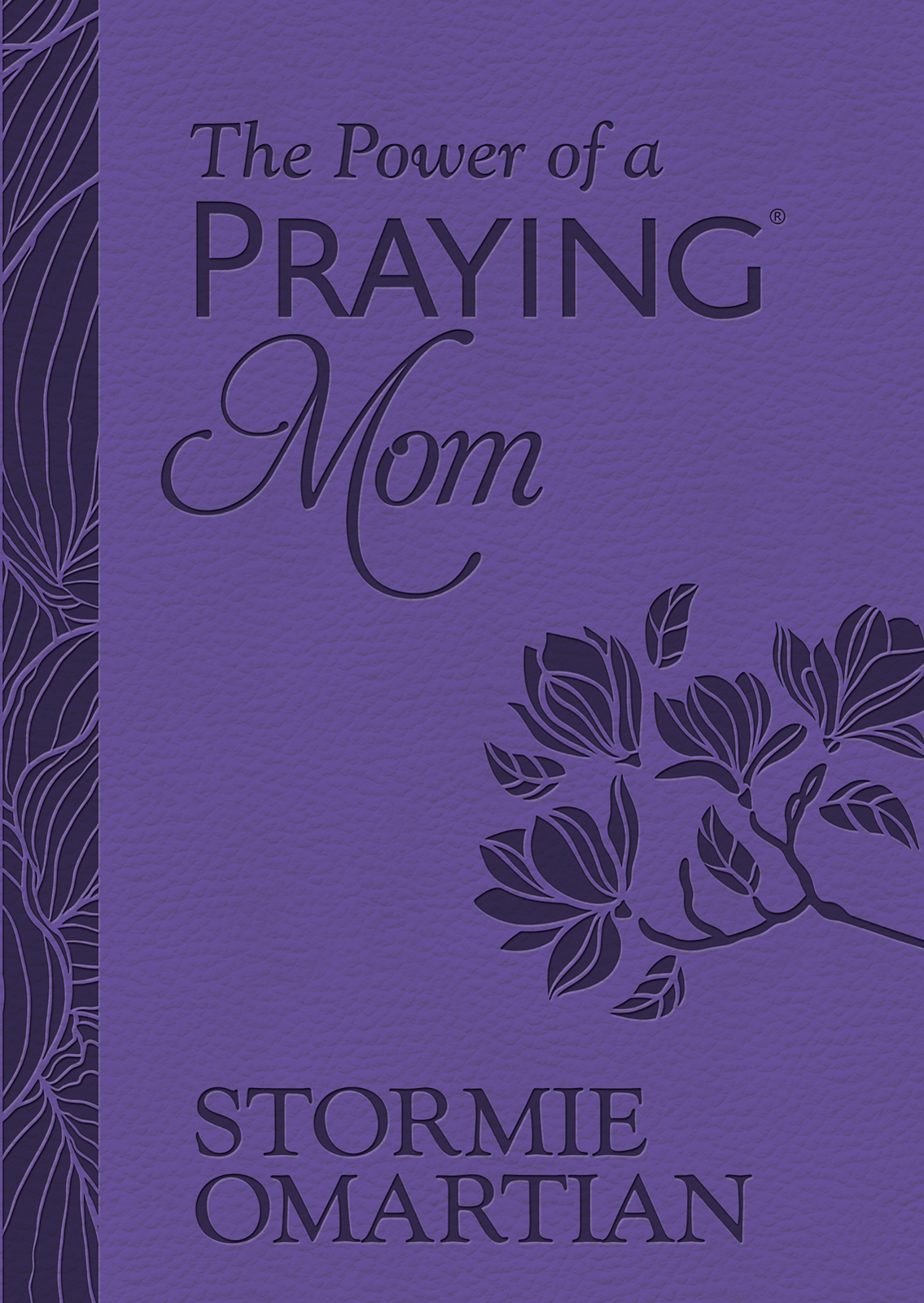
Read more in The Power of a Praying Mom by Stormie Omartian
0 Comments Leave a Comment »
The Impact of a Mother: an F-22 Fighter Pilot’s Story
Posted on Feb 23, 2023 Topic : Women's Christian Living
Posted by : Rhonda Stoppe

The Lord did not bring our oldest boy, Tony, into our lives until he was 15 years old.
He lived in our home for only a short time, but just as the Lord had used Jochebed’s few years with Moses to shape him for life, God gave us a brief window of opportunity to give Tony a strong foundation.
During Tony’s short time with us, he and I had great talks about his new life as a believer, and we talked about girls. We talked about his dream to become a fighter pilot, about God’s character, and about girls. We discussed God’s plan for marriage… and did I mention we talked about girls?
While Tony and I got along well, he related to me with love and respect, but never as his momma. I wanted to be a mom to him, but I respected that he had a mother whom he loved, and that he didn’t necessarily need another.
Upon graduating from high school, Tony was accepted to Texas A&M University.
Right away Tony, our overachiever, went out for the drill team, a much sought-after and competitive position. The requirements were grueling. All the while, he was taking a full load of classes. By September, Tony had been selected for the team and he was thrilled—thrilled and exhausted.
One day Tony called home. In a weak and shaky voice, he said he had a severe case of pneumonia and would need to take a break from all activities. He told me he was not going to tell his drill commander he was sick for fear of losing his place on the team. Oh my sweet boy, who had worked so hard to achieve his goals! He had been such a man and accomplished great things. Now all I could hear was a little boy who needed a mother.
I asked the Lord for discernment. As I said earlier, we as mothers need to learn when God wants us to step back and allow our young men to battle their trials alone. But somehow I sensed this was different. Tony had worked so hard to land a spot on the team, and now he was terribly sick. I felt that the least I could do was ask Tony if I could make a phone call on his behalf. Reluctantly, he agreed.
I called a friend of Tony’s who was an alumnus of the school. He promised to make some calls.
Soon I heard back from the drill team’s commandant, who called to assure me that Tony’s place on the team was secure. With that taken care of, we brought our very sick boy home, and I took care of him until he got better. Through that experience, God knit our hearts together, and I became a momma to Tony.
Tony went on to graduate from college and became an F-22 fighter pilot. He is now a lieutenant colonel. While he has achieved many amazing goals, I was never more proud of him than on the day he called to say, “You know, I am living my dream, and I now realize that it is not enough. My Sunday school teacher, a retired fighter pilot, told me that if I am doing all of this but I’m not surrendered to Christ, my life will be wasted.”
When asked how being a part of our family influenced him, Tony said, “The family was, and continues to be, my living definition of both what God expects from me, and what He wants for me. I am thankful for this example, and I have no doubt that it was God’s plan for our lives to connect.”
Have you ever considered motherhood as a ministry? What steps will you start taking now to equip yourself to fulfill this ministry?
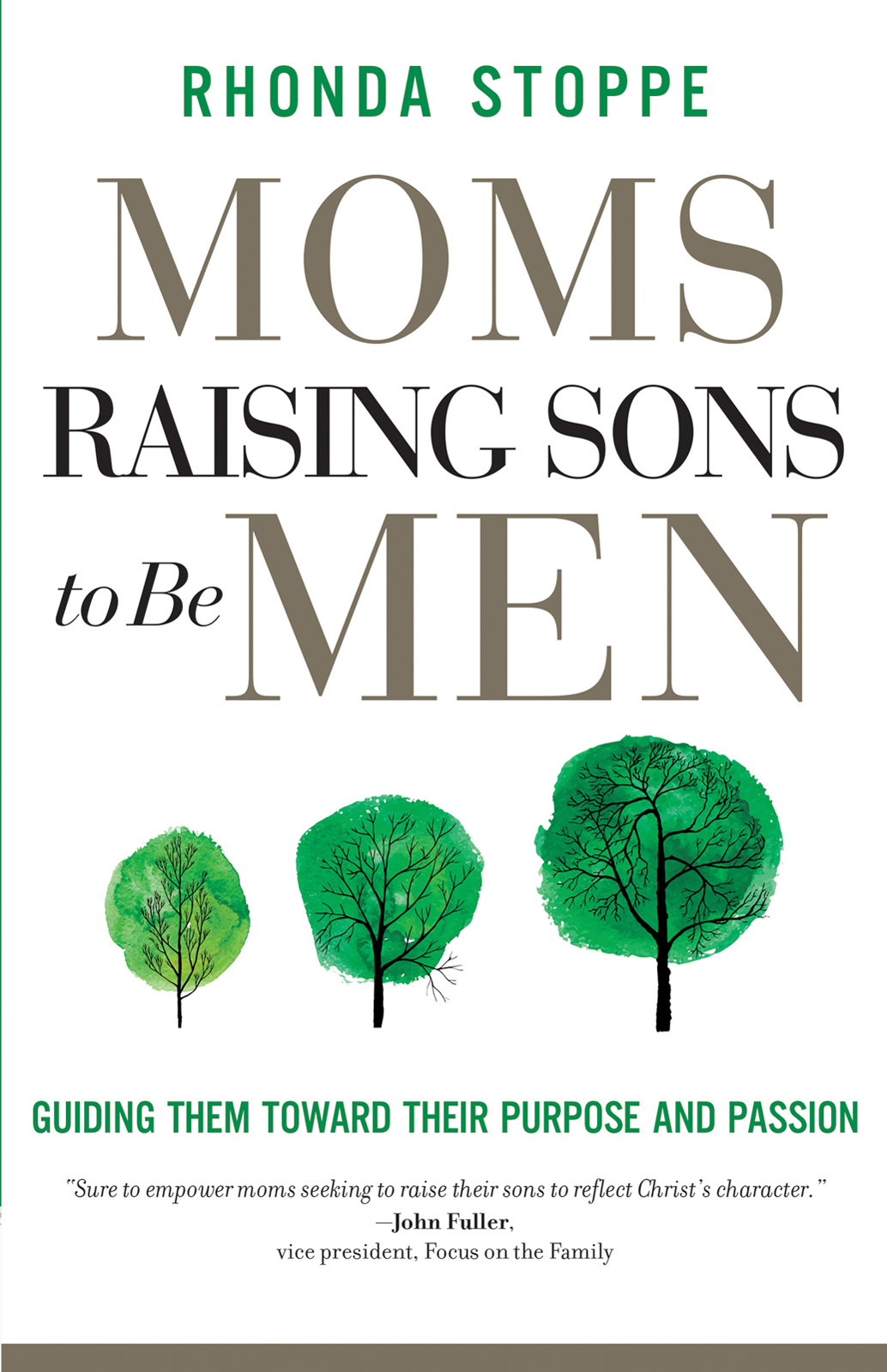
Read more in Moms Raising Sons to Be Men by Rhonda Stoppe
0 Comments Leave a Comment »
Why Do I Keep Acting This Way? Offering Jesus’ Love to Our Childhood Self
Posted on Feb 16, 2023 Topic : Inspirational/Devotional, Men's Christian Living, Women's Christian Living
Posted by : Debra Fileta

If I had to use one word to describe Brett when I met him, that word would be stuck. He was stuck in his relationships, stuck in his career, and stuck in his faith. He felt like he was spinning his wheels and getting nowhere. “I don’t know why I’m so stuck. I’m starting to wonder if I’m going to be stuck forever,” he said to me, with hopeless tears filling his eyes.
I wanted to help Brett get unstuck. And to do that, we had to go backward before we could move forward.
As Brett shared stories from his childhood, he admitted, “I haven’t thought about these things in forever.” Stories of getting bullied began to emerge, one after the other. Getting harassed and abused by his peers was part of his daily routine. As he shared, I helped him realize that he had been conditioned to be as quiet, as little, as passive, and as compliant as possible so no attention would come his way. “In a way,” Brett said, “I carried that same mentality into my everyday life, trying not to stand out anywhere I went, including with my family, my friends, and even in my romantic life. I’m still compliant. Still passive. Still quiet. It’s almost like I’m a little kid, just waiting for someone to tell me what to do, having no power of my own.”
There’s a little child living inside each one of us. It’s our childhood self. Without our awareness and without our permission, we can behave or react in ways that reflect that little child instead of living as the confident, secure, loved men and women of God we are.
I’ve counseled so many people who feel stuck, not even realizing that they’re still functioning out of past pain, fears, and insecurities. But it makes sense, doesn’t it? We can’t expect a little child to carry the weight and responsibility of life the way we can expect an adult to. So how do we take back control?
Jesus has so much compassion for children. With all the important passages we read in Scripture of the words Jesus actually spoke, we can see He took the time to specifically address children. This is so significant because during that time in Middle Eastern culture, children weren’t inherently seen as important parts of society. Scripture was completely revolutionary in calling children a gift and a reward; in seeing them as precious, valuable, worthy of compassion and love (see Psalm 127:3). No matter who they were or what they had been though, there was always room for children by the feet of Jesus.
My friend, Jesus loves you. He loves the adult version of you, the child version of you, and every bit in between. He looks on you with compassion and wants you to look at yourself the same way. You were a child. A little child. A child trying to do the best you could with what you had.
I want you to think about your childhood self for a moment. What were you like? What did you go through? How did you feel? Imagine yourself in the most vulnerable position you were in as a child.
When dealing with our childhood selves, in a way, we have to “reparent” ourselves. We have to look at those childhood selves and help them find their way. God has given us all the power and perspective we need to live this life victoriously. So, every now and again, look that little child in the eyes with grace, compassion, and kindness, and remind them that they’re okay, they’re wanted, they’re loved. Their fear, shame, pain, insecurity, and anxiety cannot hold you back anymore. There’s a place for them at the feet of Jesus. And there’s a place for you too.
VERSE FOR REFLECTION
“Let the little children come to me, and do not hinder them, for the kingdom of heaven belongs to such as these” (Mark 19:14).
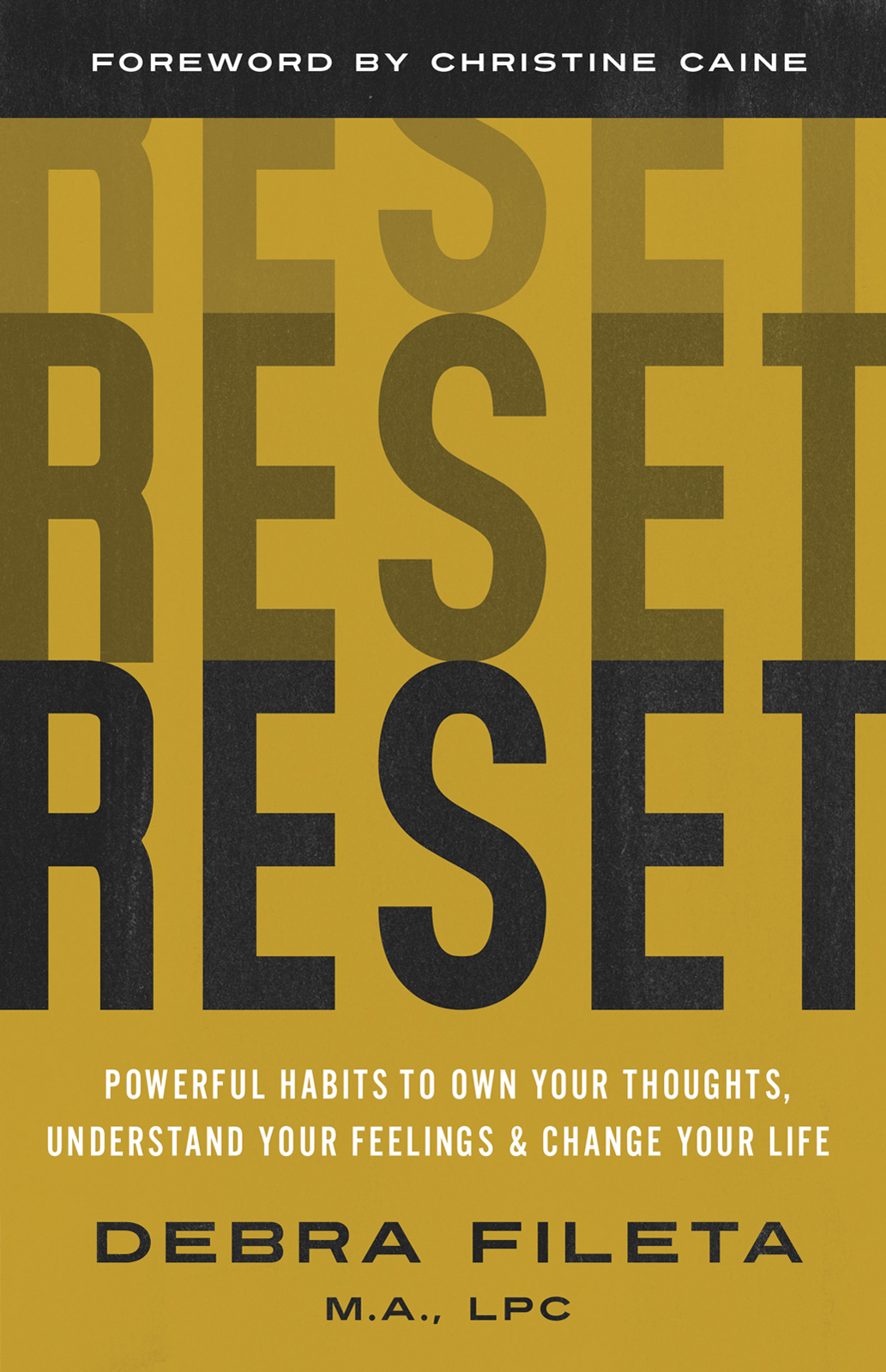
Read more in Reset by Debra Fileta
0 Comments Leave a Comment »
How to Wait on God’s Promise of Growth
Posted on Feb 09, 2023 Topic : Inspirational/Devotional, Men's Christian Living, Women's Christian Living
Posted by : Jessica Blanchard

You know that saying “bloom where you’re planted?” I like it, but what about the times you feel like you’re just the dormant seed in a hole covered with dirt?
Last year, just as I was about to start working on illustrating my next book, I went through a brief season of depression during which I was incapacitated to engage in daily life. Once the Lord brought me out of it and I began to work, He really spoke to me through the imagery of a garden, specifically the image of a seed. A seed is weak. It goes into the ground and dies in order to sprout new life. It cannot do anything of itself, but only can trust the Gardener will provide all it needs in order to grow and thrive. In my despair over that season of depression, I felt the Lord say, “Wait on Me. A plant cannot water itself. A plant cannot weed around its roots. A plant cannot make the sun shine or the clouds release rain. It abides where it's planted and it trusts its Maker to bring what it needs to flourish and bear fruit.”
After hearing this from the Lord, I read in Hannah Whiteall Smith’s A Christian’s Secret to a Happy Life: “Abide in the Vine. Let the life from Him flow through all your spiritual veins. Yield yourself up utterly to His lovely control. Put your growing into His hands as completely as you have put all your other affairs. Allow Him to manage it as He will. Do not, as children do, keep digging up your plants to see if they are growing. Trust the Divine Husbandman absolutely, and always. Accept each moment’s dispensation as it comes to you, from His dear hands, as being the needed sunshine or dew for that moment’s growth.”
I felt like a tiny seed covered with dirt when I was bedridden. But I also felt the Lord saying, “Wait on me. Trust me to lift you up at the proper time.” He was reminding me that all things are gifts from His hands, even me getting out of bed this morning. I need to be reminded of this daily, as I so quickly take all these gifts for granted. All things are from Him alone. He is good, and can be trusted. We need to shift our minds to embrace our weakness, so that we will remember and know that it is on Him alone that we rely. In 2 Corinthians 12:9, Paul writes, "But he said to me, “My grace is sufficient for you, for my power is made perfect in weakness.” Therefore I will boast all the more gladly about my weaknesses, so that Christ’s power may rest on me.”
If you are in a time of darkness and seeming fruitlessness, trust that the Lord will direct your season in a way that will produce good fruit. Trust that promise even when you can only see dirt and weeds, even when everyone else around you seems to be sprouting and blooming. Abide where you’re planted. God will take care of the blooms in His time.
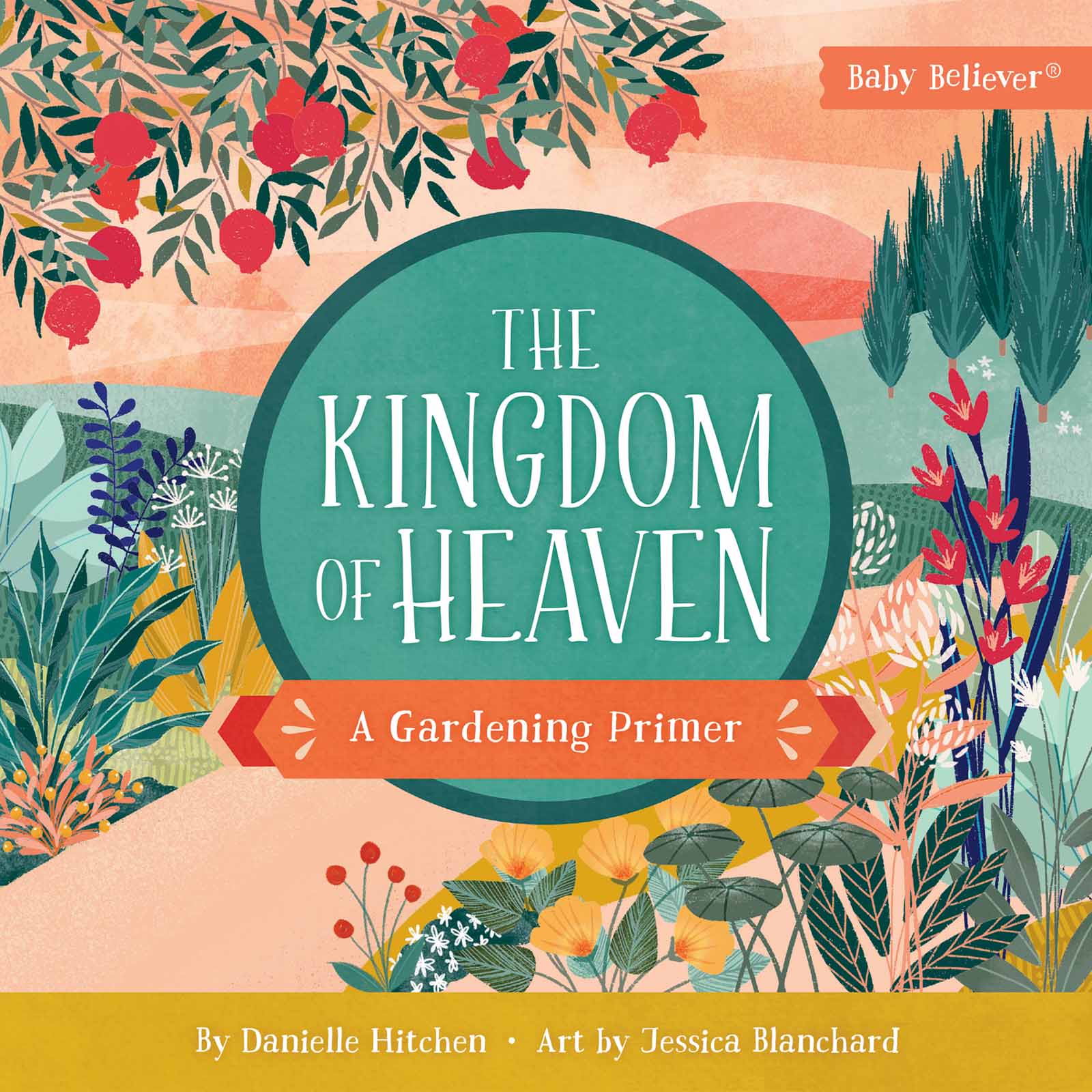
Read more in Kingdom of Heaven by Danielle Hitchen and Jessica Blanchard
0 Comments Leave a Comment »
An Important Question: How to Live Biblically in Today’s Culture
Posted on Jan 26, 2023 Topic : Men's Christian Living, Prophecy, Women's Christian Living

How should we then live?
Francis Schaeffer, the renowned evangelical apologist, asked that question a half‑century ago, and it became the title of a video series Schaeffer produced in the late 1970s. In that series, he documented the development and decline of Western civilization, focusing on culture’s downward trajectory from the Enlightenment through modern times. Schaeffer’s central question was both timely and timeless.
All followers of Jesus Christ must ask themselves how they ought to live as they seek to glorify God and walk in His ways. The apostle Peter posed a similar question in 2 Peter 3:11, when he asked his readers, “What sort of people ought you to be?” Peter made that inquiry at a time when the church was being persecuted. His words strike a chord with us today because we find ourselves in an increasingly hostile society. Our culture has grown more and more antagonistic toward biblical norms and Christian values. So, as the world around us gets worse, how are we to think, speak, and act?
Our culture’s decline has been rapid. Within the past few decades, we have witnessed an unprecedented spiral of moral degradation. Today’s leading influencers openly reject the notion of moral absolutes, choosing instead to exchange the truth of God for whatever seems right in their own eyes. As a result, God has given our society over to degrading passions characterized by immorality, self‑centeredness, and pride. We find ourselves as Christians trying to avoid the corruption as we navigate the complexities of a culture in chaos. Peter’s description of Lot in 2 Peter 2:7-8 summarizes our experience. While living in Sodom, Lot was “oppressed by the sensual conduct of unprincipled men (for by what he saw and heard that righteous man, while living among them, felt his righteous soul tormented day after day by their lawless deeds).”
This brings us back to Schaeffer’s pivotal question. In a society that celebrates sin and scorns biblical truth, how should we then live? If we hope to exhibit right thinking and right living, we must begin by looking to the Word of God. His Word lights our way in the darkness (Psalm 119:105) and enables us to stay firmly grounded through uncertain times (Psalm 1:1-3). Scripture reveals the good news of the gospel (James 1:21). It is the means the Spirit uses to grow us in holiness (1 Peter 2:1-3). And it is the weapon God has given us to fend off temptation and error (Ephesians 6:17). By focusing our hearts and minds on divine revelation, we anchor ourselves in the truth (John 17:17). So, if we are going to think and act rightly, we must align our lives with the unchanging standard of God’s Word.
As you study God’s Word and view today’s culture through its lens, our prayer is that you will be equipped to think biblically about every issue that arises. Our culture may be in chaos, but the clarity of God’s Word cuts through the confusion. It establishes our convictions, ignites our courage, and governs our conduct. It shows us how we should live. Only by renewing our minds with divine truth can we protect our hearts from the contamination around us (Psalm 119:9-11). Consider Paul’s exhortation in Romans 12:2: “Do not be conformed to this world, but be transformed by the renewing of your mind, so that you may prove what the will of God is, that which is good and acceptable and perfect.” May that be your desire as you seek to think and act in ways that honor the Lord.
0 Comments Leave a Comment »
What’s in Your Prayer Closet? Making Room for God in the New Year
Posted on Jan 24, 2023 Topic : Inspirational/Devotional, Women's Christian Living
Posted by : Hope Lyda

New beginnings offer us much grace. That’s why I’m a better nester as a new year awakens than I am a spring cleaner. It’s not about resolutions. Those feel judgy-wudgy. It’s about hope. I long to prepare physical and spiritual places where I can fall, lean, dream, crumble, and sigh.
But there’s so much stuff.
It occupies my home like an invited houseguest turned squatter who won’t chip in for groceries yet deposits dirty socks everywhere. I can’t blame anyone else. I invited this stuff into my life. It’s my doing. To keep it from being my undoing, a friend gifted me a day of tidying to regain territory. Another friend and I started a pinky promise to tackle small chores over weekends. We text each other “pinky power” encouragements and have one rule: no judgement if Friday unfolds into Monday like a unkempt sleeper sofa, showing no progress (only evidence of cheese puff binges).
As burdening as this physical chaos can be, the messier zone I need to address in the new year is my prayer closet. Not a nook in my house…though I’d love to talk bookshelves and candles.
I’m talking about the ultimate prayer closet—our hearts. The space where we meet God in stillness and openness, ready to be filled with his love. That is, when there’s room.
It is this heart that is the place of prayer…Prayer is standing in the presence of God with the mind in the heart; that is, at that point of our being where there are no divisions or distinctions and where we are totally one. There God's Spirit dwells and there the great encounter takes place. There heart speaks to heart. (Henri Nouwen, The Way of the Heart)
I want to clear a space for this kind of encounter with the Lord. How about you? Here is what I’ll be lugging to the spiritual curb in the next days. Are any of these familiar?
____ Regrets carved on stones, stacked but ready to tumble
____ Broken dreams I’ve saved and shoved to dark corners in case I need them for parts
____ Resentments crammed into accordion files so full I can’t find any original receipts
____ Stacks of score cards from years of comparing myself to others
____ Complaints I made so often they now echo in the prayer chambers of my heart
(And to think I invited all those things to take up space in my heart…for years!)
What’s in your prayer closet?
If it looks like mine, there’s good news, actually the good news. Jesus will help us. You know the words, “Create in me a pure heart, O God” (Psalm 51:10). Just as friends did for my physical spaces, Jesus will gently, gladly help us remove obstacles from our hearts. He does this because he is merciful God. (And, I suspect he’s tired of sitting on lawn bags stuffed with life debris.)
He won’t judge our mess. And when he tenderly holds up a painful memento, he’ll have a tissue ready before our lips quiver. “Your Father knows what you need before you ask him” (Matthew 6:8). There’s no shame here. Only room for more that is sacred. More that is life-giving. More that is of God’s heart for us.
- What needs to be removed from your personal prayer closet?
- How might you start a new day, a new year, a new outlook with a heart open for holy conversations?
Need some ideas to get you started?
5 Ways to Start Your Year with Prayer
1. Grab a favorite book of prayers to carry and use anytime.
2. Select a verse that will be your lead-in prayer to break the ice.
3. Let a journal choose you (they do that, you know). Jot down prayers, praises, hopes.
4. Walk, draw, doodle, or sing a prayer. Express that heart!
5. Plan a regular time to meet God in your prayer closet. First thing in the morning or right after dinner have potential! (Suggestion: spend the first 5 minutes clearing the clutter together and then dive into what’s new.)

Read more in One-Minute Prayers to Start Your Day by Hope Lyda
0 Comments Leave a Comment »
When You Mess Up, Will God Welcome You Back?
Posted on Jan 19, 2023 Topic : Men's Christian Living, Women's Christian Living

This excerpt from Stories from the Storyteller by Jonathan Evans puts a modern spin on the parable of the prodigal son so that children can better understand that God's unconditional love for us doesn't follow what we typically think of as fair. And aren't we thankful that God doesn't give us what we deserve? Share this this fun story with your children today.
***
The entire Evans family, all seven of them, along with Tyson, their trusty dog, were stuffed into their van. Today was a big day. They were on their way to the wildest theme park in the state—perhaps even the country.
Kam squealed. “I’ve been waiting for decades for this day to come!”
“You’re seven,” Kelsey reminded him.
Mrs. Evans held up seven park cards. “We have only so many credits to use at the park. If we manage our credits right, we’ll have a great day.”
Mr. Evans pointed out that a special surprise may be waiting at the end.
The park was filled with all sorts of exciting things. Arcade games. Tasty food. And amazing roller coasters.
Kam and Kylar begged for their cards right away. “We wanna go to the arcade first,” Kylar whined.
Mr. Evans reminded them to save their credits. “Once these are used up, that’s it.”
Kam and Kylar took off running for the games, barely listening.
Kylar and Kam sprinted from game to game. They both swiped their cards over and over, hoping to finally win the elusive stuffed panda and reach the next level.
Finally, the machines buzzed at the kids. “What? No credits!” they both shouted.
Kylar and Kam found their mom and dad outside.
Mr. Evans laughed. “You burned through all your credits in ten minutes?”
Mrs. Evans sighed. “I wish you would have let us manage your credits.”
“Sorry, we got nothin’ for ya,” Mr. Evans stated as the family walked off.
Bored, Kam and Kylar sat on a park bench while their family enjoyed the fun rides.
It was finally the end of the day when J2 asked, “So what’s the big surprise?”
“King Mountain Pizza Buffet!” Mr. Evans announced.
The hungry family went inside to eat the delicious, hot pizza— except for Kam and Kylar. They did not have the credits to get in.
Suddenly Mr. Evans appeared, holding two new cards of credits. “You guys hungry?”
Kylar and Kam ran and hugged their dad, feeling very grateful.
Kam and Kylar were excited to join their family for pizza.
J2 looked frustrated. “Why do they get to eat pizza?” he asked.
Kelsey added, “We saved our points! They shouldn’t get to join in the surprise.”
Mr. Evans began to tell a story. “Today reminded me of a parable Jesus told about a man who had two sons. The youngest son asked his father to give him half of everything he owned.
“The son quickly spent all of his inheritance on junk and couldn’t even afford food. He was filled with regret and went home to apologize.
“The father saw his son coming and ran out to welcome and forgive him. He even threw him a huge party.”
“The older brother didn’t think it was fair and didn’t join the party.” “God is always willing to wrap us in His arms, forgive us, and welcome us back home when we mess up,” Mr. Evans explained.
“I’m sorry I got mad at you, Kam,” J2 apologized.
“I’m sorry too, Kylar. At the time I thought it was unfair, but now I see that the Lord was using it to teach us both a big lesson,” Kelsey added.
“I forgive you, Sis. Does this mean I can use some of that fancy perfume you got for Christmas?” Kylar asked.
“Don’t push it, kid,” responded Kelsey, smiling.
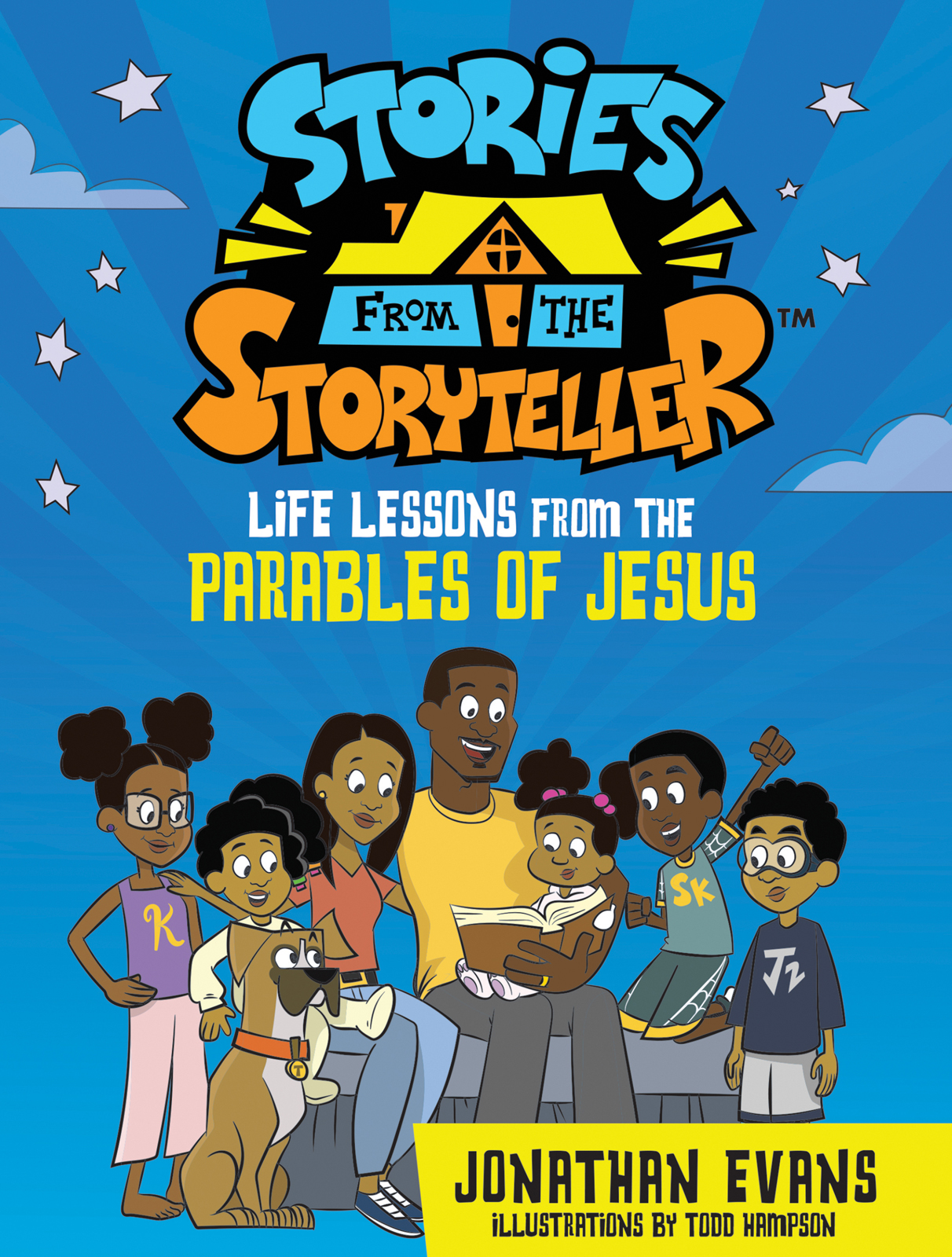
Read more in Stories from the Storyteller by Jonathan Evans
0 Comments Leave a Comment »
Why Romance Should Still Be on Your Reading List
Posted on Jan 12, 2023 Topic : Fiction, Inspirational/Devotional, Women's Christian Living
Posted by : Kim Moore

Ah, romance. Those who aren’t interested in story may shrug and say, “I read only nonfiction. You know, serious books.” I always feel sad when I hear that. Because strength and forgiveness and vulnerability and learning about oneself and so many other good things can be found in the world of make believe. And kisses. We can’t forget kisses.
Storytellers have an important role in shaping and changing culture. Lori Wick is such an author. She didn’t just write about happily-ever-afters. She cared deeply about how her characters lived out their faith along their journey to true love and marriage and family, making mistakes along the way but trusting in God to bring them through safely and according to His plan for them.
Altogether, Lori gave us dozens of books that sold millions of copies. She found a lasting place in the hearts of her readers, who came back again and again for the next compelling offering…some rereading their favorite stories over and over.
Because of this, and because anniversaries are worth celebrating, Harvest House decided to publish special hardcover editions of two of Lori’s most popular novels: Sophie’s Heart and The Princess. These beautiful keepsakes with a ribbon marker are perfect for any reader of romance, not just a Lori Wick fan.
Sophie’s Heart
This silver anniversary edition celebrates 25 years of one of the most heartwarming Christian romance novels ever written.
The way Sophie looks to God to lead and care for her is inspiring, and the love she has for Alec and the children is tender and beautiful. When Alec turns his heart to her (no spoilers here—of course he does!), it’s a happy-sigh-inducing moment. Their unfolding romance is timeless. This story will still touch hearts 25 years from now.
The Princess
Celebrating 20 years in print, this romance is set in a make-believe kingdom, where a handsome prince is living with a broken heart.
The Princess is one of my favorite stories. Shelby has a high calling with a difficult path ahead of her—becoming a princess and marrying a man who does not want to be her husband. But as Nikolai bows to the traditions of his people, we watch him and his new bride find their way to each other through grace, kindness, and obedience to God’s call on their lives. Beautifully written and hopeful throughout, this new edition of The Princess makes reading this story again or for the very first time a complete joy.
From the earliest days of storytelling to our almost miraculous digital age, romance has had an important role in conveying the saga of the human condition and the benefit of having a hand to hold, a life to share, and a heart to love. Celebrate these universal aspects in a wonderful new way with these gorgeous anniversary editions from Lori Wick.
***
Kim Moore, a senior editor at Harvest House Publishers, has been in CBA publishing for more than 20 years. Kim shares her life with two gorgeous cats, and she and her housemates make their home in the green and beautiful Pacific Northwest.

Read more in Sophie's Heart Special Edition by Lori Wick

Read more in The Princess Special Edition by Lori Wick
0 Comments Leave a Comment »
How Can We Believe in Something That We Can’t See?
Posted on Jan 10, 2023 Topic : Men's Christian Living, Women's Christian Living
Posted by : Quina Aragon

“But, Mommy, I can’t see Him!” I can’t tell you how many times my four-year-old daughter protested this point when we’d have conversations about God. She continued this protest as a five and six-year-old as well. Fair enough. The fact that we can’t physically see or touch God has often felt problematic for adults, too. Leave it to kids to honestly voice their valid questions and concerns as we try to introduce them to the Bible’s story and God himself.
My daughter, who I imagine may one day be an investigative journalist, will not let you off the hook with a simple “We just have to have faith,” or, “Because the Bible says so,” answer to her many theological questions. She will want to know, “But why? How? When?” and she’s not often content with a “Just believe” kind of answer. It’s safe to say she keeps me on my toes!
Introducing kids to who God is, theological concepts, and the story of the Bible can be very intimidating at times. Most of us don’t have a seminary degree, and even if we do, kids will find a way to stump us with their sincere—and oftentimes hilarious—questions.
For example, how do you explain who the Holy Spirit is to a 4-year old?
What Does Scripture Say?
I suppose the obvious question we should ask ourselves first is what does Scripture say?
Jesus told his friends that when he would leave them to go back to Heaven, he’d ask God the Father to “give you another Helper, to be with you forever” (John 14:16). Then, when Jesus was about to ascend back to Heaven, his buddies thought that maybe now Jesus would pull a superhero move: rid the world of all evil and bring his kingdom through a display of his cosmic power through political dominance.
The surprising news for these disciples was that Jesus would show his power, but not in the way they were thinking. This power “you will receive power when the Holy Spirit has come upon you, and you will be my witnesses [. . .] to the end of the earth” (Acts 1:8). This power Jesus referred to is the indwelling presence of the Holy Spirit.
So, How Do I Explain This to a Kid?
That’s a glorious truth, but how might we explain the Holy Spirit to the kids in our lives?
Well, what do most kids have in common (along with many grown ups!)? A love for superheroes, of course! An imagination to envision what it’d be like to have a superpower. Watch a child put on his favorite superhero’s costume, and see him transform into a hero full of confidence. Ask a kid what superpower she’d want, and hear her creative juices flowing.
What’s another thing kids (and grownups alike) have in common? Well, sometimes it’s hard to love God and love others! It can be difficult to share toys, to be patient while waiting in line, to forgive when others hurt us.
Here’s my point: our kid’s interests and their struggles are our opportunity to make connections to Scripture for them.
God’s Superpower Helper
As my daughter continued to ask me about the God she can’t see, I began to explain the Holy Spirit to her as God’s superpower Helper.
This became a paradigm shift for her, because she—like we all tend to—can often assume that she must muster up the willpower to change her attitude or behavior. The good news is that our kids don’t have to grow up feeling they have to maintain a performance-based righteousness to be a “good Christian.” Another helper—the Helper—is who they need.
While most superhero stories teach kids that they have all the goods they need to be good, the Bible’s story tells us that God alone has all the goods needed to be called good. But this God, who “is love” (1 John 4:8), sent His very Spirit to live in us. And with love in us, we have 24/7 access to the superpower of God to experience his love for us and display his love to others.
So, yes, we can’t see God, but we can know He’s around. How? The superpower of love.
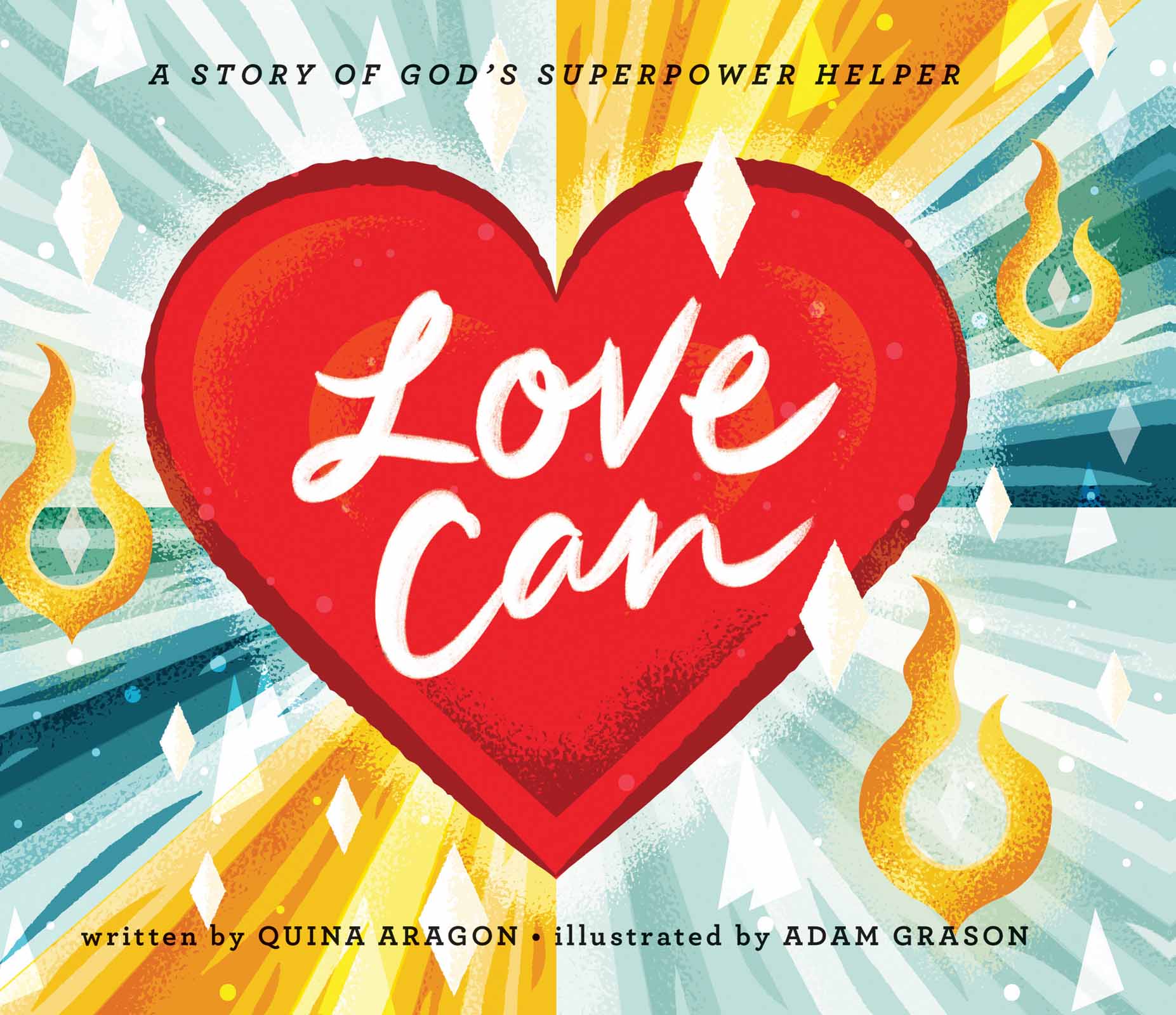
Read more in Love Can by Quina Aragon
0 Comments Leave a Comment »
Do You Want to Thrive in These Last Days? God’s Word Is the Solution
Posted on Jan 03, 2023 Topic : Men's Christian Living, Prophecy, Women's Christian Living
Posted by : Ron Rhodes

There is no denying that prophecy speaks of hard times ahead for the inhabitants of this tiny planet. Christians will miss the worst of it because they will be raptured before the tribulation period. But even the events transpiring in the world today can be highly distressing.
That is why it’s good advice for Christians to daily immerse their minds in the comforting truths of God’s Word. Put another way, we ought to stockpile our minds with God’s thoughts.
I like to remind Christians of the importance and relevance of the Bible:
- The Bible is much like a manufacturer’s handbook that instructs us how to operate our lives.
- The Bible is like a pair of glasses for nearsighted eyes. Without the glasses, we do not see clearly. We see only a blurred reality. But with them, everything comes into clear focus. We see things as they really are.
- The Bible is like a lamp. It sheds light on our path and helps us to see our way clearly. Psalm 119:105 says, “Your word is a lamp to my feet and a light for my path.”
- The Bible is like food (Hebrews 5:12; 1 Peter 2:2). It gives us spiritual nourishment. We become spiritually malnourished if we do not consistently feed on God’s Word.
- The Bible is also like a love letter or Valentine’s card—from God to us (John 3:16‑17). It tells us how God’s great love for us motivated Him to send Jesus into the world to die for our sins so that we could be saved (Romans 5:8).
- The Bible is like an anchor. Just as an anchor keeps a boat from floating away, so the Bible is an anchor for us. It prevents us from being swept away when a tidal wave of adversity comes our way.
During these end times, it is critically important for Christians to stay deeply rooted in God’s Word. I urge Christians to meditate daily on God’s Word. The Hebrew word for meditate carries the idea of “murmuring.” It pictures an individual reading and concentrating so intently on what he’s reading in Scripture that his lips move as he reads. Scripture affirms, “Blessed is the person…[whose] delight is in the Law of the Lord, and on His Law he meditates day and night” (Psalm 1:1‑2). Such Christian meditation fills our minds with godly wisdom and insight.
Following are some helpful verses to get you started on daily meditation:
Maintain Faith in God
- Blessed are those who trust—Jeremiah 17:7
- Faith grows from hearing God’s Word—Romans 10:17
- Live by faith, not sight—2 Corinthians 5:7
- Small faith yields big results—Luke 17:5‑6
- Trust in the Lord with your whole heart—Proverbs 3:5
Keep Your Hope Firm
- Maintain confident assurance—Hebrews 11:1
- Hope in God—Psalms 39:7, 43:5; Lamentations 3:24
- Hope in God’s Word—Romans 15:4
- Those who hope in the Lord renew their strength—Isaiah 40:31
Stay Optimistic—No Matter What
- Be confident—2 Corinthians 5:6‑7
- Be joyful always—1 Thessalonians 5:16
- Be strong and take heart—Psalm 31:24
- Rejoice and be glad—Psalm 118:24
Do Not Worry
- Prayer is an antidote to worry—Philippians 4:6‑7
- Cast your anxiety upon God—1 Peter 5:7
- Circumstances need not cause worry—Luke 8:22‑25
Great Christians of the past reveal the benefits of daily meditation on God’s Word. George Müller (1805–1898) said his morning priority was “to have my soul happy in the Lord…I saw that the most important thing I had to do was to give myself to the reading of the Word of God and to meditation on it.” Once he did that, he was ready to face the day.
Muller reminds me of Thomas Watson (1620–1686)—Puritan preacher and author—who once said, “Leave not off reading the Bible till you find your hearts warmed…Let it not only inform you but inflame you.”
End-time Christians need to have hearts inflamed by the Word of God and souls happy in the Lord. We ought to be “Psalm 1 Christians”—Christians who are blessed because their delight is in the Word of God (Psalm 1:2).
I believe this is the best way to survive and thrive during these last days.

Read more in 40 Days Through Bible Prophecy by Ron Rhodes
0 Comments Leave a Comment »
What Do You Wish For in 2023?
Posted on Dec 29, 2022 Topic : Inspirational/Devotional, Men's Christian Living, Women's Christian Living
Posted by : Lance Wubbels

May you go out in joy and be led forth with peace; may the mountains and the hills burst into song before you, and may all the trees of the field clap their hands. Isaiah 55:12
In the secluded woods of northern Minnesota, my longtime friend Jeff has made a home in a place he and his wife, Carol, call “Quiet Waters.” It’s not unusual for the wildlife he loves and admires to visit his yard. With patience and persistence, he has gained the trust of some of those visitors to an extent that most people, including me, find almost miraculous. Jeff even walks with bears. I’ve seen him do so—on a forest-lined lane near his house, walking side by side with a wild bear, like a man on a stroll with his dog.

Jeff is living where he wishes to live, doing what he wishes to do, and he’s found deep contentment in his life. But it wasn’t always this way. For many long years, Jeff lived in quiet discontent in a nice house in a Minneapolis suburb and worked in a high stress job that he hated . . . and hated more each year. He was committed to providing for his wife and two sons, and he did, but his heart cry to God was that he might escape the city and be able to live close to nature. I hoped and prayed Jeff’s wish would come true, and it did. One day the pressure of his job simply pushed him too far. He quit. Walked out. Didn’t go back.
It took a couple of extraordinarily hard years for Jeff and Carol to get relocated in northern Minnesota, but they found a way together. And the transformation that has occurred in their lives is beautiful to behold. By following his heart and soul, Jeff is his own man today.
***
I wish for you in 2023 what I wished and prayed for Jeff— all that your heart desires.
I wish for you dreams so big that you have to grow into them.
I hope that you will always feel fearlessly free to be you.
I wish for you the courage of conviction, the strength to persevere, and the hope that survives all trials.
When your soul is weary and troubled, I hope you remember “the Lord is my shepherd.” He’ll lead you beside quiet waters.
May you take time, when needed, to quiet your soul, silence the noise in your head and heart, and remind yourself of what you really want out of life.
I hope you realize your life is truly your life . . . it belongs to you. It is your story to write with love. Day by day, line by line, write it well.
Hope deferred makes the heart sick, but a longing fulfilled is a tree of life. Proverbs 13:12

Read more in I Wish for You by Lance Wubbels
0 Comments Leave a Comment »
Why We Can Be Friends with Anyone…and Teach Our Children to Do the Same
Posted on Dec 27, 2022 Topic : Men's Christian Living, Women's Christian Living
Posted by : Laura Wifler

It was a hot July afternoon, and we had just picked up a few of my children’s friends to take to the pool. My youngest daughter with intellectual disabilities was jabbering excitedly in the car, talking about water and goggles and pretzel bites (her favorite snack to get at the concession stand), but because of a speech delay, I was likely the only one who could understand what she was specifically talking about. As we pulled into the parking lot and piled out of the mini-van, my daughter grabbed one of the friend’s hands and continued speaking enthusiastically to her, pointing at the pool and laughing as they walked in.
“I can’t understand anything she’s saying,” the friend said with a nervous laugh to my older daughter. My daughter, who is 7, replied, “She has disabilities. But you can still be friends with her. She makes a really good friend.”
As a mom to a child with global disabilities, I often see both children's and adult’s discomfort when interacting with people who are different than them. I understand this! It’s natural to feel hesitant when observing behaviors or movements that we’re not used to. There is a concept in sociology called “homophily,” which is a term that describes human beings' tendency to form friendships with those who are like them. It’s the whole, “birds of a feather, flock together.” Typically research looks at demographic information: geography, social status, age, religion, interest, life experiences, etc. When these are shared, people are more likely to become friends. Look around at your own friendships—I bet you’ll find homophily at play.
Research also tells us it’s important to have diversity in friendships. It’s how we expand our thinking, grow in compassion, and gain a more full perspective of the world. But every, single, time, the research will show that the two people, no matter how different they are from one another, found something they share. Whether it's the same taste in movies, clothes, or moms who spoke the same type of wisdom, there was always at least one similar thing that created a foundation for the initial friendship.
What’s so wonderful about being a Christian, is that even if we do not share geography, social status, age, religion, interests, or experiences with another person, we can always find sameness with one another. Genesis 1 and 2 tells us every person who walks this earth was made, Imago Dei, in the image of God. That means every person carries the mark of God on them, an inherent shared sameness. That sameness means every person, regardless of interest, status, history, or abilities—has intrinsic dignity, value, and worth.
What my seven-year-old daughter said that day to her friend, is a truth that we all need. When we see the image of God in another human being, we will know there isn't anyone who is not worthy of our time or attention, because each person is a reminder of our living God. This means, we can become friends with anyone. How can you live that out today?

Read more in Like Me by Laura Wifler
0 Comments Leave a Comment »
The Real Bethlehem: What Jesus’ Birthplace Reveals About the Son of God
Posted on Dec 22, 2022 Topic : Inspirational/Devotional, Men's Christian Living, Prophecy, Women's Christian Living
Posted by : Chris Katulka

The Christmas carol “O Little Town of Bethlehem” illustrates the long-awaited arrival of God’s “everlasting light” into humanity’s humble conditions. But in my opinion, Bethlehem gets a bad rap: It’s painted as an insignificant pitstop on the way to Jerusalem. The motto on Bethlehem’s welcome sign could read, “Nothing To See Here!”
The surroundings of the King of Kings at His arrival were unpresuming, but Bethlehem shouldn’t be blamed. If Jesus’ birth certificate read “Bethlehem” as his place of birth, it shouldn’t demean Him. Instead, it should define Him in epic and majestic ways!
Jesus Our King
King David was the most consequential king in Old Testament history—he was a man after God’s own heart. David had humble beginnings himself as a shepherd boy from Bethlehem.
God promised David a Son who would “establish the throne of his kingdom forever” (2 Samuel 7:13), a prophecy of Jesus’ reign. Christ’s birth in the “city of David”—Bethlehem—crowns Him the Descendant of Israel’s most memorialized king, King David (Matthew 1:1; Romans 1:1-4).
Jesus Our Lamb
Micah writes that Israel’s ruler would be born in Bethlehem (Micah 5:2), specifically the “tower of the flock” (Micah 4:8). According to rabbinical texts, Bethlehem’s “tower of the flock” is an exclusive pasture where select shepherds tended to special flocks destined for Temple sacrifice.
When Jesus was born, He was surrounded by flocks selected to be offered for Israel’s sins. This setting would illustrate the mission of Christ as the Lamb of God who takes away the sins of the world.
Jesus Our God
Bethlehem reveals Emmanuel, God with us. Micah prophesied of the One born in Bethlehem: “His goings forth are from long ago, from the days of eternity” (Micah 5:2). The prophet saw that the One who would be born in Bethlehem was more than a newborn King, but one whose existence is eternal, giving us a glimpse into the incarnation (John 1:1).
So next time you hear about the little town of Bethlehem, remember that while it may be small, it screams Jesus our King, Jesus our Lamb, Jesus our God!
Merry Christmas!

Read more in Israel Always by Chris Katulka
0 Comments Leave a Comment »
Are You Still Searching for Your Place in Life?
Posted on Dec 20, 2022 Topic : Men's Christian Living, Women's Christian Living
Posted by : Jim Johnson

Some words that we use as a matter of course carry much more weight than we imagine. Place is such a word.
In a purely geographical sense, a place is nothing more than a location that can be pinned on your phone’s GPS. In this case you might say, “This is where I am.”
In a vocational sense, place can refer to a culture, a role, or a position. When you get a new job in a new company you might find yourself saying things like, “I fit in here,” or “This new opportunity is a good fit for me.”
In a relational sense, placeis no longer defined primarily by coordinates but by people. When you find people in a particular place who accept you fully, love you unconditionally, and allow you to reciprocate in kind, you likely will say, “I belong here.”
It’s not a stretch, then, to conclude that finding the right places in life contributes significantly to the quality of your life. But this begs the question: How do we arrive at these places in our lives? Three ways readily come to mind.
We are assigned some places
At birth we are assigned to a family and a place called home. Educationally, we are not only assigned our seats alphabetically, but also the teachers we will have, and the schools we will attend. The places of men and women, or members of a particular race or ethnicity are culturally assigned. Religiously, we can be assigned to a heritage, a caste, a heaven, or a hell.
Unfortunately, some of the places to which we are assigned may, in fact, create significant limitations on our life, liberty, and pursuit of happiness. It’s no wonder, then, that in those places we most often feel out of place.
We can earn places
Through hard work, grit, and a little pluck, it’s possible to stack one accomplishment on top of another. Before long we have carved out a place in the public square where we can lean on our own standing. The only trouble with the places we earn is that they are temporary. If we can earn them, we can lose them, or someone else can take them from us. Eventually one or more of the variables of competence, relevance, and age will catch up to all of us, and once again we will feel out of place.
We choose places
Based on our self-knowledge and awareness, we can make a wide range of choices today—where to live, worship, work, and play. Choosing these places wisely leads us to a sense of shalom that is expressed whenever we declare, “Ah, I’m truly at home here.”
It would be easy to wrap up this short excursus on places right here, but if I did, you might miss the most rewarding and soul-filling place of all—the place you find. For most of your life you may not have even been aware that it exists. Or that you need it. Or that it is even a possibility. But I’m here to tell you that you’ll discover the deepest sense of belonging and purpose when you find your place in God’s grand and magnificent story of the creation and renewal of all things—including you.

Read more in Finding Your Place in God's Great Story by Jim Johnson and Paul Basden
0 Comments Leave a Comment »
Israel as a Nation: How God’s Fulfilled Promise Gives Us Hope for the Coming End Times
Posted on Dec 15, 2022 Topic : Men's Christian Living, Prophecy, Women's Christian Living
Posted by : Amir Tsarfati and Barry Stagner

Among God’s most amazing miracles of all time is His preservation of the nation of Israel. Not long after Jesus’ crucifixion, resurrection, and ascension to heaven, the Roman Empire sent armies to destroy Jerusalem and the temple, and the Jewish people were scattered abroad to the nations. For many centuries, the land was ruled by hostile foreign powers.
But beginning in the late nineteenth century, God worked in numerous ways through people and events to restore Israel as a nation. Jewish people began to return to the land, with their numbers increasing up through World War II, especially as Jews fled Europe during the Holocaust.
Then on May 14, 1948, the modern State of Israel was born. On a live radio broadcast, the first prime minister of Israel, David Ben-Gurion, read aloud the words of Israel’s Declaration of Independence. Those who were familiar with Bible prophecy recognized the significance of what was happening. Time and again, the prophets had predicted that there would come a day when the Jewish people returned to the Holy Land, and at last, it was now happening. As God promised in Ezekiel 36:8-10:
You, O mountains of Israel, you shall shoot forth your branches and yield your fruit to My people Israel, for they are about to come. For indeed I am for you, and I will turn to you, and you shall be tilled and sown. I will multiply men upon you, all the house of Israel, all of it; and the cities shall be inhabited and the ruins rebuilt.
Here we see God speaking fertility into this dead land in preparation for the masses of Jewish people who would return. And today, the land is bountiful and filled with life. God has brought back His people by air, on ships, and by land. This is not man’s doing, but God’s. Against all odds, the nation of Israel has returned to its homeland and prospered.
The fact Israel is a country today—after 2,000 years of the Jewish people having been scattered worldwide—confirms God is faithful to His promises. And just as He has been faithful to Israel, He will be faithful to us. He will fulfill His promise in John 14:1-3 to rapture us and take us to be with Him in heaven. It is because God is faithful that we can have hope, and that we can be certain about the wonderful future that awaits us.

Read more in Bible Prophecy: The Essentials by Amir Tsarfati and Barry Stagner
0 Comments Leave a Comment »
Pressing Onward: Do You Need More Than a New Year’s Resolution?
Posted on Dec 13, 2022 Topic : Inspirational/Devotional, Men's Christian Living, Women's Christian Living
Posted by : Matthew West

Not that I have already obtained all this, or have already arrived at my goal, but I press on to take hold of that for which Christ Jesus took hold of me. Brothers and sisters, I do not consider myself yet to have taken hold of it. But one thing I do: Forgetting what is behind and straining toward what is ahead, I press on toward the goal to win the prize for which God has called me heavenward in Christ Jesus.
Philippians 3:12-14 ɴɪᴠ
Every December 31, the world anxiously awaits the beginning of a new year. We watch the ball drop and sing “Auld Lang Syne.” And if you’re like me, you jot down a New Year’s resolution. So here I am, checking in on you to see how your New Year’s resolution is going. If it’s going anything like mine, it’s already gone!
But come to think of it, a New Year’s resolution isn’t enough. I don’t know about you, but I seem to be in need of a Day One resolution—a new one every day! Every single day I need to make a new commitment to put God first, trust Him with my life, and keep fighting the good fight.
Paul’s words in Philippians 3:12-14 sound a little bit like a Day One resolution to me—especially the part about forgetting the past and pressing on toward the goal to win the prize.
Now that’s a Day One resolution! Make it yours today.
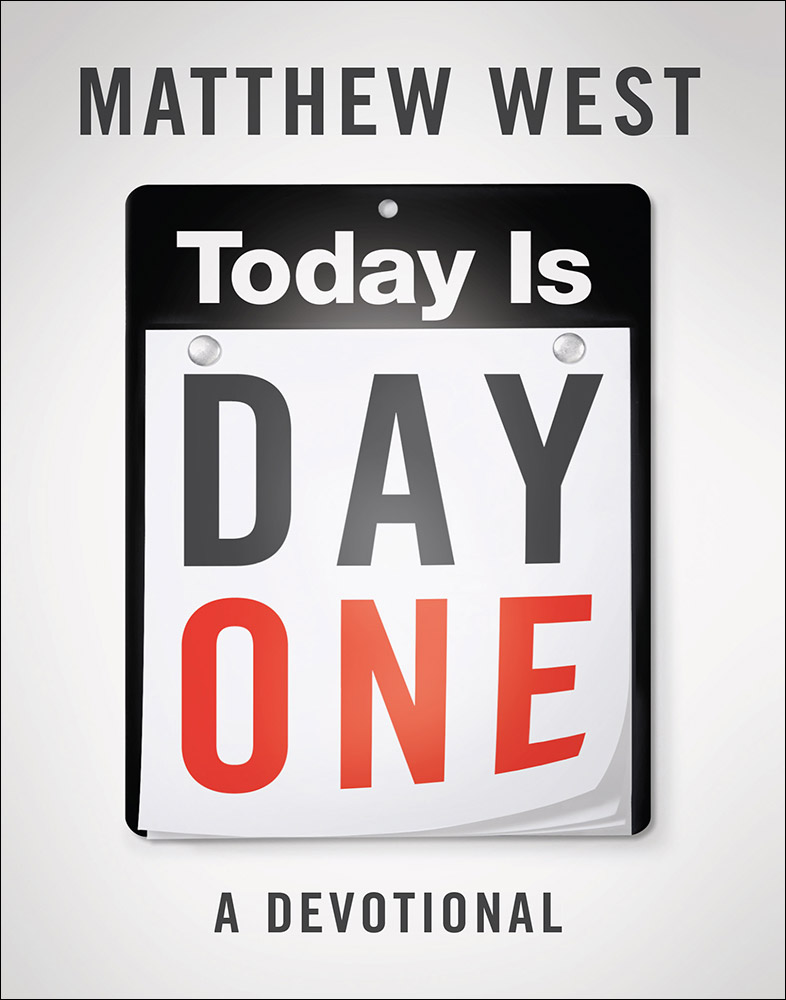
Read more in Today Is Day One by Matthew West




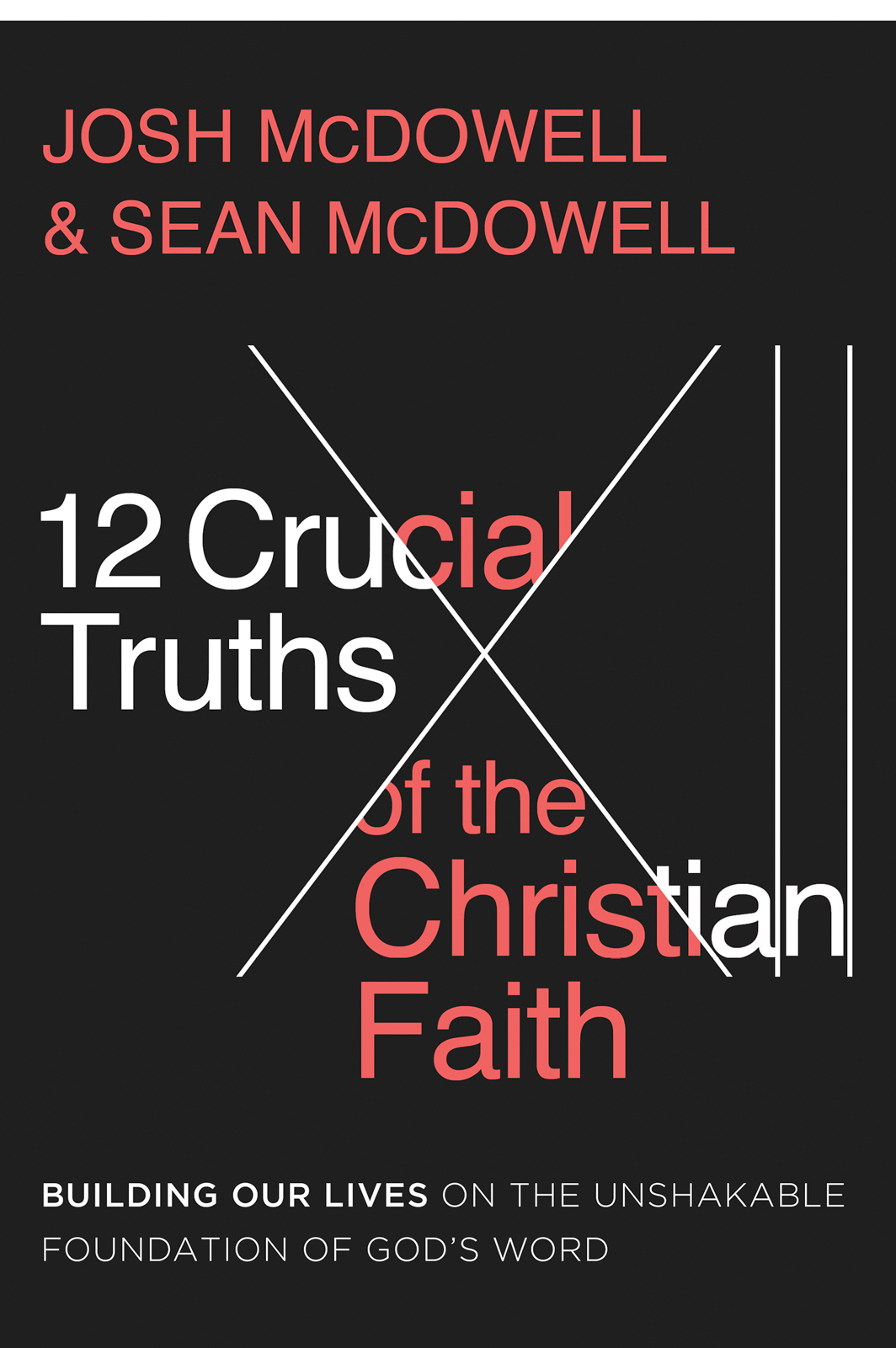
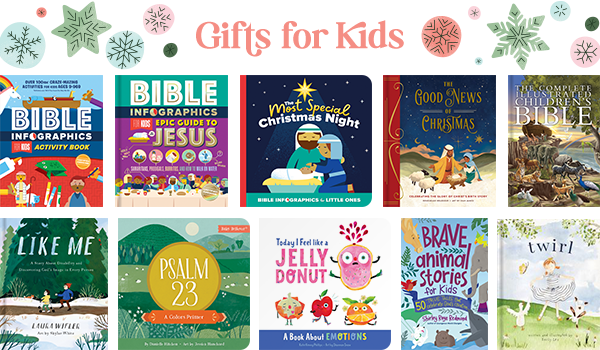

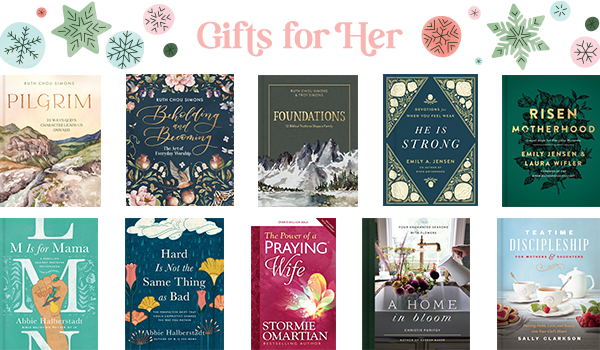


1.jpg)
1.jpg)
1.jpg)
1.jpg)
1.jpg)



.jpg)
.jpg)

.jpg)

